










The week following the murder of Charlie Kirk has been deeply disturbing for Jews around the world. Charlie was not only a political commentator, he was one of the few non-Jewish public figures who spoke with clarity, passion, and respect on behalf of Israel and the Jewish people. On college campuses, he fearlessly debated young, impressionable students who had been spoon-fed distorted narratives, calmly dismantling inaccuracies and exposing the intellectual holes in their arguments. In a media landscape increasingly hostile to Israel and Jewish values, Charlie’s voice was a rare breath of fresh air. His absence leaves a silence that feels heavier than words can describe.
What makes this moment even more painful is that we are simultaneously witnessing the unraveling of former allies. Personalities who once positioned themselves as friends of Israel and the Jewish people – Candace Owens, Tucker Carlson, General Mike Flynn, and others – have reversed course, now openly aligning with some of the most vile antisemites on social media. They no longer attempt to disguise their rhetoric as “anti-Zionism.” Instead, they peddle recycled blood libels and age-old antisemitic tropes, unapologetically poisoning public discourse. Add to that the waning support for Israel within the American political landscape – only 41% of Democrats and 63% of Republicans now express support – and it becomes clear: our external allies are shrinking. While ignorance and misinformation explain some of this hostility, we would be naïve to dismiss the undercurrent of raw antisemitism that drives so much of the venom we see today.
So where does that leave us? Surprisingly, the answer is not despair, it is hope. As we approach the Yomim Noraim, we are reminded where our true strength lies. For years, I’ve considered myself a “grey-box davener.” The parts of the machzor with bolded or boxed-in sections always seemed to trigger an extra burst of kavanah. But when you look closely at the actual text of the Rosh Hashanah davening, the message is unmistakable: our destiny does not rest in the hands of political leaders, influencers, or media outlets. It rests in Hashem’s hands alone. When we proclaim Him as Melech over the entire world, we affirm our emunah that He will ultimately “eliminate all wickedness like smoke,”
. The machzor is not simply a collection of tefillos, it is a book of hope.
This week’s parshah reinforces the same idea:
the matter is very close to you, in your mouth and in your heart.” How fitting that we read these words just days before Rosh Hashanah. It is through our words – our tefillos – and through the longing of our hearts that we can alter the course of history. As the voices of our so-called allies fade, the enduring truth is that we never relied on them in the first place. Our survival and our future depend on our relationship with Hashem.
May this be the year when our enemies are silenced, when our people stand united, and when our heartfelt tefillos bring us closer to the longawaited Geulah.
Wishing you a peaceful Shabbos and peaceful New Year!
Aaron M. Friedman
& photos, and mazal tovs to editor@baltimorejewishhome.com to
Comfort Year-Round:
Experience

Save Big on Energy Costs:
Cut your heating and cooling bills by 30-50% and make your HVAC system work smarter, not harder.
Breathe Better:
Enjoy improved air quality with reduced drafts and outdoor pollutants, creating a healthier living environment.


By: Margie Pensak
Participants of the L’Chaim Adult Day Center were treated to a special concert performed by Professor Thomas Hecht, a distinguished pianist and educator. The private by-invitation-only event – open exclusively to L’Chaim participants and their invited family members -- provided the unique opportunity to experience the artistry of a world-renowned musician.
The audience was mesmerized by Professor Hecht’s performance as his fingers danced across the keyboard with no sheet music in sight. It included “The Big Waltz” and a smaller waltz composed by Revel, and two pieces by Rachmaninoff – “Second Piano Sonata” and , to commemorate 9-11, “Elegy”. The participants also enjoyed engaging directly with the artist, asking questions such as, ‘How many hours a day do you practice?’ (Five to six hours daily, in addition to teaching at Johns Hopkins Peabody Institute!)
A native of Baltimore, Professor Thomas Hecht has spent over three decades performing on five continents. He is the former founding Head of Keyboard Studies at the Yong Siew Toh Conservatory of Music in Singapore and a former professor at both the Cleveland Institute of Music and Victoria University in New Zealand. He has performed with leading orchestras, including the New York Philharmonic and the Baltimore Symphony, and is a member of the acclaimed duo-piano team, Hecht & Shapiro, winners of the
Munich International Two Piano Competition. A respected teacher, he has mentored numerous award-winning pianists and is also a Steinway Artist, recording for several labels.
After the concert, I had the pleasure of speaking to Professor Hecht and just some of the numerous participants who enjoyed the event.
Professor Hecht, who has played piano from the age of six, remarks, “Everybody here seems to have this wonderful sense of community, and that came through. I felt them listening – and that’s really an extraordinary feeling because everyone is with you on this journey. I could really feel it, so that was very special for me. Music is an international language; it speaks to everybody. I really enjoyed it so much! It was a wonderful experience for me to be here and to get to know another tight community where so much is going on to make people’s lives happy.”
The participants enjoyed the concert just as much. Mr. Mordechai Zev Margolese shares, “It was very special. I love classical music, and Revel is one of my favorite composers. I rarely attend concerts, so this was such a super treat! The music is all full of feeling and that’s what moves you; that is why it is so special. You can see how Professor Hecht reacts to the audience, and the audience reacts to him.”
Mrs. Blanche Sachs-Cohen mentions, “It was a pleasant surprise for
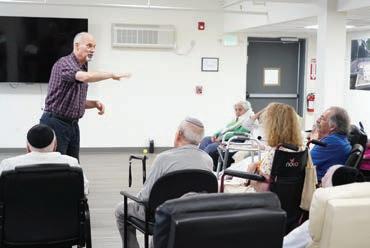
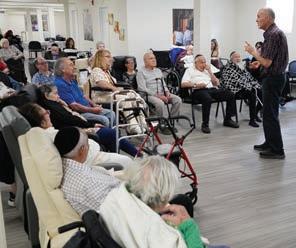


me. It was lovely. I danced the waltz as a child, growing up in Egypt.”
Mr. Daniel Hamburger, who took piano lessons as a child, was so overcome with emotion because Professor Hecht played so well. “It was overwhelming and so special!”
Ms. Lauren Ginsburg admits, “It expanded my horizons. I don’t really like classical music, but I liked this.”
Ms. Yehudis Gutnicki, L’Chaim Adult Day Center’s Activities Director, notes, “They love music, in general. You will see that people who were once into music, or are reserved, or no longer speak as much, are drawn out with music. Even if they
don’t sing, you can see how it makes them happy, as they tap their feet or sway along with the music. We have a participant who only speaks Farsi, and you can see by his reaction that music transcends language. I try to have music everyday for them because it is something I feel we need.”
Mrs. Leah Schwartz concludes “As a pianist myself and a musician, I can tell you that music touches the soul. There’s a relationship between the soul and how you feel about yourself, your emotions, your Yiddishkeit, Torah, and your environment, and it’s quite beautiful to see. This high-level concert achieved that goal. I enjoyed it tremendously, and I felt that it touched the souls of all who attended.”
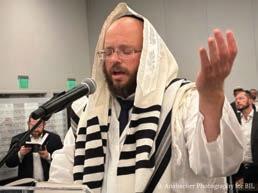
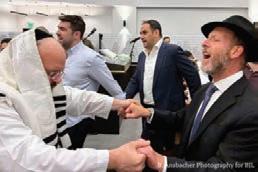

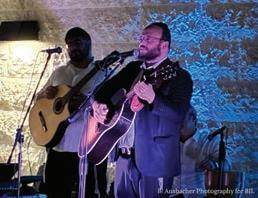

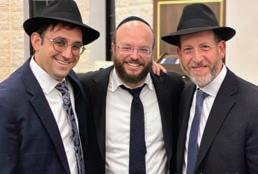
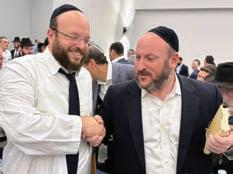



CHAP A LULAV AFTER YOU CHAP A MINYAN!

A SPECIALLY CURATED SELECTION OF HAND-PICKED ESROGIM: GROSS, CHAZON ISH, YANIVER, MORROCAN
CHOOSE WITH OR WITHOUT A PITUM
LARGE RANGE OF HADASIM INCLUDING SINGLES • COMPLETE SETS OR INDIVIDUALS
UNDER THE STRICT SUPERVISION OF THE תידרחה הדעה ץ”דב
THURSDAY, SEPT. 25 (הילדג םוצ) 1:00 PM - 4:00 PM, 6:00 PM - 11:00 PM
EREV SHABBOS, SEPT. 26 ..................................... 10:00 AM - 1:00 PM
MOTZEI SHABBOS, SEPT. 27 ................................. 9:00 PM - 11:30 PM
SUNDAY, SEPT. 28 10:00 AM - 2:30 PM, 4:30 PM - 11:00 PM
MONDAY, SEPT. 29 4:00 PM - 11:00 PM
TUESDAY, SEPT. 30 4:00 PM -
MOTZEI YOM KIPPUR, OCT. 2 ............................... 9:00 PMEREV SHABBOS, OCT. 3 .................................................9:00 AM
MOTZEI SHABBOS OCT. 4 ............................................9:00 PM
SUNDAY OCT. 5 ..............................10:00 AM - 2:30 PM , 4:00 PM
MONDAY, OCT. 6 ( תוכוס ברע ) ....................................... 8:00 AM
UNDER THE MANAGEMENT OF Rabbi Shlomo Eichenstien For questions or to place an order, call 929-539-0227
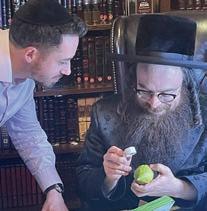
Mercaz Torah U’Tefillah
6500 Baythorne Road · Baltimore, MD


THE ZIDICHOVER REBBE WILL BE AVAILABLE TO LOOK OVER ARBA MINIM SETS AND TO ANSWER ANY SHAILOS THAT MAY ARISE


By: BJLife Newsroom
The men and women from the Bnai Jacob Shaarei Zion community gathered at the Reitberger home for a festive evening celebrating a siyum on Seder Nezikin. The program began with Mincha, followed by an elegant dinner, divrei bracha from the ruv, HaRav Daniel Rose, and an uplifting pre–
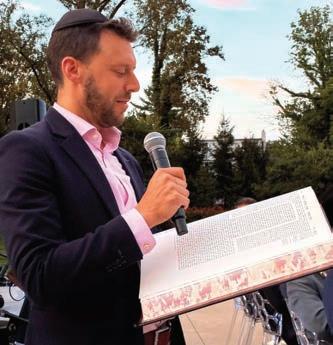
Yamim Noraim kumzitz with music by Eli Cohen and a guest appearance from Chazzan Yoni Rose.
The milestone created a warm atmosphere of inspiration, unity, and joy as the shul’s learning achievements were recognized and celebrated.
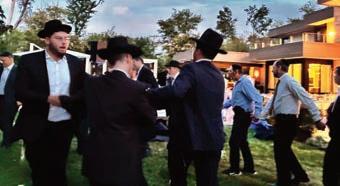
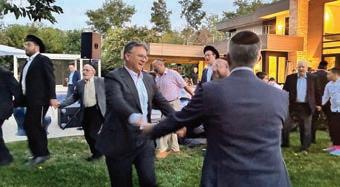
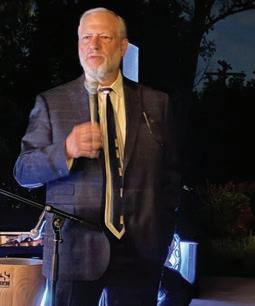
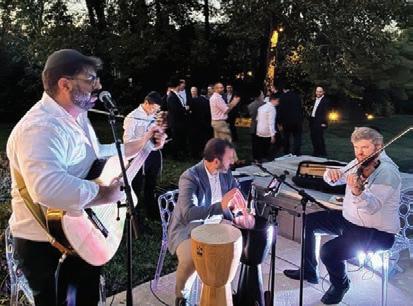
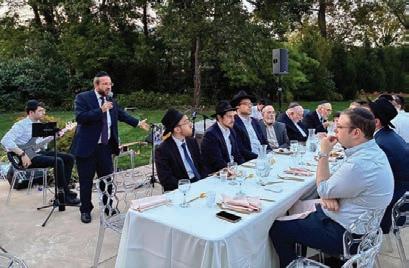
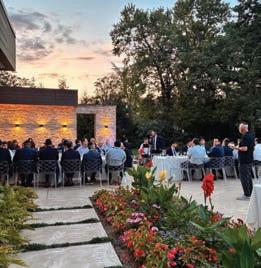
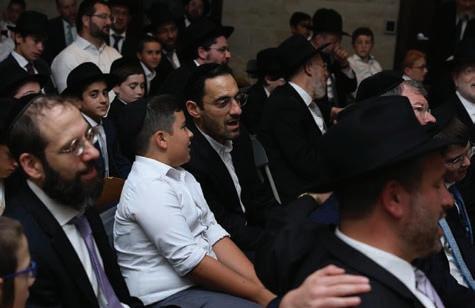
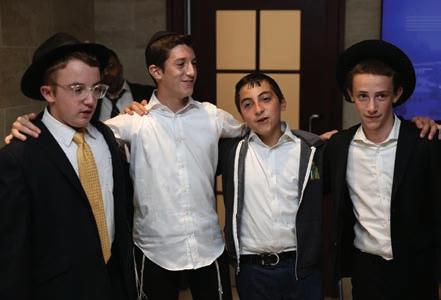
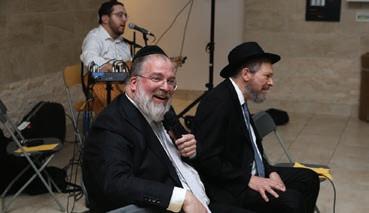
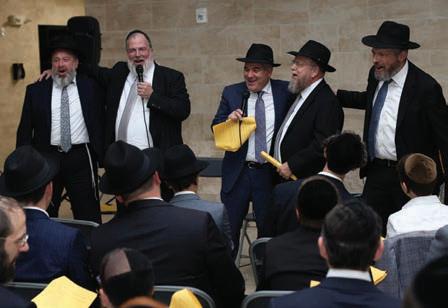
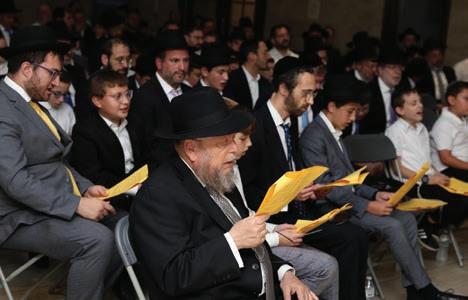
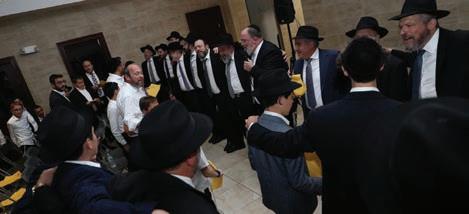
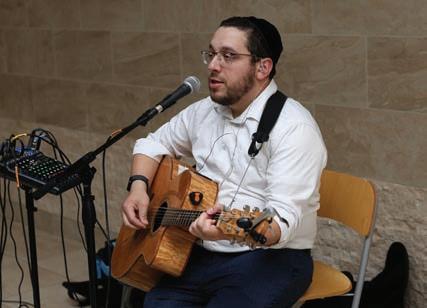
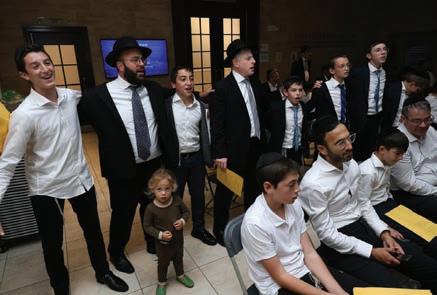
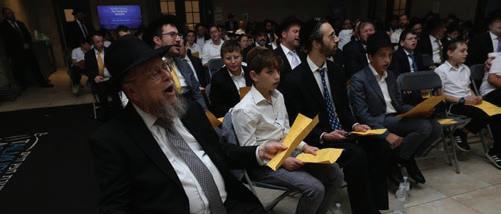

YL Waitering didn’t just win the JCNSL Championship — they plated it, garnished it, and served it up on a silver tray. With their 12–4 victory over Miracle Massage, they became the first team ever to sweep both the JCSL (Day
At the heart of the menu was World Series MVP Mayer Goldsmith, who cooked up a gem on the mound. He took a perfect game into the 6th inning, serving Miracle Massage nothing but strikeouts and frustration. His performance was so




The Lineup: A Full-Course Meal of Highlights
YL’s offense and defense weren’t just good — they were a 10-course tasting menu of brilliance:
• Yoni Levin went 3-for-4 with an RBI, then covered so much ground in the outfield it looked like he was offering free delivery.
• DY Green added a solid 2-for-3 performance, proving that consistency is the house special.
• Zack Lerner racked up three hits and made every fly ball look routine — like Turkey Salads at a Baltimore Kiddush, you just knew they were coming.
• Benzion Shamberg delivered the main course with a 2-RBI triple, the dish that broke the game wide open.
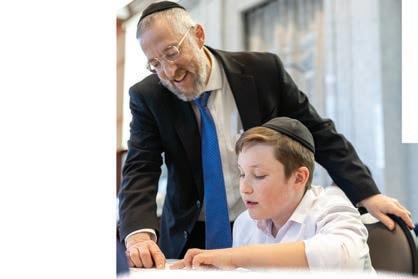
Shlomo Fantl stayed hot, serving clutch hits and steady defense. His bat is basically still sizzling.
Yoni Frager was a highlight machine at third base, plating gold-glove plays with extra flair.
• Yaakov Furman used his speed to steal runs, running the bases like a waiter late for table 12.
• Ari Elman provided defensive stability — the side dish that quietly makes the meal perfect.
• Brian Ponczak called a smart game behind the plate and added an RBI of his own. He was basically the maître d’, making sure the whole dining experience ran smoothly.
• Shmuly Abramson delivered a clutch base hit that stretched the lead — the dessert that left everyone full.
• And Avi Abramson at shortstop? Forget it. He was firing 100 MPH lasers to first, making Miracle’s hitters look like they needed a refund. Even the umpire joked about offering him a scholarship — or at least a gift card.
The Bill Comes Due
When the dust settled, YL Waitering left the field with the NIV Advisors Championship in hand and the Premier Financial Trophy proudly displayed like a Michelin star.
The 2025 season of the JCNSL by Tripping Kosher was a feast made possible by incredible sponsors, tireless officials, and the grounds crew who set the table for greatness every night.
Congratulations to YL Waitering — the team that proved once and for all: when it comes to championships, they don’t just deliver. They serve.
Ashamnu, bagadnu, gazalnu ... These words shake the Heavens — and open the gates of return. Viduy is more than a confession. It’s the key, a bridge, a gift that draws us back to Hashem.
In this powerful new book, designed for both young readers, ages 12 and up, and adults as well, Rabbi Yechiel Spero blends classic Torah sources, the wisdom of gedolim, and his trademark inspiring stories to reveal the beauty and depth of Viduy.




The JCFL by King David Nursing and Rehabilitation Center launched its 14th season. Fourteen years in, the league shows no signs of slowing down — in fact, with new players, fresh sponsors, and fields ready for action, the excitement feels as high as ever.
This year, 80 players were drafted across 8 teams, keeping the competition balanced and the rivalries fresh. The teams are proudly named for local businesses: ActualEyes, Doctor Auto, Evergreen Benefits Group, Tidy Up, Tiger Heating & Air, Tripping Kosher, Y & L Landscaping, and Yaakov Schmell–Allstate Insurance. New jerseys came courtesy of Alex the Barber — because, as Alex’s clients know, looking sharp is half the battle.
Leading into kickoff, players reviewed the updated Fired Up Rules and Regulations (with enough revisions to keep everyone on their toes), then met the 2025 Stutman Chiropractic Community Office Officiating Crew. This crew not only handled game-day officiating, but also teamed up with the Multicom Capital Grounds Crew to prep the YL Waitering fields and distribute shiny new gear from ReMax Elisheva Frenkel.
Each team will play seven regular-season games, with the top four advancing to the playoffs and ultimately competing for the TYH Roofing Bowl and the right to lift the Premier Financial Trophy
Special thanks goes to the 2025 JCFL Media Sponsor, Baltimore Jewish Life / Baltimore Jewish Home, for helping bring every big play and highlight to the community.
And with the stage set — Week 1 delivered.
Yaakov Schmell–Allstate Insurance 25, Y & L Landscaping 6
The defending champions (Schmell-Allstate) opened their season with plenty of eyes on them. Y & L Landscaping came in eager to test themselves against the champs, and things looked promising at first. QB Dan Gutman connected on a deep touchdown pass and Schmell-All-
state’s QB Avi Yudkowsky threw an interception on their opening drive.
But Schmell-Allstate showed why they’re still the team to beat. Rookie Daniel Gunzberg picked off a pass, setting up Yudkowsky’s touchdown throw to reigning Super Bowl MVP Zack Lerner. Rookie Aaron Hoffman added another score before halftime, giving Schmell-Allstate a 12–6 lead.
Lerner struck again after the break, and veteran Dany Donaty grabbed an interception to set up Avner Shotz’s touchdown. The defense, anchored by David Moinzadeh, Avi Gunzberg, and Neil Gerstman, shut things down from there, sealing a convincing 25–6 win.
Allstate may have lost some stars in the offseason, but Week 1 showed they’ve reloaded just fine.
Tiger Heating & Air 30, Doctor Auto 12
In one of the most impressive openers of the day, Tiger Heating & Air came out firing and never let up, cruising to a 30–12 win over Doctor Auto.
Quarterback Ezra Bregin was outstanding, throwing four touchdowns in the first half and running the offense with poise. Yoffi Storch was electric, scoring twice on offense and adding a pick-six that shifted momentum for good. Josh Zaslow also turned heads, pulling down highlight-reel catches — including one deep over-the-shoulder grab and another that left defenders stumbling in the open field.
The defense matched the offense’s energy. Shimon Kanter grabbed an interception and a sack while Dudi May filled multiple roles while recording two sacks and another pick. Rookie Izzy “Two First Names” Aryeh wasted no time making an impact, snaring an interception and looking like a seasoned vet. And finally, Noam Sonnenberg, who crossed oceans from Israel to suit up, flew around the field with fearless energy. His textbook double flag grabs and critical wrap-ups in open space swung momentum.
The Tigers also flashed their depth as Dovid Gelberman, Gavi Goodman,


and Chaim Baruch Lefkowitz all stepped up when called upon making smart plays, hustling in key moments, and proving that this squad is dangerous from top to bottom.
Opponents beware. Tiger Heating & Air is just heating up.
Evergreen Benefits 28, ActualEyes 26
Evergreen Benefits Group opened the season with a wild 28–26 win over ActualEyes in a classic now known as “The Yoni Game.” Yoni Guggenheim put Evergreen on the board with a 1st-drive touchdown catch, and Yoni Finkelstein followed with the 2-point conversion. Then, showing true friendship and achdus, Evergreen gave ActualEyes 20 straight points and headed into halftime down 20–8.
Halftime adjustments came in the form of one simple game plan: keep throwing to the Yonis. Evergreen’s Captain and QB Chaim Finkelstein did just that, feeding Guggenheim his second touchdown while Yoni Finkelstein dominated — catching 2 touchdowns and another 2-point conversion, including the clutch goahead score with 2 minutes remaining in the game.
ActualEyes fought back, scoring a last-minute touchdown to make it 28–26, but while attempting the game-tying 2-point try, stud pilot and cornerback Gershon Vegh shut down the receiver, swatted the pass away, and sealed the victory for Evergreen. Superstar Akiva Stutman snagged 2

interceptions for Evergreen and Guggenheim added a 3rd
When asked after the game what fueled his determination to lead Evergreen to victory, quarterback Chaim Finkelstein pointed directly to his sister, Elisheva Frenkel of ReMax Elisheva Frenkel.
“I’ll be honest,” Chaim said. “There were moments today when I thought we were done — that I just didn’t have what it would take to beat a team as strong as ActualEyes. But then I looked down at my sleeve and saw my sister’s company logo. I thought about her talent, her drive, and how I’ve basically been living in her shadow my whole life. I asked myself, ‘What would Elisheva do?’ And that thought gave me the push I needed to rally the team and finish the job.”
Yoyo Strauss was SO fast, like faster than a cheetah and even faster than a really fast car! He kept throwing the ball to the guys and they caught it. And then Yoyo even ran touchdowns himself because nobody could catch him! That’s why Tripping Kosher won by a million billion.
From Allstate showing they’re still the class of the league, to Tiger Heating & Air’s breakout performance, to Evergreen’s last-minute heroics, Week 1 had a little bit of everything. If this is how the season starts, the rest of the schedule should be a treat for fans and players alike.

The Kemp Mill Synagogue (KMS) held its 3rd Annual Musical Selichot, marking a powerful and inspiring start to the Yamim Noraim season.
Led by KMS member Dr. Elan Barenholtz, the service combined soulful melodies and heartfelt prayer, creating an atmosphere of unity, reflection, and spiritual elevation. The sanctuary was filled to capacity as men and women from the community came together for this unique and moving pre-Rosh Hashanah tradition.
The musical ensemble added depth and emotion to the evening:
• Elan Barenholtz – Lead vocals, guitar
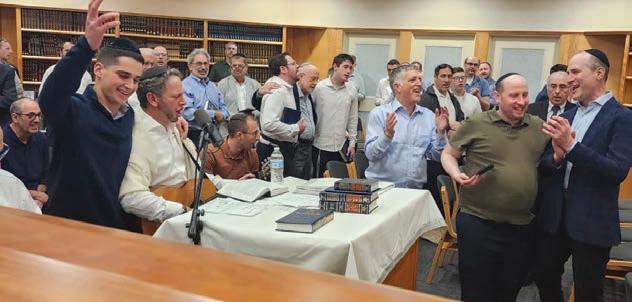
• Alan Treister – Percussion
• Jeff Kiderman – Drum box / percussion
• Yehuda Kranzler – Harmonica
The event served as a powerful reminder of the role music can play in
This past Motzaei Shabbos, Young Israel Shomrai Emunah (YISE) hosted a meaningful and uplifting evening in anticipation of Selichos and the Yamim Noraim.
The night began with a festive siyum celebrating community members who completed Maseches Horayos and Seder Nezikin — a significant achievement in Torah learning. The celebration continued with a soulful kumzitz led by YISE’s own talented musician, Jeremy Gaisin.
Attendees were inspired by divrei Torah from Rabbi Rosenbaum, helping set the tone for the reflective days ahead. A melaveh malka featuring pizza from Ben Yehuda added to the warmth and togetherness of the evening.
It was a beautiful way for the community to come together in joy, song, and inspiration as they prepared spiritually for Selichos and the Yamim Noraim.
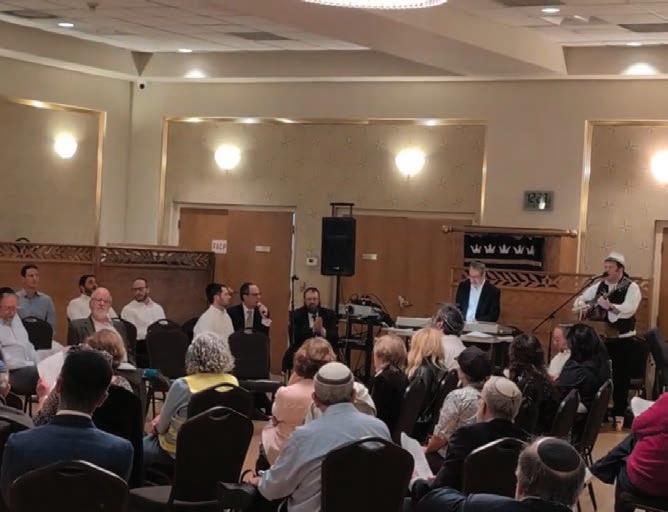
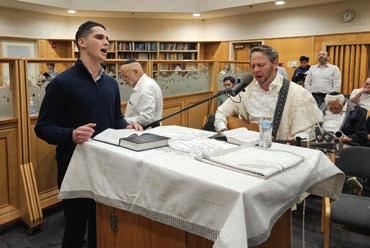
connecting us to tefillah and to one another. As the community prepares for the High Holidays, the Musical Selichot at KMS provided a meaningful and memorable spiritual gateway into the new year.
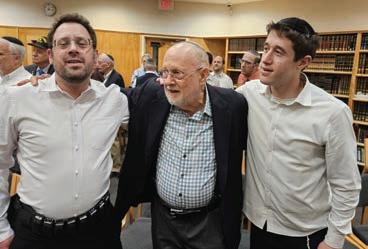
Of The Soul”
Chabad of Silver Spring recently hosted a moving pre-Yom Tov event titled “Strings of the Soul,” featuring renowned violinist Gersh Chevinsky. The evening was filled with beautifully performed, heart-stirring niggunim connected to the Yamim Noraim.
Rabbi Wolvovsky introduced each piece, offering historical background
and explaining the niggun’s significance to the tefillos of Rosh Hashanah and Yom Kippur. His words added depth and meaning to the already emotional melodies.
The event provided a powerful and spiritual atmosphere, setting the stage for a meaningful and elevated High Holiday season.
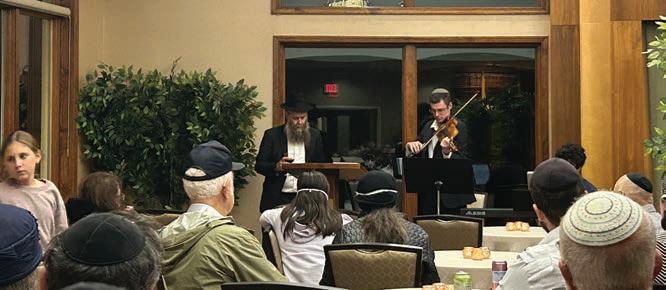
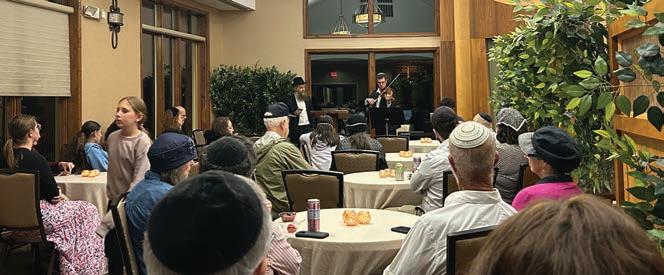






































































Ohr HaTorah held a well-attended and impactful community event focused on technology awareness. Men and women from across the Silver Spring community gathered to explore the theme of “Navigating Technology in Today’s World.”
Rabbi Frank opened the evening, setting the tone for a night of thoughtful discussion and inspiration. The program featured powerful presentations from Rabbi Aaron Lopiansky, Rosh Yeshiva of the Yeshiva of Greater Washington; Rabbi Moshe Drew, International Director of TAG (Technology Awareness Group); and Silver Spring’s own Dr. Jacob Goodman, co-founder of the Greater Washington Technology Resource Center.
Rabbi Lopiansky spoke about the essential human capacity for choice — emphasizing that we must strive not to be owned by our possessions, including
our devices. He encouraged attendees to reclaim their autonomy in a world increasingly dominated by technology.
Rabbi Drew acknowledged the difficulty of setting limits around technology but reminded the audience that “as Jews, we do hard things.”
He highlighted the importance of not making things harder for our children by allowing unfiltered devices into our homes. He pointed to growing challenges such as reduced attention spans and difficulty learning — often linked to overexposure to screens.
Rabbi Drew offered practical suggestions, including:
• Filtering devices
• Creating a technology-free room in the home
• Setting aside a few minutes each day to be entirely device-free
He emphasized that our children
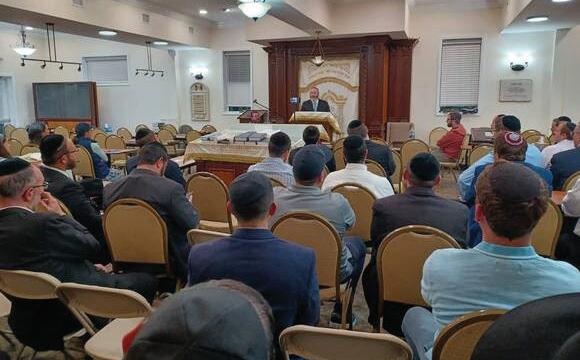
need to see that we, too, struggle — and that we’re actively working to make better choices. “No one is invincible,” he said, “and they need to hear that message from us.”
Dr. Goodman closed the event by sharing valuable local resources available through the Greater Washington Technology Resource Center. He explained that many solutions can be simple, and his team has developed creative and individualized strategies to help families implement meaningful change.
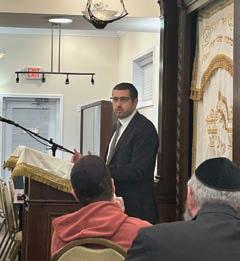
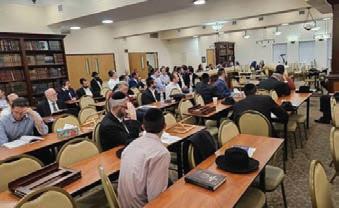
ed a communal desire to grow and improve — a perfect mindset as we approach the Yamim Noraim.
6:15 am Young Israel Shomrai Emunah M-F
6:25 am Southeast Hebrew Cong., Knesset Yehoshua M-F
6:30 am Beth Sholom Congregation M-F
Beit Halevi (Sfardi) M, T
Chabad of Silver Spring M-F
Ohev Shalom Talmud Torah OLNEY M-F
Young Israel Shomrai Emunah S YGW M, Th
6:35 am Ohr Hatorah M, Th
6:40 am YGW S, T, W, F
Magen David Sephardic Congregation M-Th
6:45 am Beit Halevi (Sfardi) S, T, W, F
Kemp Mill Synagogue M, Th
Ohr Hatorah T, W, F
Young Israel Shomrai Emunah M, Th
6:50 am Woodside Synagogue/Ahavas Torah M, Th Silver Spring Jewish Center M-F
Chabad of Upper Montgomery County M-F
6:55 am Young Israel Shomrai Emunah T, W, F
7:00 am Kemp Mill Synagogue T, W, F
Southeast Hebrew Cong., Knesset Yehoshua S Silver Spring Jewish Center S
Woodside Synagogue/Ahavas Torah T, W, F
Young Israel Ezras Israel of Potomac T, W, F
7:05 am Kesher Israel M, Th
7:15 am Kemp Mill Synagogue M, Th Kesher Israel T, W, F
Ohev Sholom Talmud Torah/The National Synagogue M-F Ohr Hatorah S
7:30 am Chabad of DC M-F
Chabad of Potomac M-F JROC M-F
Kemp Mill Synagogue T, W, F
Southeast Hebrew Cong., Knesset Yehoshua M-F
Young Israel Shomrai Emunah S Young Israel Shomrai Emunah (Sfardi) M-F
7:45 am YGW (Yeshiva Session Only) S-F
8:00 am Beth Sholom Congregation S
Kemp Mill Synagogue S
Kesher Israel S
Ohev Shalom Talmud Torah OLNEY S
Southeast Hebrew Cong., Knesset Yehoshua S
Chabad of Upper Montgomery County S Woodside Synagogue/Ahavas Torah S
8:00 am YGW (High School; School-Contingent) S-F
Young Israel Ezras Israel of Potomac S Young Israel Shomrai Emunah (Sfardi) S
8:05 am Ezras Israel Congregation of Rockville M, Th
8:15 am Ohr Hatorah S Ezras Israel Congregation of Rockville S, T, W, F
Kehilat Pardes / Berman Hebrew Academy S-F Silver Spring Jewish Center M-F
8:30 am Chabad of DC S Chabad of Potomac S JROC S Ohev Sholom Talmud Torah/The National Synagogue S Silver Spring Jewish Center S YGW (Summer Only) S-F
8:45 am Young Israel Shomrai Emunah S-F
9:00 am Chabad of Silver Spring S Kemp Mill Synagogue S
mincha
2:15 pm Silver Spring Jewish Center S-F
2:20 pm YGW M, T, W
2:45 pm YGW M-Th
3:00 pm YGW Middle School School Days
Before Shkiah (15-18 minutes), S-TH
Beit Halevi (Sfardi)
Beth Sholom Congregation
Chabad of Potomac
Chabad of Silver Spring
Chabad of Upper Montgomery County
Ezras Israel Congregation of Rockville (20 min before, S-F) JROC
Kemp Mill Synagogue
Kesher Israel
Magen David Sephardic Congregation
Ohev Sholom Talmud Torah/The National Synagogue Ohr Hatorah
Silver Spring Jewish Center
Southeast Hebrew Congregation
Woodside Synagogue/Ahavas Torah
Young Israel Ezras Israel of Potomac
Young Israel Shomrai Emunah (Asheknaz)
Young Israel Shomrai Emunah (Sefarhadi) maariv
8:15 pm OSTT (OLNEY) S-Th
8:45 pm YGW School Days
9:30
Wishing for a year of peace, endless opportunities, blessings & growth

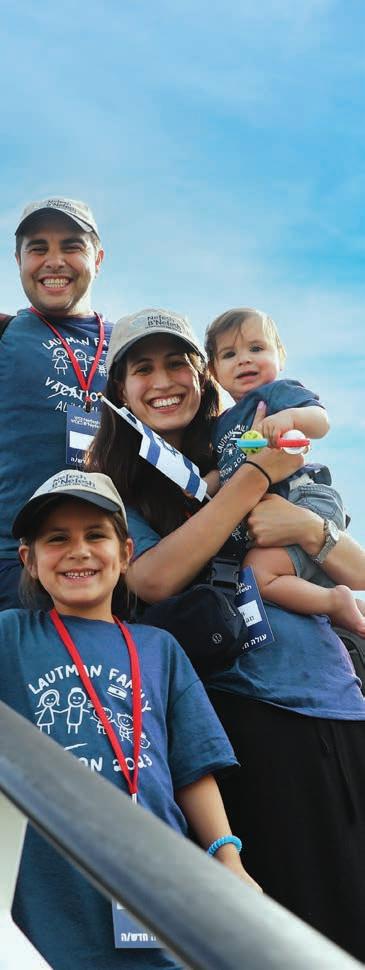
ALIYAH INTEGRATION NATIONAL SERVICE NATIONAL DEVELOPMENT ZIONIST EDUCATION
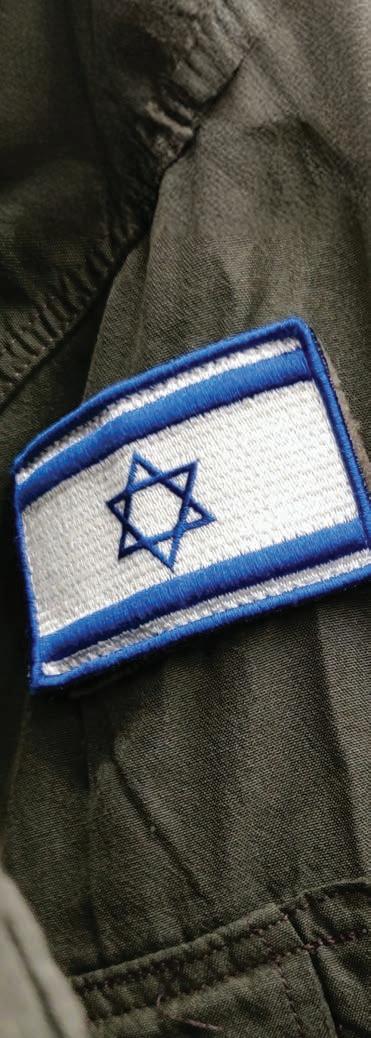

Building a stronger Israel for today and tomorrow
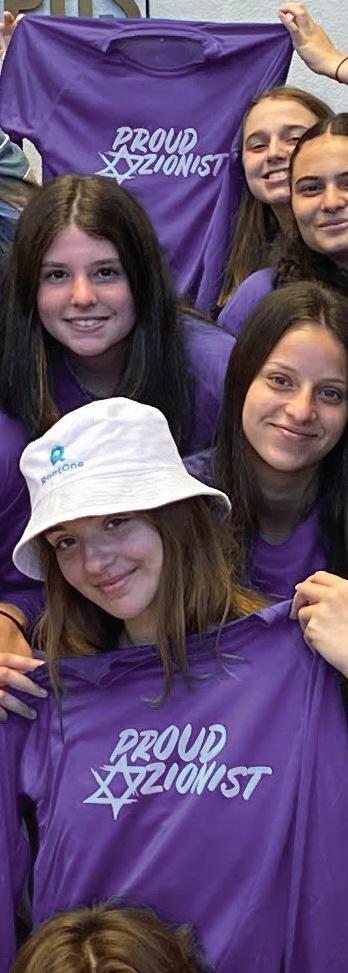
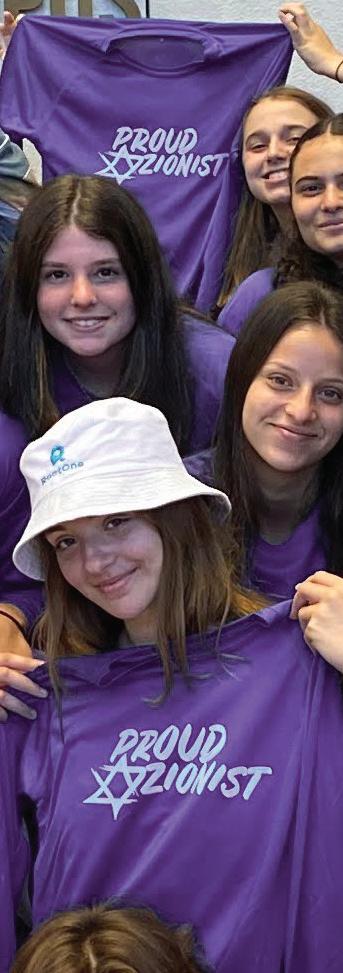
After anti-Israel protesters tore down road barriers and fought with police, disturbing the final round of the Spanish Vuelta cycling race in Madrid, Spanish Prime Minister Pedro Sánchez praised the protesters and attacked Israel, declaring to his fellow Socialist Party members that the Jewish state shouldn’t be allowed to participate in international sporting events.
“The sports organizations should consider whether it’s ethical for Israel to keep participating in international competitions. Why expel Russia after the invasion of Ukraine and not expel Israel after the invasion of Gaza?” San-
chez said. “Until the barbarity ends, neither Russia nor Israel should be in any international competition.”

The protest, which involved over 100,000 rioters, cut short the race on Sunday and led to two arrests and 22 light injuries. During the chaos, the Israeli team continued playing, but they took off the team name from their uniforms.
In response, Israeli Foreign Minister Gideon Saar branded Sánchez an antisemite.
“An antisemite and a liar,” Saar said in a post on X. “Did Israel invade Gaza on Oct. 7th or did the Hamas terror state invade Israel and commit the worst massacre against the Jews since the Holocaust?”
Sánchez was also condemned by José
Luis Martínez-Almeida, the conservative mayor of Madrid, who said Sunday was a sad day for the city.
“It’s a pity that such a moment of eternity was taken from us,” said Jona Vingegaard, a Danish rider who was deemed the race’s winner, though the customary podium ceremony was called off. “Everyone has the right to protest, but not in a way that influences or endangers our race.”
Danish Prime Minister Mette Frederiksen also criticized the rioters for “spoiling” the game and Sánchez for “praising” the demonstrations.
“Instead, I want to praise the athletes and everyone who doesn’t spoil things for others,” Frederiksen posted.
Javier Guillén, the director of the Vuelta, also spoke out in favor of Israel staying in the competition.
“The Vuelta’s position was clear. We had to abide to the norms of the International Cycling Union. It’s the UCI that regulates the right of admission to the race,” Guillén said. “We never got into any other type of debate. All we wanted to do was to be able to finish the race with normalcy, and that wasn’t possible.”
The UCI expressed its disapproval of the protests and any “exploitation of sport for political purposes in general, and especially coming from a government.”
“We also regret the fact that the Spanish Prime Minister and his government have supported actions that could hinder the smooth running of a sporting competition and, in some cases, expressed their admiration for the demonstrators,” the UCI said. “This position is contradictory to the Olympic values of unity, mutual respect, and peace. It also calls into question Spain’s ability to host major international sporting events, ensuring that they take place in safe conditions and in accordance with the principles of the Olympic Charter.”
In March 2023, Russian-Israeli Princeton University student Elizabeth Tsurkov was abducted by the pro-Iran



Iraqi militia Kataeb Hezbollah while conducting research in Iraq. She had entered the country with her Russian passport. Last Wednesday, two and a half years later, was freed.
Images and videos show Tsurkov, 38, smiling in Israel’s Sheba Medical Center, and struggling to walk as she was reunited with her family Wednesday night.
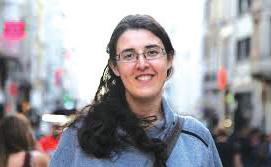
According to the Prime Minister’s Office, Tsurkov told Prime Minister Benjamin Netanyahu about the “harsh conditions” she was kept in. Shortly before her abduction, she had a spinal operation. Now, she suffers from severe back pain, which was worsened by her captivity.
Tsurkov expressed her gratitude for Netanyahu’s efforts to bring her home. While in captivity, she was able to listen to a radio. As such, she knew about
the October 7 massacre.
Kataeb Hezbollah, a militia funded by Iran, kidnapped her, falsely claiming that she was an Israeli spy. The terror group only provided proof she was alive once — in November 2023.
According to reports, the U.S. and Qatar played an important part in negotiating her return. On Tuesday, she was freed to the U.S. embassy in Baghdad. In exchange for Tsurkov’s release, the son of a senior militia figure was reportedly freed.
Writing about her release, President Trump said that Tsurkov had been freed after “being tortured for many months.”
Last week, a gas truck explosion that generated a “shock wave” in Mexico City killed at least thirteen people and left 90 injured, many with second- and thirddegree burns.
Flames shot into the air as people screamed and ran from the scene. Large plumes of smoke billowed from the truck
as emergency workers tried to extinguish the blaze.
The explosion generated a “shock wave” that damaged 32 nearby vehicles, the Mexico City Prosecutor’s Office said late on Wednesday.
According to authorities, the explosion occurred after the vehicle carrying 49,500 liters of gas – known in Mexico as “pipas” – overturned at a highway in the Puente de la Concordia area.

An investigation was underway “to establish accountability and ensure comprehensive care for the victims and their families,” the prosecutor’s office said.
“Forensic experts … are working at the scene to gather initial evidence and determine the cause of the incident,” it added.
It’s possible that the driver of the truck was driving too fast and hit an ob
ject that punctured the tank.
Among those who died was Alicia Matias, 49, whom the Mexican press had dubbed “the hero grandma” because she protected her two-year-old granddaughter with her body during the explosion. Matias was covered with burns on 90 percent of her body and was walking around with her young granddaughter, seeking help for her. Matias later died of her injuries.
“Her act of love has left a profound mark,” Mexico City Mayor Clara Brugada wrote Saturday on X.
As part of a deal between Belarusian President Alexander Lukashenko and U.S. President Donald Trump, Belarus released 52 political prisoners who had been incarcerated in prisons in the country. Many of those were trade union leaders, journalists and activists, although more than 1,000 political prisoners remain in jail.


relieve some sanctions on Belarusian airline Belavia, allowing it to buy parts for its airlines.
The prisoner release came on the eve of joint military exercises involving Belarus and close ally Russia, and after what neighboring Poland called an unprecedented Russian drone incursion into its airspace.
Poland closed its borders with Belarus last week because of the Zapad-2025 drills, which last until Tuesday. Latvia closed part of its airspace.
Russia’s foreign ministry condemned Poland’s leadership for its “confrontational steps” in closing the border. Meanwhile the EU’s foreign policy chief, Kaja Kallas, warned that “Putin is mocking the efforts” by the West to deal with him.
Lukashenko, 71, has said that the release of the prisoners was a humanitarian gesture. The leader who has been at the helm of Belarus since 1994 has quashed opposition since taking power. He met with Trump special envoy John Coale in the capital Minsk on Thursday. The two men discussed how they could re-establish a trade relationship, including reopening the U.S. embassy in Minsk.
The U.S. closed its embassy in the capital in February 2022 after Russia’s Vladimir Putin used Belarusian territory to launch his full-scale invasion of Ukraine.
Belarus is eager to build an economic relationship with the U.S. having been hit with a raft of Western sanctions because of its connection to Russia’s war in Ukraine. Belarus’s national airline was sanctioned after Belarusian flight controllers ordered a Ryanair jet traveling from Greece to Lithuania to land in Minsk in 2021, and police then arrested journalist Roman Protasevich.
Many of Belarus’s political prisoners have been in jail since Lukashenko brutally stamped out protests in Belarus in 2020, after he claimed victory in presidential elections widely condemned as rigged.
“The Americans are taking a very constructive stance on the so-called political prisoners. We do not need political prisoners or any other prisoners,” Lukashenko was quoted as saying by state news agency Belta.
The 52 prisoners pardoned on Thursday join 314 others released since July
2023 in an attempt to soften Belarus’s relationship with the EU and the U.S., according to Human Rights Watch. Another 14 prisoners were pardoned and released in June during the visit of a U.S. special envoy, including Sergei Tikhanovsky, the husband of exiled Belarus opposition leader Svetlana Tikhanovskaya. Thirteen others were released and forced into exile.
Among the 52 freed were 69-year-old philosopher Vladimir Matskevich, journalist Igor Losik and senior opposition figure Mikola Statkevich, who was a presidential candidate in 2010.
According to a recent investigation, Russia is running an extensive network of more than 200 camps to re-educate, Russify and militarize Ukrainian children.
The facilities are located in Russia and in occupied Ukraine. They include
camps as well as schools, military bases, medical facilities, religious sites and universities.
Ukrainian children are being taken to the sites and are forced to endure patriotic indoctrination, combat drills, paratrooper training and classes on how to assemble drones for the Russian armed forces.
The investigation and report was compiled by the Humanitarian Research Lab at Yale School of Public Health and was titled “Ukraine’s Stolen Children: Inside Russia’s Network of Re-Education and Militarization.” It found that at least 130 of the camps have been involved in re-education, including efforts to indoctrinate children with pro-Russia narratives.
According to the report, at least 39 of the facilities operate militarization programs where children as young as eight are put through weapons training, grenade-throwing competitions and tactical medicine courses.
The findings follow a Guardian report last week in which children from occupied regions of Ukraine described being forcibly taken to such military-style

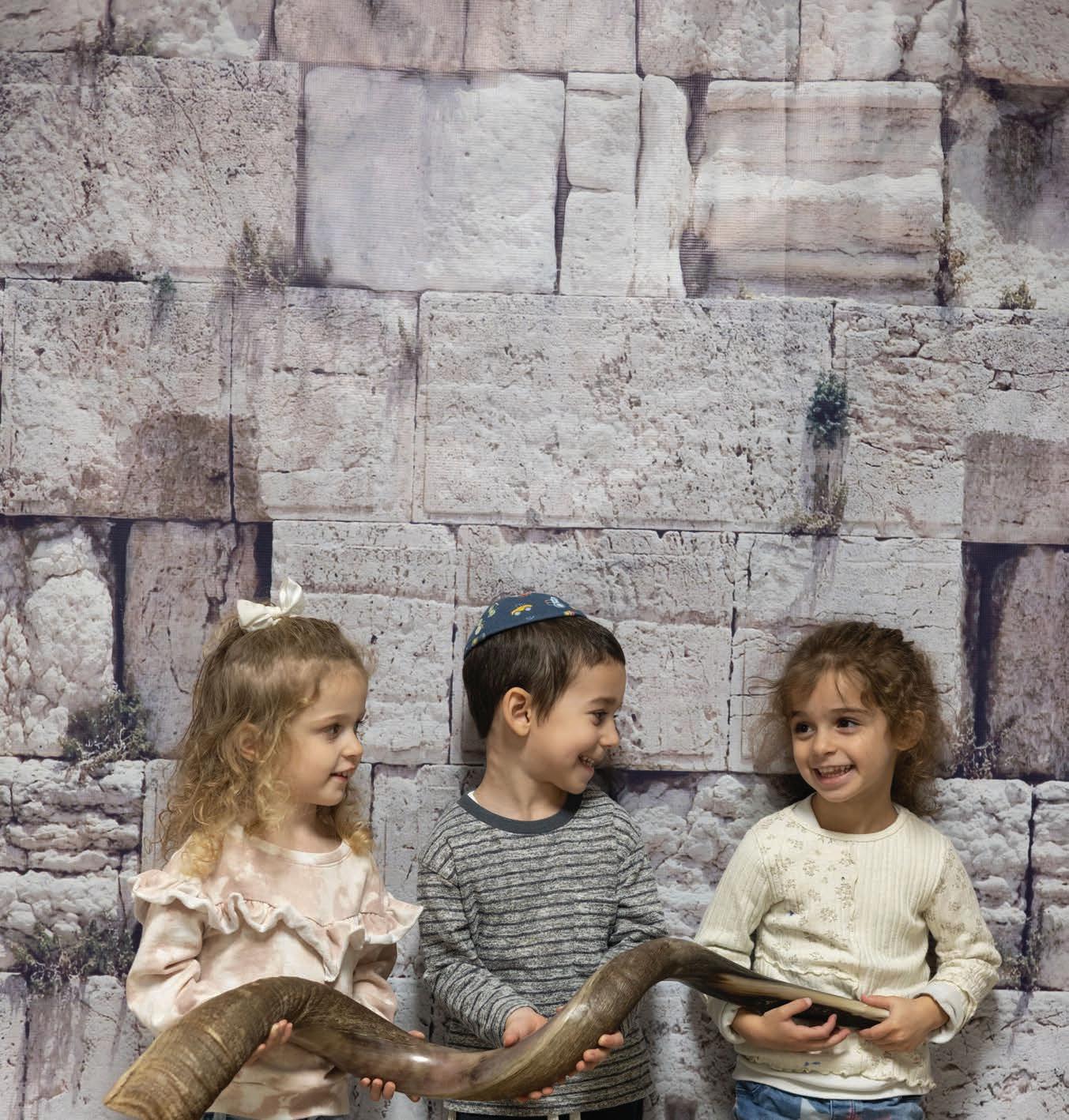
As we usher in Rosh Hashanah and welcome the year 5786, we find ourselves at a pivotal moment. This past year has been challenging, marked by continued attacks in Israel, rising antisemitism, a growing mental health crisis and financial uncertainty.
Rosh Hashanah is not only a time for reflection; it is a call to action.
Now is the time to stand strong together. Support our community by visiting associated.org/give. Your contribution today will shape the Jewish future we all need.
Together, we can combat hate, care for every member of our community and turn sorrow into Jewish joy.
L’Shanah Tovah! May you and your loved ones be inscribed in the Book of Life.

camps and groomed to be ready to fight for Russia.
“What we have here is an unprecedented network of facilities, expressly built and expanded since 2014, to turn Ukrainian children into Russians,” said Nathaniel Raymond, director of the Humanitarian Research Lab. “It is a pipeline for Ukraine’s children to be re-educated – brainwashed – and turned into soldiers.”
At least two of the camps are under construction, as Moscow prepares to bring in more children to these sites.
In 2023, the international criminal court launched an investigation into President Vladimir Putin and children’s rights commissioner Maria LvovaBelova over the alleged abduction and deportation of Ukrainian children. Russia denies any wrongdoing, claiming that children have only been relocated for their safety and insisting that none have been forcibly taken.
Andriy Yermak, head of the office of the president of Ukraine, said the Yale report “provides irrefutable evidence contradicting Russian denials and misinformation” and that it “demands action.”
Last Friday, a Palestinian hotel employee stabbed two people at a hotel, injuring them in a terrorist attack hailed by Hamas as “heroic.”
The terrorist, a man from Shuafat in East Jerusalem, reportedly grabbed a knife from the kitchen of the hotel he worked in, yelled, “Allahu akbar,” and stabbed a 50-year-old man and a 23-yearold man, inflicting serious and moderate injuries respectively. According to witnesses, the terrorist yelled that he wanted to die. He was then stopped and detained by an off-duty officer, a cousin of one of the victims, who had been staying at the hotel for a family event.
“I overpowered the terrorist with my hands rather than gunfire to reduce the danger to the civilians at the scene. With the help of other brave civilians, I laid him on the floor and restrained him,” the
officer said, crediting civilians David and Itzik Razani for their help in stopping the terrorist. The Razanis said, “We tied him up with the belts of our pants.”
According to the police, the assailant has a history of security offenses.
The hotel is located in Kibbutz Tzuba, which is near Jerusalem.
Police detained three other individuals suspected of involvement in the attack. Though Hamas praised the attack, it did not claim responsibility.
Initially, Magen David Adom found the 23-year-old victim in the hotel parking lot. Later, they found the 50-year-old in the hotel’s dining room. The two men were being treated in Hadassah Medical Center in Ein Kerem. According to the hospital, both men were conscious.

Since October 7, 2023 — when war broke out in the wake of the Hamas-led massacre — the Defense Ministry’s Rehabilitation Department has treated around 20,000 soldiers, the department announced on Sunday. Fifty-six percent of those wounded are suffering from mental health conditions, including post-traumatic stress disorder.

Around 45% have physical wounds, 35% have PTSD and mental health conditions, and 20% are suffering from physical and mental health conditions. Around 9% sustained moderate-to-severe injuries. Those injured include 99 amputees with prosthetics and 16 paralyzed individuals.
Around 64% of the wounded soldiers are reservists.
The rehab department treats some 1,000 soldiers injured in the ongoing Gaza war a month. The department received around 600 requests from soldiers who fought in past wars. In all — counting all wars — the rehab department is treating 81,700 veterans, 31,000 (38%) of whom have been struggling with mental health conditions. By 2028, the department expects to treat around
100,000, around 50% of whom will likely have mental health conditions, including PTSD.
The rehab department has a NIS 8.3 billion ($2.5 billion) budget, around half of which is used for treating mental health conditions.
“In the coming years, alongside the national challenges of the increase in the number of wounded, the continuation of the war, the treatment of those dealing with mental health conditions, the concern about suicide, and the shortage of therapists, there are challenges that require immediate response,” officials said. That includes “a shortage of staff, with a ratio of 1:750 patients per rehabilitation worker; the need to simplify bureaucracy; and new and unique needs required for the newly wounded.”
Recently, Defense Minister Israel Katz and Finance Minister Beztalel Smotrich unveiled a public committee led by Prof. Shlomo Mor-Yosef, the Leumit Health Services chairman. The committee’s goal is to recommend ways to boost treatment and rehabilitation for injured soldiers.
Since October 7, 904 soldiers have been killed in combat, including 329 during the massacre, 460 during the IDF’s ground campaign, 29 from Hezbollah attacks in Israel, and 51 during the IDF’s ground offensive in Lebanon. Seventeen were killed in Israel, including five murdered during counter-terrorism operations in Judea and Samaria. A drone attack from Iraq killed two soldiers, and an Iranian ballistic missile attack killed one soldier. Some of the casualties came as a result of friendly fire.
Channel 13 news released a report on Sunday, publishing quotes from top-secret meetings with ministers and security officials held before and during Israel’s 12-day war with Iran.
The first meeting took place in secret at a Jerusalem Hills bunker on June 12. At the beginning of the meeting, Prime Minister Benjamin Netanyahu said: “We are at a historic moment with a crucial decision. If we don’t stop [them], within a few years, they will get tens of thousands of kilograms of [nuclear] explosives. Iran has already enriched fissile material at a level that is enough for eight to nine bombs, and they are working



weaponization. If we don’t act, we simply won’t be here. We will deal a big blow to the command and control, hit senior scientists and other components. May [G-d] help us.
“They are getting close to being the second-biggest powerhouse on ballistic missiles. After we destroy some of their sites and scientists, negotiations for a deal will be held in a different reality. We have held marathon discussions over many months,” he added.
During the meeting, a senior military official declared that they hoped the operation would lead to Iran being unable to go nuclear for a while and “improve Israel’s strategic balance.”
Among the stated goals of the operation was the destruction of the Natanz nuclear facility, the elimination of those responsible for the nuclear program, and the targeting of sites where Iran converts enriched uranium into the bomb’s metal core. An official declared, “Fordo will be destroyed only if the U.S. attacks it.”
Only the U.S. had the powerful bunker buster bombs capable of destroying the Fordo nuclear site, which was buried deep beneath a mountain. The official added that Iran would still have enriched
material by the operation’s end and be capable of hitting Israel with hundreds of rockets. The official predicted that Iran would hit several dozen targets in Israel with large warheads and many more targets with light warheads.
“The operational achievements won’t suffice and will have to be completed through diplomacy,” the official added.
During the meeting, Ronen Bar, the chief of the Shin Bet, noted that Israel was coming up with a plan to address potential Arab-Israeli unrest during the operation. By the end of the meeting, the operation was unanimously agreed upon. It began on Friday, June 13, at 3 a.m. with a number of surprise strikes targeting Iranian air defenses, nuclear scientists, and military leaders. Hours later, Iran responded with a large barrage of missiles.
The day of the strike, the ministers and security officials met again and discussed potential U.S. involvement. The ministers wanted the U.S. to attack Fordo and provide Israel with refueling aircraft.
Ron Dermer, the minister of strategic affairs, said during the meeting that Netanyahu had “pushed and maneuvered” U.S. President Donald Trump to decide on providing Israel with the refueling



planes, which would enable Israeli jets to maintain their attacks on distant targets.
Dermer added that he believed Trump was likely to approve a U.S. strike on Fordo, “but [with] the right timing.”
Defense Minister Israel Katz said that he explained “the importance of striking Fordo” to U.S. Defense Secretary Pete Hegseth. Katz also said that Hegseth told him that the refueling planes transfers were in progress. Days later, the planes arrived in Israel.
Eyal Zamir, the IDF Chief of Staff, noted the opening strikes’ “extraordinary achievements.”
“Everything can be done very fast. If the U.S. cooperates with us, we can make the hit within 48 hours. Iran is shaken by the strikes,” Zamir said, noting that Iran had been firing fewer rockets than anticipated.
During the meeting, Finance Minister Bezalel Smotrich stressed the importance of finding Iranian Supreme Leader Ali Khamenei, apparently in reference to assassination plans that didn’t end up panning out.
On Saturday, during a small security cabinet meeting, Netanyahu said striking Fordo and “creating a huge balance of terror” with Iran was the “main thing.”

proxies. Hezbollah still won’t jump onto the bandwagon and therefore, [Iran] has an interest in exhibiting strength,” Katz responded, stressing that the war wouldn’t be done by Friday. “Khamenei is a stubborn fanatic. If they surrender, he will lose his life’s work. I support ending this only if we deal with Fordo and a few other things. But it’s not up to us, so we have to deal with things as they are. We’ll destroy dozens of buildings after evacuating civilians if Iran continues to target our civilians. There are military targets in Tehran amid the population. If people escape Tehran, that’s a victory.” Katz said that Israel would have to target civilian infrastructure if Iran targets Israeli infrastructure.
Then, Zamir said that the IDF was “preparing to deepen the attack throughout the week with a strike on Natanz, an attack in Fordo, and attacks in Tehran.”
“It’s hard to grasp the size of our success in Iran. More than 120 rocket launchers have been destroyed, and at least 80 are not functioning,” he added.
During a meeting on Monday, defense officials suggested ending the war, an idea that Netanyahu dismissed.

Among Israel’s top priorities, Netanyahu noted, was to set ablaze Tehran fuel depots, target the successors of neutralized officials, and assassinate Khamenei. Civilians should also evacuate from Iranian neighborhoods and districts, and the Islamic regime should be destabilized,
A strike on Fordo would have two benefits, Netanyahu noted. First, it would destroy Iran’s nuclear program. Second, “if Khamenei reacts to an American strike, it could be the end of the regime.”
“Fordo gets the war ended quickly. If Iran continues to attack us, Trump will still want to wrap this up anyway,” the
During the meetings, the ministers weighed the merits of striking civilian infrastructure in Iran, such as oil refineries.
“Relocating the population is practical and symbolic. We should strike civilian national infrastructure that destabi-
But Dermer argued, noting, “If we attack civilian infrastructure now, it could end the war before we achieve our objectives and before an attack on Fordo. Khamenei is confused but determined and a religious fanatic. He, like Nasrallah,
“They’re working hard to reenlist the
“Stop talking about ending the war,” Netanyahu said. “There will be no such thing. We haven’t finished, and it has to stop. It will go on for as long as we need to achieve our objectives. We’re on the brink of victory. You say that we’ve run out of targets, what message are we sending our enemies? So the IDF spokesman says we need to finish it? There’s a policy. Work accordingly. We continue until we’ve achieved our goals. The public here is very strong.”
In the end, the war lasted for 12 days, shortly after the U.S. bombed Iranian nuclear sites. Thirty-one individuals were killed and more than 3,000 were injured in Israel.
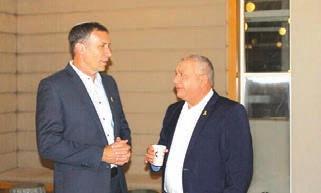













established a new political party called “Yashar! With Eisenkot.”
Eisenkot quit Benny Gantz’s National Unity party in June. He says that his new party “will work for repair, healing, and hope for Israeli society.”
According to Matan Kahana, a member of the party, the name “Yashar” was primarily a reference to comments made by freed Hamas hostage Eli Sharabi, who said in an interview earlier this year that releasing the other captives was “not about right or left [wing], but straight (Yashar).”
The party was co-founded alongside 120 members from Israel’s tech, political, and military leadership, including former Religious Affairs Minister Kahana, who resigned from Gantz’s National Unity party shortly after Eisenkot’s departure.
Following Eisenkot’s and Kahana’s resignations, the party changed its name from National Unity to Blue and White-National Unity.
Other members of the new party include former director general of the Prime Minister’s Office Yoav Horowitz; retired major general Tal Rousso; Wix president Nir Zohar; and Shir Siegel, daughter of former hostages Aviva and Keith Siegel and an activist and advocate for the hostages.
“The establishment of Yashar! With Eisenkot, it is both a personal and national imperative,” said Eisenkot in a statement. “The party will place Israel’s security and national interests above all other considerations, establish a broad governing alternative, and serve as a foundation for further unity, all to ensure the State of Israel’s existence as Jewish, democratic, and strong, in the spirit of the Declaration of Independence.”
He added, “The citizens of Israel deserve leadership that serves the public with integrity and with a deep commitment to our shared future, to Israel’s prosperity as a model society in the eyes of its citizens and of the world.”
Since leaving Blue and White, Eisenkot has stated that while he and Gantz had worked together for many years and continue to respect each other, their differences eventually drove them apart politically. He has since been sharply critical of his former running mate, urging him to step down and pave the way for an alternative slate, as the party is now hovering around the electoral threshold.
He has also become an outspoken critic of the government’s approach to the war.
Eisenkot’s son, Gal, was killed while
serving in the IDF in Gaza in December 2023, while Eisenkot was a member of a since-dissolved emergency war cabinet formed in the wake of the Hamas-led October 7, 2023, massacre and launch of the Gaza war.
Since resigning from the Knesset, he has said that Netanyahu’s government “is not worthy” of his son, of other soldiers and of hostages who have lost their lives in the nearly two-year war, due to “cowardice, because of political indecision, because of the political and ideological considerations of people who want to resettle the Gaza Strip.”
The state terrorism charges against Luigi Mangione, the man accused of murdering UnitedHealthcare CEO Brian Thompson, were dismissed this week when he appeared in court for a pre-trial hearing in New York City.
Mangione, 27, faces both state and federal charges in the killing of Thompson, a husband and father of two, last December outside a Manhattan hotel. The 11 state charges included murder and terrorism, and the federal ones carry the possibility of the death penalty
His lawyers have been fighting to get the state charges thrown out entirely, arguing the parallel cases amount to double jeopardy. In his written decision on Tuesday, Judge Gregory Carro ruled against their request.
The defense had also asked for the two terrorism charges to be dropped, arguing they don’t apply. Prosecutors, however, alleged Mangione’s intent was to “violently broadcast a social and political message to the public at large.”
The judge ruled to dismiss both terrorism charges – murder in the first degree in furtherance of an act of terrorism and murder in the second degree as a crime of terrorism – writing they were “legally insufficient.”
“There was no evidence presented of a desire to terrorize the public, inspire widespread fear, engage in a broader campaign of violence, or to




organized terrorist groups,” Carro wrote. “Here, the crime – the heinous, but targeted and discrete killing of one person – is very different from the examples of terrorism set forth in the statute.”
Mangione will still face second-degree murder and eight weapons-related charges in the state case. If convicted of the top count, it carries a sentence of 25 years to life.
Mangione has pleaded not guilty.
“We respect the Court’s decision and will proceed on the remaining nine counts, including Murder in the Second Degree,” the Manhattan District Attorney’s office said in a statement after the ruling.
The defense also wants to suppress evidence from Mangione’s backpack, including a gun and notebook, claiming it was obtained without a search warrant.
Prosecutors deny those allegations.
Following two days of trade talks, the U.S. and China agreed on an outline for a TikTok deal. According to Treasury Secretary Scott Bessent, the deal will be confirmed after President Donald Trump and Chinese leader Xi Jinping’s call on Friday.
China has, until now, resisted negotiating on the issue of TikTok, a video-sharing app that Trump saved in January from a U.S. ban, as the U.S. president prefers instead to get a deal in which ByteDance, the parent company of TikTok, would sell the app to U.S. investors. However, Beijing has recently made concessions in hopes of securing a state visit from Trump.
It is unclear if such a deal would also include the sale of TikTok’s algorithm, which is on Beijing’s export-control list.
The deal, if finalized, would resemble the one the U.S. proposed in April, according to a White House official. A group of U.S. investors would take an ownership stake in TikTok.
American and Chinese negotiators met in Madrid to agree on the deal’s framework. Chinese Vice Premier He Lifeng led China’s delegation.
Both sides said the talks were indepth, respectful, and constructive.
China hopes to have a summit between Trump and Xi this year. Though the U.S. has suggested the leaders meet in South Korea for the Asia-Pacific leaders’ gathering in October, Beijing has insisted on hosting the meeting as part of a bilateral summit in China. This month,
Chinese Premier Li Qiang will attend the United Nations General Assembly, where he will try to convince American officials to have Trump visit China this year in exchange for a U.S. visit from Xi during the G-20 summit next year.

Last Wednesday, President Donald Trump confirmed that Charlie Kirk, a 31-year-old conservative political activist, had been shot dead while speaking in front of a group of 3,000 students and visitors at Utah Valley University. Kirk, an influential Trump ally and radio talk show host, was killed by a single bullet that hit his neck.
Following Kirk’s tragic murder, authorities launched an investigation to find the gunman. On Friday, Trump announced that authorities had arrested the suspected murderer, a 22-year-old man named Tyler Robinson.
Robinson, who was identified by Utah Gov. Spencer Cox, was arrested on Thursday night and faces felony charges of aggravated murder, felony discharge of a firearm, and obstruction of justice. Robinson has no criminal record. He’s being held without bail.
Robinson was captured after a family member told a family friend, who informed authorities that the suspect had “confessed to them or implied that he committed the incident.” Authorities also linked Robinson to the crime through online messages, interviews with friends and relatives, surveillance video, and fingerprints.
Robinson, who has refused to cooperate with authorities, was in a relationship with a man who identifies as a woman. It is unclear whether that contributed to Robinson’s motive in killing Kirk, a Republican, though officials have said that the alleged murderer was an extreme leftist.
Robinson was expected to appear in court for the first time on Tuesday, September 16, at 3 p.m., according to Christopher Ballard of the Utah County Attorney’s Office.
“I hope he gets the death penalty,” Trump said. “What he did – Charlie Kirk was the finest person.”
Cox has asked prosecutors to pursue the death penalty for Robinson.
Robinson is a third-year student in Dixie Technical College’s electrical apprenticeship program in southwestern Utah.
Neighbors and former classmates of Robinson said they were shocked. He was very quiet, perhaps in a strange way. Robinson was deeply involved in internet and meme culture. He also stuck out politically in his conservative family.
“It looks like he became radicalized over the internet, and it seems like he has wonderful parents, born in a wonderful neighborhood, smart guy, great boards, great marks, great student,” Trump said. “Then something happened to him over a fairly short period of time.”
In social media posts from a few years ago, Robinson’s mother described him as a talented pianist, tech genius, and academically gifted.
Written on the bullet casings were several messages containing internet, meme, and movie references.
Kirk, a deeply religious man, was a highly influential figure in conservative politics. His intellectual, calm demeanor during debates on college campuses and other settings struck a chord for many young individuals. He helped get Trump reelected and influenced the president to pick J.D. Vance as vice president.
Following her husband’s death, Erika Kirk vowed to keep her husband’s mission alive.
“The evil-doers for my husband’s assassination have no idea what they have done,” she said during a Turning Point USA’s YouTube livestream. “They killed Charlie because he preached a message of patriotism, faith and of G-d’s love,” she added. “They should all know this. If you thought my husband’s mission was powerful before, you have no idea. You have no idea what you have unleashed across this country and this world.
“You have no idea the fire that you have ignited within this wife,” she said, adding that her husband’s campus tours, radio show, and podcast would continue.
On Monday, Vice President Vance, a close friend of the late political activist, hosted a tribute episode of Kirk’s show, during which the vice president had on Health and Human Services Secretary Robert F. Kennedy Jr., White House Deputy Chief of Staff Stephen Miller, White House press secretary Karoline
Leavitt, and others. Vance remembered Kirk as a “true friend,” blamed left wing extremism for Kirk’s murder, and called for political peace in the U.S. Trump ordered flags at half-staff after Kirk’s murder and said he would posthumously award Kirk the Presidential Medal of Honor. The Trump administration also said it would crack down on left-wing extremist groups, with the president considering designating Antifa and other groups as terrorist organizations. Kirk will be buried in Arizona, where he lived with his family. Kirk’s funeral services will be held on Sunday, Sept. 21 at State Farm Stadium in Arizona. Trump, Vice President JD Vance, Secretary of State Marco Rubio, and other high-ranking officials have promised to attend the funeral. Kirk’s body was transported from Salt Lake City, Utah, to Phoenix, on Thursday by Air Force Two. Kirk leaves behind his wife and two young children.
Gov. Kathy Hochul endorsed Zohran Mamdani this week for the position of mayor of New York City.
Hochul will be facing a challenge in her party from Lt. Gov. Antonion Delgado in her next election. Many are seeing Hochul’s endorsement of Mamdani as an effort to appease the far-left and stave off a primary challenge next year.

“Delgado is gaining ground on her and they want to neutralize him. There’s concern of him running to the left. She’s losing ground in the suburbs and upstate and they have to consolidate the downstate vote,” one Democrat operative noted.
The governor, in both her op-ed endorsing Mamdani and subsequent comments, gave no signs that Mamdani had offered any concessions on his controversial stances for her endorsement.
Hochul, in her op-ed, claimed to have found common ground during frank conversations with Mamdani on affordability, fighting antisemitism and his new-




found respect for police.
“I disagree with many statements and I’ve said that,” she said. “But also I believe that we need someone who’s going to be open-minded and optimistic and have an attitude, a can-do attitude, that I share about knowing that the city’s best days still lie ahead.”
Hochul added, “I want to make sure that I have someone who’s not tainted or compromised because the president, who should be more concerned about dealing with the bad actors on the global stage, and let us handle our local elections here in New York and elsewhere,” she said.
“That was the final calculation.”
Mamdani’s plans for New York include a “tax the rich” plan. He has called the NYPD racist and supports the BDS movement against Israel. He has advocated for city-owned grocery stores.
Mamdani still hasn’t received official backing from other prominent Democrats in New York including House Minority Leader Hakeem Jeffries, Senate Minority Leader Chuck Schumer and Sen. Kirsten Gillibrand.
that Hochul now “owns” all of Mamdani’s radical positions.
“Kathy Hochul is clearly too scared of her own abysmal polling among Democrat voters that she is desperately shoring up her Far Left Democrat flank and choosing to destroy New York for hardworking families across our state,” Stefanik said in a statement.
Hochul cannot vote in the NYC mayoral election. She is registered to vote in Buffalo.
Tom Schopf was 17 years old and a student at Stoney Creek’s Orchard Park Secondary School when he lost his wallet. Knowing that his wallet was probably never going to be found, the teen worked on getting himself a new
years later, Schopf was shocked when his wallet made an appearance.
Workers doing renovations at the high school in Ontario made a surprising discovery behind a bathroom wall: Schopf’s wallet.
Lorna MacQueen, caretaker at Stoney Creek’s Orchard Park Secondary School, said construction workers were tearing down a bathroom at the facility a few weeks ago when they found the wallet.
The wallet contained items belonging to Tom Schopf, who was a 17-yearold student at the school in 1974. The contents included student IDs, a driver’s license, a social insurance card, photos of family and friends, a Eurail transit pass, price lists from a Canadian distillery and a 35-cent ticket to a hockey game.
“To find something like that and see things from before we were even born, it was pretty cool,” MacQueen said. “We thought, ‘We’ve got to find this guy and give it back to him. After 50 years, he’s going to want it.’”

MacQueen and her team were able to contact the now-67-year-old Schopf
on Facebook.
“Initially, I thought it was a prank,” Schopf said, “because they’re saying there’s a social insurance card and a birth certificate in there, and I thought, ‘Well, I already have those things.’ But in reflection, I remembered I renewed them at some point and said I might as well go down to the school and check this out.”
Schopf visited the school on Friday afternoon and discovered it was indeed the wallet that he had forgotten ever losing.
One of the photos in the wallet included a shot of his childhood home.
“The house was built in 1960; my mom still lives there. I went over to show her and we had a good chuckle looking at everything,” he said.
It is most likely that Schopf had dropped his wallet in the bathroom and someone discovered it and threw it into the ceiling tiles after removing the cash.
“Flipping through the things in there, it was trip down amnesia lane,” Schopf said.
There are some things you just never forget.







pivotgroup.nyc

Tov V'Chesed provides generous distributions for tens of thousands of families in Eretz Yisrael.
Buneinu Bnoseinu provides complete physical and emotional support for orphans via therapy, programs, trips, chavrusas, and shidduch guidance.
The Simcha Fund ensures that orphans celebrate their weddings with a joyous heart, without any financial burden.


MONDAY, SEPTEMBER 22 | EREV ROSH HASHANAH
Alos Hashachar ..................................................................................... 5:43AM
Mesheyakir ........................................................................................... 6:19AM
Neitz Hachama ................................................................................... 6:54AM
Sof Zman Krias Shema ............................................................... 9:20/9:56AM
Chatzos .............................................................................................. 12:59PM
Mincha Gedolah ................................................................................... 1:30PM
Plag Hamincha .................................................................................... 5:47PM
Hadlakas Neiros....................................................................6:45PM
Shkiah .................................................................................................. 7:03PM
Tzais ............................................................................................. 7:54/8:16PM
TUESDAY, SEPTEMBER 23 | ROSH HASHANAH DAY 1
Alos Hashachar ..................................................................................... 5:44AM
Mesheyakir ........................................................................................... 6:20AM
Neitz Hachama ................................................................................... 6:55AM
Sof Zman Krias Shema ............................................................... 9:21/9:57AM
Chatzos .............................................................................................. 12:59PM
Mincha Gedolah ................................................................................... 1:30PM
Hadlakas Neiros ...................................................................8:14PM
Shkiah ................................................................................................... 7:01PM
Tzais.............................................................................................. 7:52/8:14PM
WEDNESDAY, SEPTEMBER 24 | ROSH HASHANAH DAY 2
Alos Hashachar ..................................................................................... 5:45AM
Mesheyakir ........................................................................................... 6:21AM
Neitz Hachama ................................................................................... 6:56AM
Sof Zman Krias Shema ............................................................... 9:21/9:57AM
Chatzos .............................................................................................. 12:58PM
Mincha Gedolah ................................................................................... 1:30PM
Shkiah ................................................................................................... 7:00PM
Tzais.............................................................................................. 7:51/8:13PM
TZOM GEDALIAH | THURSDAY, SEPTEMBER 25
Baltimore: Fast begins 5:37/5:45AM
Alos Hashachar ..................................................................................... 5:45AM
Mesheyakir ........................................................................................... 6:22AM
Neitz Hachama ................................................................................... 6:57AM
Sof Zman Krias Shema ............................................................... 9:21/9:57AM
Chatzos .............................................................................................. 12:58PM
Mincha Gedolah ................................................................................... 1:30PM
Shkiah ................................................................................................... 6:58PM
Tzais and Fast Ends ...............................................................7:49PM
Kiddush Levanah ............................................Earliest time is tonight
SHOFAR ASSISTANCE NEEDED?
If you or someone you know is unable to attend shul to hear the shofar, or if you are able to blow Shofar for those in need, please call 513.313.4899
FRIDAY, SEPTEMBER 26 | EREV SHABBOS | PARSHAS VAYEILECH
Alos Hashachar ..................................................................................... 5:46AM
Mesheyakir ........................................................................................... 6:23AM
Neitz Hachama ................................................................................... 6:58AM
Sof Zman Krias Shema ............................................................... 9:22/9:58AM
Chatzos .............................................................................................. 12:58PM
Mincha Gedolah ................................................................................... 1:29PM
Plag Hamincha ..................................................................................... 5:42PM
Hadlakas Neiros....................................................................6:38PM
Shkiah ................................................................................................... 6:56PM
Tzais ...................................................................................................... 7:47PM
SHABBOS, SEP. 27 | PARSHAS VAYEILECH | SHABBOS SHUVA
Alos Hashachar ..................................................................................... 5:47AM
Mesheyakir ........................................................................................... 6:24AM
Neitz Hachama .................................................................................... 6:59AM
Sof Zman Krias Shema ............................................................... 9:22/9:58AM
Chatzos .............................................................................................. 12:57PM
Mincha Gedolah ................................................................................... 1:29PM Plag Hamincha ..................................................................................... 5:41PM Shkiah ................................................................................................... 6:55PM Tzais ............................................................................................. 7:46/8:08PM
WEDNESDAY, OCTOBER 1 | EREV YOM KIPPUR
Hadlakas Neiros & Fast Begins ...............................................6:30PM
Alos Hashachar ..................................................................................... 5:51AM
Mesheyakir ........................................................................................... 6:28AM
Neitz Hachama ................................................................................... 7:03AM
Sof Zman Krias Shema ............................................................... 9:23/9:59AM
Chatzos .............................................................................................. 12:56PM
Mincha Gedolah ................................................................................... 1:27PM
Plag Hamincha ..................................................................................... 5:35PM
Shkiah ................................................................................................... 6:48PM
Tzais....................................................................................................... 7:39PM
THURSDAY, OCTOBER 2 | YOM KIPPUR Yizkor
Alos Hashachar ..................................................................................... 5:52AM
Mesheyakir ........................................................................................... 6:29AM
Neitz Hachama ................................................................................... 7:04AM
Sof Zman Krias Shema ............................................................... 9:23/9:59AM
Chatzos .............................................................................................. 12:56PM
Mincha Gedolah ................................................................................... 1:27PM
Plag Hamincha ..................................................................................... 5:34PM


THIS INITIATIVE IS DEDICATED IN LOVING MEMORY OF HARAV MOSHE SHLOMO BEN YOSEF ELIEZER JURAVEL, ZT’L, WHO WORKED TIRELESSLY TO ENSURE THE SHOFAR WAS HEARD BY ALL THOSE IN NEED.
We are not responsible for typographical errors.
Shkiah ................................................................................................... 6:47PM
Tzais.............................................................................................. 7:38/8:00PM Fast ends..............................................................................7:38PM
Kiddush Levanah: through late Monday night, Oct. 6/7, 1st night Succos at 12:11am
We wish all of our readers a happy, healthy and sweet new year.










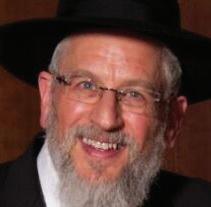
By Rabbi Zvi Teichman
The We are poised to determine our fate in the ensuing year as we undergo judgment on Rosh Hashana once again. How fortunate we are to be standing before our Father, our King, and commit ourselves anew to accept the privileged yoke of responsibility in promoting His honor in the world, hoping that we will be granted another year of life, the strength and fortitude to carry that burden, and the resources to provide our needs so we may dedicate ourselves fully to this noble task.
There are three fascinating customs associated with the Yom Tov of Rosh Hashana.
The eating of םינמיס — signs or omens, foods that are consumed with an added prayer that is based on the term used to identify the specific food and a sentiment of hope that shares a similar word.
Carrots are called איבור in Aramaic, which sounds like the Hebrew word יוביר — to increase. When viewing this איבור, we express our optimism that it may be G-d’s will ובריש — to ‘increase’ our ‘merits’ in the upcoming judgment.
If only it were that simple.
The Rama cites a custom that one should not sleep during the daytime on Rosh Hashana. The Jerusalem Talmud warns that one who ‘dozes’ at the beginning of the new year, one’s mazal — positive heavenly flow, sleeps as well.
Is sleeping on Rosh Hashana truly a death sentence?
The saintly ןילבולמ הזוח — Seer of Lublin, would distribute freshly sharpened, new knives, as a הלוגס — an omen, for financial success. We address G-d daily, חתופ — You open,
ךידי תא — Your hand, and satisfy every living thing with its desire.
The last letters in this sentiment spell ך"תח, which is the name of the angel entrusted with dispensing livelihood. The word ךתח means to ‘slice’, as in the piyut we sing on Rosh Hashana, אוהש םינימאמ לכו — All believe that He remembers the covenant, ךתוחה — who slices [apportions], יח לכל
— life for all the living
What about integrity and faith? Is all it takes to become a sharp and successful businessman the buying of a knife with a glinted blade?
The prophet Hoshea encourages us to return and adhere to the will of G-d.
Who is wise and will understand these, discerning and will know them; for the ways of the Lord are straight, and the righteous shall walk in them, and the rebellious shall stumble on them. (14 10)
Rav Yaakov Yechizkiya Greenwald, the son of the renowned Arugas Habosem, who served in many illustrious rabbinic positions in Hungary, concluding his career in Pupa, popular known by the name of the popular series of sefarim he authored, Vayaged Yaakov, asks why the verse contrasts ‘the righteous who walk’ in the statutes, with ‘the rebellious who stumble’ over them, rather than ‘who do not walk’ in them?
He offers a brilliant and penetrating insight that should give us pause.
If you’ll ask the average man on the street, who studied in his youth in Yeshiva and strived to grow in Torah, why he only devotes a minimum amount of time to its study today, he will likely tell you, ןמז יל ןיא — “I don’t have the time”. He must devote time to his business, family, and personal pursuits.
If you’ll challenge him why he takes a passive stand when being asked to join in a community project, or why he puts in minimal effort when investing in personal mitzvos, inevitably the response will be, חכ יל ןיא — “I simply don’t have the strength”. Life is busy and draining.
If you’ll confront him as to why he only offers meager donations to charity, cuts corners with tuition, and purchases the cheapest quality esrog; tefillin; matzah; tallis, etc., the old refrain will be ףסכ יל ןיא — “I don’t have the money”. Jewish life is expensive.
But aren’t there people you know who despite a busy schedule; large family; lack of sleep, and meager resources, find time to learn more than fifteen minutes a day; is the first one to put a shoulder to a task; stretches finances to pay close to full tuition, and spend money on noble causes despite the strain?
The great Rav points out that both the righteous one and the rebellious one use the same response. It all depends on the inflection.
ןמז — יל ןיא, It is not mine [to squander] — time. Time is a valuable commodity to be properly mined. If we would only realize its value, we would never claim “I don’t have time”, we would readily find it.
חכ — יל ןיא, It is not mine [to gauge] — strength. Strength is not measured by muscle, but by determination. If we want something desperately enough, we will find a reservoir of power within us. If we pursued the will of G-d purely we could never claim “I don’t have strength”.
ףסכ — יל ןיא, It is not my possession [to govern] — money. We are entrusted with assets to preserve and implement in fulfilling G-d’s will. When we waste those resources on wasteful activities or items, we have betrayed the One we pledged responsibility to.
The same prophet Hoshea encourages us, םכמע וחק — Take with yourselves םירבד —words,
— and return to the Lord (14 3)
Take those very same words the rebellious one stumbles in and rectify the intonation by exclaiming how privileged you are to be trusted guard, who will find the time, strength, and resources to carry out your mission on behalf of a loving Father, Who will infuse us with vigor to serve.
The attention to the various simanim, the Sefas Emes explains, is not some magical omen, but rather our framing every priceless morsel of life as a moment to be inspired towards hope and purpose in every facet of our existence. It is our assertion that time should be used to discover in every engagement, G-d’s will and encouragement.
We are to ward off sleep on the onset of our renewed pledge of allegiance, not out of fear of death, but rather out of fear of missing out! We can muster the strength when we are willing to wake up to the thrill of opportunities that are accessible to each one of us.
The sharp knife that slices with precision represents our cognizance that each parcel of materialism we merit is not to be wasted but utilized with directed purpose. When we yank off a piece of the physical world like an animal of prey, we have succumbed to our instinctive animal soul, losing our stature as mindful intelligent beings. If we contemplate how G-d ‘opens His hand and satisfies every living thing with its ןוצר — a ‘desire’, its inner desire that is aligned with ונוצר — His desire, we are guaranteed that G-d will grant us a generous ‘slice’ of life to happily fulfill our roles. It has been noted that the verse which summons us,
— and you will be completely joyous, has embedded in its last letters the name of the angel who provides our needs, ך"תח!
The time is now! We have the strength! We possess all we need!
May we all merit a truly sweet year!
You may reach the author at: Ravzt@ohelmoshebaltimore.com
Parshas Nitzavim discusses the eternal covenant with Hashem, the ingathering of exiles, the imperative of closeness to Torah, the notion of teshuva, and our ability to choose good.
“If you wait until you find the meaning of life, will there be enough life left to live meaningfully?”
-Rabbi Menachem Mendel Schneerson, zt”l


K intsugi is the Japanese art of putting broken pottery p ieces back together with gold. This magnificent and u nique art is built on the idea that in embracing flaws and i mperfections, you can actually create an even stronger, m ore beautiful piece of art. When a cup/bowl/plate of p ottery breaks, most people will either absorb the loss a nd throw the useless shards and pieces in the garbage, o r they will put the pieces back in their spot with a clear g lue, which, once dried, will make the pottery look good a s new. Kintsugi, however, which is a 400-year-old t echnique, allows for the breaks/faults/mistakes to be f ocused on and highlighted by covering the “scars” with g old, in the pursuit of creating something entirely new, f resh, and different.
D r. Caroline Leaf, a communication pathologist and c linical neuroscientist specializing in psychon eurobiology, explains that the art of Kintsugi can be u sed as a metaphor for healing ourselves, and it teaches u s an important lesson: Sometimes in the process of r epairing things that have broken, we actually can create s omething more unique, beautiful and resilient.
A fter discovering and learning about the incredible art of K intsugi, I couldn’t help but think just how akin Kintsugi is t o our concept of teshuva. Teshuva is not about throwing o ur mistakes under the rug, forgetting about them and t hrowing them in the proverbial trash of life. Teshuva is n ot about fixing our mistakes and becoming the exact s ame person as we were before.
PARSHA STATS
Pesukim - 40
Words - 657
Letters - 2,575
Mitzvos - 0
The Toldos Yaakov Yosef draws a connection between the words in Parshas Nitzavim, ותשעל ךבבלב
- “in your mouth, in your heart, to do it” - with the idea that we are meant to serve Hashem with our machshava, dibbur, and maaseh (thoughts, speech, and action).
(Could be this also parallels Teshuva, Tefilla, and Tzedaka...)

Parshas Nitzavim is always read before Rosh Hashana. Perhaps the 40 pesukim that comprise the parsha correspond to the 40 days from the beginning of Elul to Yom Kippur. Forty days is also the amount of time for the formation of a fetus. During this time, we are each being reborn, anew. Mazal tov!
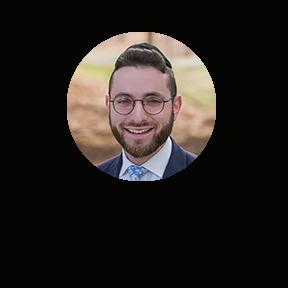
Rabbi Ori Strum is the author of “Ready. Set. Grow.” “Dove Tales,” and “Karpas: The Big Dipper.”
His shiurim and other Jewish content can be found on Torah Anytime and Meaningful Minute. He may be reached at 443-938-0822 or rabbistrumo@gmail.com
T eshuva, at its core, is about noticing our mistakes, o wning up to them, and then covering them with gold! T eshuva is about embracing our human identity, seeing o ur flaws, and then applying gold – holiness, kedusha, a nd purity – to our lives. Teshuva is about creating, or m ore precisely, finding and revealing something more u nique, beautiful and resilient about our selves. What an i ncredible imagery that when we blow the Shofar, we are s pecifically instructed to blow not only the straight b lasts, but the broken ones as well. Just as important as h earing the intact calling of the Tekios is hearing the b rokenness of the Shevarim and Teruah.
I n this week’s parsha, we are told that teshuva is much c loser than we think: Ki karov eilecha ha’davar me’od , it i s very, very close to us. Objects in the mirror are closer t han they appear. The same goes with teshuva. It’s not o ut there. It’s not outlandish. It’s not beyond our grasp. I t’s right here. It’s inside of you. It’s doable. It’s m anageable. It’s waiting for you.
The very concept of teshuva is a tremendous chok. It is almost impossible to understand how it is possible that we are able to mess up and then repent to get it right. It’s not a logical thing. Take advantage of the gift!



A s we continue approaching the High Holiday’s, let us r ealize that we are like the Kintsugi artist. We are not t hrowing out and ignoring our mistakes. Nor are we p utting them back to become what was, to reach status q uo. No, none of that!
W e are embracing the brokenness. We are highlighting t he mishaps and mistakes. And then we are overlaying t hose “spiritual battle scars” with gold – holiness, k edusha, and purity. We are becoming more unique, b eautiful and resilient, as we embark on the journey of d iscovering our true selves.


What does the name “Nitzavim” (standing) have to do with Rosh Hashana (besides for the fact that we stand a lot during prayer services)? Is there a deeper connection between “standing” and the Yom HaDin?

Mercaz Torah U’Tefillah: EVERY 15 MINUTES
M-F: 6:15 AM, S-F: 6:30 AM, 6:45 AM, 7:00 AM, 7:15 AM, 7:30 AM, 7:45 AM, 8:00 AM, 8:15 AM, 8:30 AM, 8:45 AM, 9:00AM, 9:15AM, 9:30AM, 9:45AM, 10:00AM
Neitz Beit Yaakov [Sefaradi] M-F
Ohel Yakov S-F
6:00 AM Shomrei Emunah Congregation M-F
6:10 AM Agudath Israel of Baltimore M, Th
6:15 AM Kol Torah M, TH
Shearith Israel Congregation M, TH
6:20 AM Agudah of Greenspring M, TH
Agudath Israel of Baltimore S, T, W, F
Arugas HaBosem (Rabbi Taub's) S-F
Bnai Jacob Shaarei Zion Congregation M-F
Kehilath B'nai Torah M, TH
Pikesville Jewish CongregationM, TH
Shomrei Emunah Congregation S, M, TH
6:30 AM Agudah of Greenspring T, W, F
Chabad of Park Heights M-F
Darchei Tzedek M-F
Kehilath B'nai Torah T, W, F
Khal Bais Nosson M-F
Khal Ahavas Yisroel/ Tzemach Tzedek M-F
Kol Torah T, W, F
Ohr Yisroel M-F
Pikesville Jewish CongregationT, W, F
Shearith Israel Congregation T, W, F
Shomrei Emunah Congregation T, W, F
6:35 AM Aish Kodesh (downstairs Minyan) M, TH
Ohel Moshe M, TH
6:40 AM Aish Kodesh (downstairs Minyan) T, W, F
Bnai Jacob Shaarei Zion Congregation M, TH
6:45 AM B”H and Mesivta of Baltimore (Dirshu Minyan) S-F
Beth Abraham M, TH
Greenspring Sephardic Synagogue M-F
Ner Tamid M-F
Ohel Moshe T, W, F
Suburban Orthodox Congregation Toras Chaim M-F
The Adas: Chofetz Chaim Adas Bnei IsraelM, TH
6:50 AM Agudath Israel of Baltimore M, TH
Ahavat Shalom [Sefaradi] M, TH
Bais Medrash of Ranchleigh M, TH
Bnai Jacob Shaarei Zion Congregation T, W, F
Community Kollel Tiferes Moshe Aryeh M, TH
Derech Chaim M-F
Kol Torah M-F
Ohel Moshe S
Ohr Hamizrach [Sefaradi] M, TH
Shomrei Emunah Congregation M, TH
The Shul at the Lubavitch Center M, TH
6:55 AM Beth Abraham T, W, F
Kol Torah M, TH
The Adas: Chofetz Chaim Adas Bnei IsraelT, W, F
7:00 AM Aish Kodesh (upstairs Minyan) M-F
Agudath Israel of Baltimore S, T, W, F
Ahavat Shalom [Sefaradi] T, W, F
Arugas HaBosem (Rabbi Taub's)S
Bais Medrash of Ranchleigh T, W, F
Community Kollel Tiferes Moshe Aryeh T, W, F Greenspring Sephardic Synagogue S Khal Ahavas Yisroel/ Tzemach TzedekS
Kol Torah T, W, F
Moses Montefiore Anshe Emunah M-F
Ohr Hamizrach [Sefaradi] S, T, W, F
Shearith Israel Congregation S, M, TH
Shomrei Emunah Congregation T, W, F
Shomrei Mishmeres Hakodesh M-F
The Shul at the Lubavitch Center T, W, F Tiferes Yisroel M-F
7:05 AM Machzikei Torah (Sternhill's) M, TH
7:15 AM Kedushas Yisrael S Kol Torah S
Machzikei Torah (Sternhill's) S, T, W, F
Ner Israel Rabbinical College S-F
Shearith Israel Congregation T, W, F
or sponsorships, email ads@baltimorejewishhome.com
Shomrei Emunah CongregationS
Suburban Orthodox Congregation Toras Chaim S
The Adas: Chofetz Chaim Adas Bnei IsraelS
Tzeirei Anash M-F
7:20 AM Agudath Israel of Baltimore M, TH
Beth Tfiloh Congregation M-F
Kol Torah M-F
Ohr Hamizrach [Sefaradi] M, TH
Shomrei Emunah Congregation M, TH
7:30 AM Agudah of Greenspring S
Agudath Israel of Baltimore S, T, W, F
Ahavat Shalom [Sefaradi] S
Bais Haknesses Ohr HaChaim S-F
Bais Hamedrash and Mesivta of Baltimore S-F
Bais Medrash of Ranchleigh S
Beit Yaakov [Sefaradi] S
Bnai Jacob Shaarei Zion CongregationS
Chabad of Park Heights S
Community Kollel Tiferes Moshe Aryeh S-F
Darchei Tzedek S
Kedushas Yisrael S-F
Khal Bais Nosson S
Ner Israel Rabbinical College (Mechina) S-F
Ohr Hamizrach [Sefaradi] S, T, W, F
Shomrei Emunah Congregation T, W, F
7:45 AM Bnai Jacob Shaarei Zion Congregation M-F
Talmudical Academy S-F
Darchei Tzedek M-F
Mesivta Kesser Torah S-F
Mesivta Shaarei Chaim S-F
Yeshivas Torah Simcha (school days only) S-F
7:50 AM Derech Chaim S
Ner Tamid S
Ohel Moshe M-F
8:00 AM Agudath Israel of Baltimore S-F
Beth Abraham S
Chabad Israeli Center M-F
Darchei Tzedek S
Khal Ahavas Yisroel/ Tzemach TzedekS
Kehillas Meor HaTorah S
Ohr Yisroel S
Pikesville Jewish CongregationS
Shearith Israel Congregation S
Shomrei Emunah Congregation S-F
The Shul at the Lubavitch CenterS
Tiferes Yisroel S
Tzeirei Anash S
Yeshiva Tiferes Hatorah S-F
8:15 AM Kehilath B'nai Torah S
Kol Torah S
8:20 AM Bais Haknesses Ohr HaChaim S-F
8:25 AM Ohr Chadash Academy (School Days Only) S-F
8:30 AM Agudath Israel of Baltimore S-F
Chabad Israeli Center S Machzikei Torah (Sternhill's) S-F
Ohel Moshe S
Ohr Hamizrach [Sefaradi] S
Shomrei Emunah Congregation S-F
Shomrei Mishmeres HakodeshS
9:00 AM Aish Kodesh S
Bais Haknesses Ohr HaChaim S
Beth Tfiloh Congregation S
Bnai Jacob Shaarei Zion CongregationS
Moses Montefiore Anshe EmunahS
Shomrei Emunah Congregation S-F
Suburban Orthodox Congregation Toras Chaim S-F
Mincha
Mincha Gedolah Mercaz Torah U’Tefillah
Khal Ahavas Yisroel/Tzemach Tzedek
1:45 PM Yeshivas Torah Simcha (school days only) M-Th
1 South Street, 27th Floor.
1:50 PM Ohel Moshe
Wealcatch Insurance - 37 Walker Ave 2nd floor
Market Maven
Reischer Minyan - 23 Walker Ave 2nd Floor
10055 Red Run Blvd Suite 295
2:15 PM Pikesville Beis Medrash - 15 Walker Ave
2:30 PM Bais Medrash of Ranchleigh
Community Kollel Tiferes Moshe Aryeh
Tov Pizza Mincha Minyan
Ner Israel Rabbinical College
Mesivta Shaarei Chaim (Community Kollel)
Shearith Israel Congregation
2:45 PM Kollel of Greenspring
Shearith Israel Congregation (S-Th)
3:00 PM Bais Haknesses Ohr HaChaim
Mercaz Torah U'Tefillah
3:05 PM Kedushas Yisrael
3:15 PM Hat Box
3:22 PM Ohr Chadash Academy (School Days Only, Call to Confirm)
3:30 PM Mercaz Torah U’Tefillah
4:00 PM Agudath Israel of Baltimore (S-Th) Mercaz Torah U'Tefillah
4:30 PM Mercaz Torah U’Tefillah
5:00 PM Agudath Israel of Baltimore (S-F) Mercaz Torah U’Tefillah
5:30 PM Agudath Israel of Baltimore (S-Th) Mercaz Torah U’Tefillah
6:00 PM Agudath Israel of Baltimore (S-F) Mercaz Torah U’Tefillah
Shearith Israel Congregation (S-Th)
6:30 PM Mercaz Torah U’Tefillah
10 Min Before ShkiAh Chabad Israeli Center
14 Min Before ShkiAh Kol Torah
Ohel Yaakov
Shomrei Emunah Congregation
Plag
Suburban Orthodox Congregation Toras Chaim
Before Shkiah
Maariv continued
9:00 PM Agudath Israel of Baltimore
Arugas Habosem
Shomrei Emunah Congregation
Suburban Orthodox Congregation Toras Chaim
9:20 PM Kol Torah
9:30 PM Agudah of Greenspring
Agudath Israel of Baltimore
Kedushas Yisrael
9:40 PM Ahavat Shalom [Sefaradi]
9:45 PM Bais Haknesses Ohr HaChaim
Kollel Erev Birchas Yitzchok (Luries)
Kollel of Greenspring
Machzikei Torah (Sternhill's)
Ohr Hamizrach [Sefaradi]
Yeshiva Tiferes Hatorah
9:50 PM Aish Kodesh
Community Kollel Tiferes Moshe Aryeh
Ohel Moshe
10:00 PM Agudath Israel of Baltimore
Darchei Tzedek
Kehilath B'nai Torah
Khal Ahavas Yisroel/ Tzemach Tzedek
Shearith Israel Congregation
Shomrei Emunah Congregation
10:05 PM Kol Torah
10:10 PM Ner Israel Rabbinical College
10:15 PM Derech Chaim
Khal Bais Nosson
10:30 PM Agudath Israel of Baltimore
11:00 PM Agudath Israel of Baltimore
Agudah of Greenspring - 6107 Greenspring Ave
Agudath Israel of Baltimore - 6200 Park Heights Ave
Ahavat Shalom - 3009 Northbrook Rd
Aish Kodesh - 6207 Ivymount Rd
Arugas HaBosem - 3509 Clarks Ln
Bais Dovid-Bais Medrash of Summit Park- 6800 Sylvale Ct
Bais Haknesses Ohr HaChaim - 3120 Clarks Ln
Bais Hamedrash and Mesivta of Baltimore - 6823 Old Pimlico Rd
Aish Kodesh
Agudath Israel of Baltimore
Agudah of Greenspring
Bais Haknesses Ohr HaChaim
Beth Abraham
Bnai Jacob Shaarei Zion Congregation
Darchei Tzedek
Kehillas Meor HaTorah
Kehilath B’nai Torah
Khal Ahavas Yisroel/ Tzemach Tzedek
Khal Bais Nosson
Machzikei Torah (Sternhill’s)
Mercaz Torah U’Tefillah
Ner Tamid
Ohel Moshe
Ohr Hamizrach [Sefaradi]
Ohr Yisroel
Pikesville Jewish Congregation
Shearith Israel Congregation
Shomrei Emunah Congregation
Shomrei Mishmeres
Suburban Orthodox Congregation Toras Chaim
The Adas: Chofetz Chaim Adas Bnei Israel
The Shul at the Lubavitch Center
Tiferes Yisroel
Mercaz Torah U’Tefillah: EVERY 15 MINUTES
PM Agudath Israel of Baltimore
8:00
8:30 PM Agudath Israel of Baltimore
8:45 PM Darchei Tzedek
Ner Israel Rabbinical College (Mechina)
Ohr Yisroel
2:00
PM Agudath Israel of Baltimore (S-F)
Big Al @ The Knish Shop Party Room
Kol Torah
8:50 PM Mesivta Shaarei Chaim (Etz Chaim Building)
8:55 PM Community Kollel Tiferes Moshe Aryeh
Bais Medrash of Ranchleigh - 6618 Deancroft Rd
Beit Yaakov - 3615 Seven Mile Ln
Beth Abraham - 6208 Wallis Ave
Beth Tfiloh Congregation - 3300 Old Court Rd
Bnai Jacob Shaarei Zion Congregation - 6602 Park Heights Ave
Chabad Israeli Center - 7807 Seven Mile Ln
Chabad of Park Heights - 3402 Clarks Ln
Community Kollel Tiferes Moshe Aryeh - 3800 Labyrinth Rd
Darchei Tzedek - 3201 Seven Mile Ln
Derech Chaim - 6603 Pimlico Road
Greenspring Sephardic Synagogue 6611 Greenspring Ave.
Kedushas Yisrael - 6004 Park Heights Ave
Kehilath B’nai Torah - 6301 Green Meadow Pkwy
Kehillas Meor HaTorah - 6539 Pebble Brooke Rd
Khal Ahavas Yisroel/ Tzemach Tzedek - 6811 Park Heights Ave
Khal Bais Nosson - 2901 Taney Rd
Kol Torah - 2929 Fallstaff Rd
Kollel of Greenspring - 6504 Greenspring Ave.
Machzikei Torah - 6216 Biltmore Ave
Mercaz Torah U’Tefillah - 6500 Baythorne Rd
Mesivta Kesser Torah - 8400 Park Heights Ave
Mesivta Shaarei Chaim - 3800 Labyrinth Rd
Moses Montefiore Anshe Emunah - 7000 Rockland Hills Dr
Neuberger, Quinn, Gielen, Rubin & Gibber One South Street, 27th Floor
Ner Israel Rabbinical College - 400 Mt Wilson Ln
Ner Tamid - 6214 Pimlico Road
Ohel Moshe - 2808 Smith Ave
Ohel Yakov - 3200 Glen Ave
Ohr Chadash Academy - 7310 Park Heights Avenue
Ohr Hamizrach [Sefaradi] - 6813 Park Heights Ave
Ohr Yisroel - 2429 Lightfoot Dr
Pikesville Jewish Congregation - 7644 Carla Rd
Shearith Israel Congregation - 5835 Park Heights Ave
Shomrei Emunah Congregation - 6221 Greenspring Ave
Shomrei Mishmeres Hakodesh - 2821 W Strathmore Ave
Suburban Orthodox Congregation Toras Chaim - 7504 Seven Mile Ln
Talmudical Academy - 4445 Old Court Rd
The Adas: Chofetz Chaim Adas Bnei Israel - 5915 Park Heights Ave
The Shul at the Lubavitch Center - 6701 Old Pimlico Rd
Tiferes Yisroel - 6201 Park Heights Ave
Tzeirei Anash - 6706 Cross County Blvd
Wealcatch Insurance - 37 Walker Ave 2nd floor
Yeshiva Tiferes Hatorah - 6819 Williamson Ave
Yeshivas Toras Simcha- 110 Sudbrook Ln.
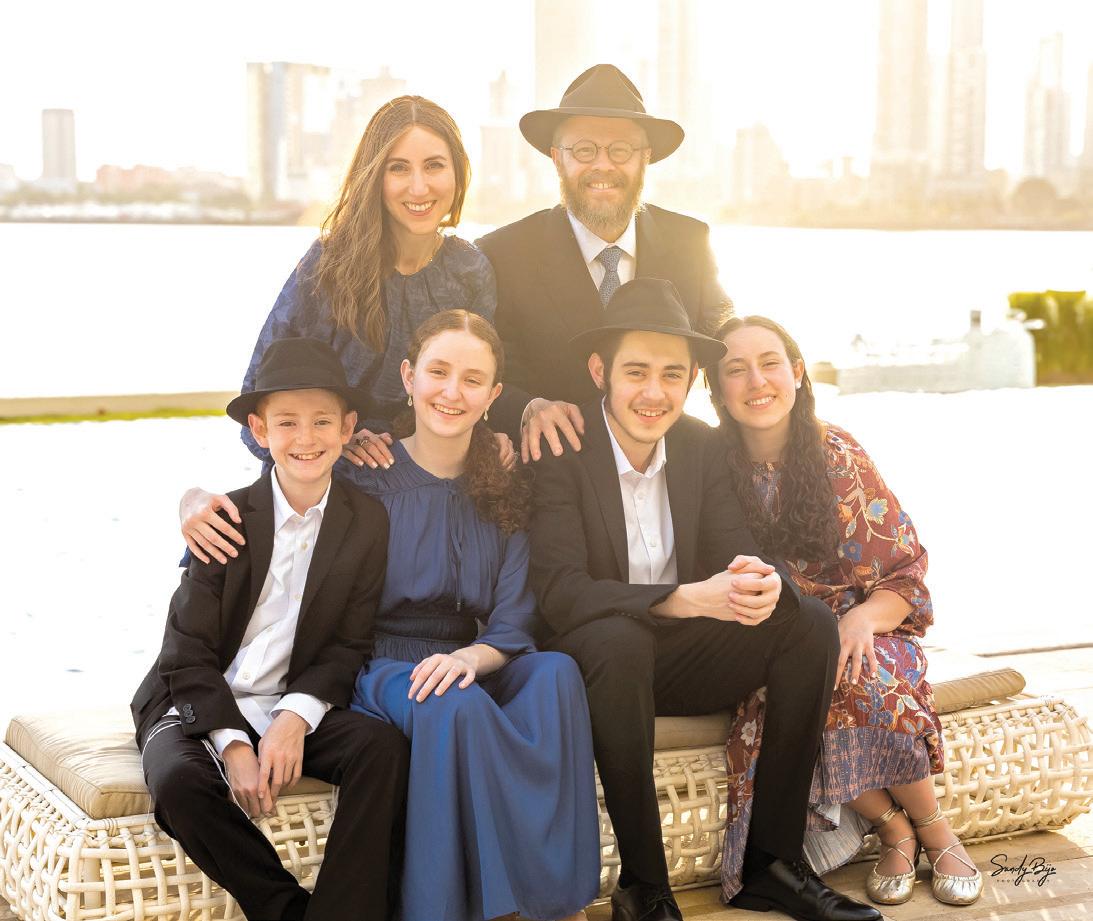
Matt
By Malkie Schulman

Matt was from Houston, Texas; Yael was from Puerto Rico. Matt’s trajectory took him to Shanghai, China, where he built a career in banking and acting, ultimately leading him to Orthodox Judaism. Yael’s path led her through university in the United States, a banking career in Latin America, eventually becoming observant in Miami. In the end, Hashem guided them both, and their paths merged into one.
This is the incredible story of how Matt and Yael found themselves and then found each other.
Matt Trusch’s journey begins with his father.
“My father was a Conservative cantor and rabbi. We were as religious as you could be while still being Conservative. We kept some level of kosher; we had two sets of dishes but only one dishwasher. We had Friday night dinners and wouldn’t go out Friday night. But on Shabbos day, we drove to shul. My father was a spiritual seeker from when he was young. He wanted to get closer to his Judaism, but in those days Chabad and other kiruv organizations weren’t as prevalent as they are today.”
At 18 years old, Matt’s father decided he wanted to become more observant. He walked into an Orthodox shul one Shabbos for services. The gabbai kicked him out because he wasn’t wearing a tie. Unsurprisingly, Matt’s father never became frum. So, although Matt grew up in a Jewish environment, accompanying his father to synagogue every Shabbos, he knew little about the 613 mitzvos, let alone their deeper meanings.
Yael also grew up in an unobservant background in Puerto Rico. About 5,000 Jews live in Puerto Rico, none
of them frum. When it was time for college, she elected to go to Tufts University in Massachusetts.
“I hung out with other Latin American Jewish kids,” she recalls. “It was a nice mix. Some of the Panamanians and Mexicans came from more traditional families and were stronger in religion. Some even kept Shabbos and kosher.”
In fact, that’s where Yael herself started keeping kosher, which at that point essentially meant eating vegetarian.
Meanwhile, Matt’s journey was taking a surprising turn.
“I was always attracted to the Chinese culture. Growing up, I had a few Chinese friends, and in high school, I opted to take Chinese as a language. I was one of two non-Chinese students in my class.”
In 1988, at 16 years old, Matt traveled to China on a study program with Duke University. Later, at Dartmouth College, Matt majored in Chinese Studies and was eventually recruited by a New York–based investment bank,
Merrill Lynch, to work in their Hong Kong–based branch.
After working there for a while, Matt returned to the States for his master’s degree at Harvard University. Upon course completion, Matt was awarded a traveling fellowship, returning to the Far East to do research in Shanghai for his thesis. While there, he got a small role as an “extra” in a Chinese kung fu movie.
“I was the only white guy in the film. Of course, my job was to get beaten up by the Chinese hero (representing the Chinese dream of conquering the West). But it was fun.”
He was cast for comedy sitcoms as well, sort of a Saturday Night Live equivalent.
“I’d be the funny foreigner who spoke perfect Chinese. They knew I was Jewish. They loved Jews, so I was never embarrassed to admit my origins. It didn’t even matter once I became religious and put on yarmulke and tzitzis. To the Chinese, any white person stands out. It doesn’t matter how he’s dressed.”
Matt shares how the Chinese view the Jewish people: “For thousands of years, the Chinese population have been lovers of Jews. There’s even a Chinese city called Wenzhou, where the business-savvy residents refer to themselves as Chinese Jews. They’re sharp, wealthy, and good at business, and there’s no higher praise in China than to be considered a ‘Chinese Jew.’”
Matt adds, “Soon I became a Chinese movie star. After TV and soap operas, I landed a major film role. That was cool and, definitely at 26 years old, my life aspiration.”
Then Matt met Rabbi Greenberg from Chabad.
“I was fluent in Chinese, and he didn’t speak a word of it. I’d drive around with the rabbi and help him out. Of course,” Matt shares, “at the time, I thought that I was helping him when it was much more the other way around – he was helping me. I got to ask him all the questions about Judaism that my Conservative upbringing had left unanswered.”
Matt recalls that on one of their many drives, Rabbi Greenberg asking him bluntly, “Matt, have you ever considered not marrying a Chinese girl?”
“Why shouldn’t I?” Matt answered. “I speak the language and love the culture.”
“I don’t think your parents would be too happy about it. I’m pretty sure they’d want you to marry a nice Jewish girl,” the rabbi responded.
“I was so out of touch, I didn’t even think it was a problem to marry a non-Jew.” (Years later, Matt found that his parents had put Rabbi Greenberg up to it.)
“My track was Latin America,” shares Yael. After graduating college, she worked at JPMorgan Chase in the Latin American department in Manhattan and then moved to their office in Buenos Aires, Argentina. When it was time to return to headquarters in Manhattan, Yael began to question her direction in life.
“I asked myself, ‘Is there more to life than professional and financial success? What about marriage and family?’ I knew a change of lifestyle was in order. So, I took a private equity job in Miami, where life was slower than in Manhattan.” That’s where she first encountered Chabad.
“Rabbi Rosenberg, a shaliach who’d lived for a while in Bogota, Colombia, was teaching a class in Spanish that I attended. I was awed discovering a depth and beauty to
Judaism and life that I’d never experienced before.”
Yael began visiting the Rosenberg home for Shabbos and yom tov. “They became my family.”
She kashered her apartment and gradually became increasingly observant. By that point, Chabad had opened a branch in Puerto Rico, which was helpful because now Yael had a place to go for Shabbos and yom tov when she returned home to her parents.
“Baruch Hashem, I’ve always had a good relationship with my parents. I’m an only child and they’ve always been supportive of me and my decisions.”
Of course, this wasn’t what they envisioned for their daughter, but when friends and neighbors would give them pushback, they’d proudly point to what a wonderful human being and mensch Yael was. They kept separate dishes for when she visited.
“Sometimes,” Yael admits, “tensions did arise, like the time they wanted me to visit relatives after Shabbos with them, and their ‘after Shabbos’ was not really after Shabbos. But that’s like all relationships that must be managed. Baruch Hashem, we were always able to iron our misunderstandings out.”
Slowly, Yael’s priorities started to shift.
“I wanted a family like I saw in the Rosenberg and the other shluchim’s homes. That became my focus.”
Meanwhile, on the other side of the world, Matt was living his parallel life.
“We both started out as bankers. Then, when the Greenberg family moved in, I slowly started keeping kosher and putting on tefillin, even while acting in the Chinese movies.”
Matt also gradually began observing Shabbos.
“I remember when the phone rang, my first thought was always, ‘This is the big call – the call telling me I snagged the leading role in an upcoming film (apparently, a common fantasy of aspiring actors). But after enough wrong numbers, I finally decided not to answer anymore on Shabbos. Funny enough, the phone stopped ringing after that.
“The way I see it,” Matt explains, “is that Hashem gives you a test, and once you pass it, you don’t need the test anymore, so He stops sending it your way.”
Soon, something else happened that threw him for a loop.
“Every Gimmel Tammuz, Rabbi Greenberg would disappear. I finally discovered he would travel to the Ohel for the Rebbe’s yahrzeit.” On one occasion, Matt accompanied him. “It was amazing, and I was all set to fly back to China on September 12 when 9/11 happened.”
Matt got “stuck” in New York for yom tov.
“I was invited that Sukkos to the sukkah of Rabbi Moshe Kotlarsky, a Chabad leader whose job was to send shluchim around the world. I was introduced to him as ‘This is Matt, the Chinese actor.’ Rabbi Kotlarsky can be a strong, sharp character, and after talking to me awhile, he said, ‘Matt, when are you going to stop being the heartthrob of the Far East and do something with your life?’ repeating this line multiple times throughout the Sukkos farbrengen.”
At first, Matt felt bitter about Rabbi Kotlarsky’s sharp words. Then he thought, “Why am I trying to be a heartthrob?” Maybe it was time to jump ship.
“And with that, it was goodbye heartthrob, goodbye Chinese movie star.”

Matt stresses that one of the reasons he believes he stuck with the “becoming frum process” was because he did everything slowly.
“Looking back, I think Rabbi Greenberg was using reverse psychology. When I told the rabbi that i wanted to start putting on tefillin, for example, he tried to dissuade me saying, ‘I don’t know, Matt. It’s a big life commitment. Are you sure you’re ready?”
Nevertheless, Matt was starting to feel the push to make more significant changes. The Greenbergs went away one Shabbos, and there was a 23-year-old visiting rabbi filling in for them.
“I attended his shiur, and he was teaching all this mystical stuff that blew my mind. I was 28, and I thought I was so smart, but I didn’t have a clue what this guy was talking about.”
Matt felt crushed and began to think more seriously about what he was doing with his life.
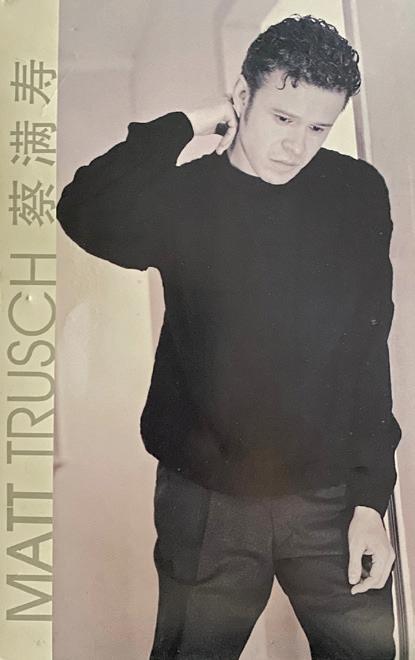
He left acting and took a job with an Israeli company in Shanghai. A benefit of working for this company was that he was often flying back and forth to Israel, which meant that when he was in Israel, he could attend yeshiva. For the next two years, he’d learn for two weeks out of each month in Mayanot, a Chabad yeshiva in Yerushalayim.
After two years of this schedule, Matt opted to learn full-time.
“At that point, I was 30,” Matt shares, “when one day, the Mayanot director, Rabbi Shlomo Gestetner, pulled me aside and asked if I was interested in getting married.”
While Matt was gallivanting in the Far and Middle East, back in Miami, Yael was offered a full scholarship to NYU’s MBA program in New York.
“I wasn’t sure if I should take it,” says Yael, “because that would mean leaving my rabbi and rebbetzin. I was worried how I’d be able to stay committed to my new observant lifestyle being so far from them. I wanted to get married and raise a Jewish family. The Rosenbergs, however, were adamant that Yael continue her education. They felt there was no contradiction in being worldly and educated and being an observant Jew. Besides, they assured her, there are plenty of spiritual tools in New York City.
The Rosenbergs connected Yael with George Rohr, the well-known philanthropist responsible for establishing Chabad houses around the world. Mr. Rohr had started a beginner’s minyan in the Upper East Side, and Yael joined it.
“So, I got my MBA and grew in my Yiddishkeit,” shares Yael. “But I was 25 and still hadn’t met my bashert.”
Rabbi Gestetner. It read, “Hi Yael. Sorry to be so blunt, but are you looking for a shidduch? If so, please tell me what you’re looking for.”
Yael was planning on disregarding the strange email. Thankfully, her friend encouraged her, saying, “Mayanot guys are perfect for you. They’re professionals, and they’re serious learners.” Yael replied to the email with her description of her “ideal” guy.
Rabbi Gestetner immediately replied, “The boy’s going to write to you.”
After receiving the subsequent email from the Harvard grad-turned Chinese actor-turned observant man, Matt himself, Yael recalls thinking, “How do I even know he’s normal?”
She figured she should check him out. She called George Rohr to see if he had any connections in Shanghai. A few days later, Mr. Rohr called Yael back with the scoop on Matt. “Yael,” he said, “if you were my daughter, I’d tell you to go out with him.”
Thus began Matt and Yael’s email courtship.
“We were emailing back and forth for a month and half, the emails getting more intense,” recalls Matt, “and I didn’t know yet what she looked like!”
The idea of googling someone wasn’t an option in 2004. Finally, Matt purchased a ticket from China to New York, and on November 19, 2004, they had their first in-person date, a picnic lunch in Rockefeller Center. They went out again the next day, and the next day after that for five days in a row.
“Every strength, every weakness, every setback can be used to make the world better.”
Although Yael attended single events, nothing panned out. Then she heard a story about a man who went to his rebbe for advice about marrying off his daughter. “Did you make a kiddush for her when she was born?” asked the rebbe. “No,” the man responded. “Think of all the blessings and amens you would’ve received at her kiddush,” the rebbe told him. The man returned home, made his daughter a kiddush, and she soon became a kallah.
“I heard the story,” recounts Yael, “and decided I wanted to make myself a kiddush. I called the Chabad rabbi in my neighborhood to sponsor a kiddush. He asked me, ‘Do you want to sponsor a regular kiddush or a grand kiddush? I said, ‘Rabbi, I want to get married. I’m going for the grand kiddush!’ The rabbi scanned various dates and told Yael that an auspicious time would be the day the Mittler Rebbe was released from prison
At that time, Yael was finishing her MBA at NYU and volunteering as one of the event organizers for Mayanot Birthright Wall Street Young Professionals.
“I felt it was a worthy cause and a potentially good way to meet my bashert. I didn’t meet him, but I did get to meet Rabbi Gestetner a few times at events.”
One day, out of the blue, Yael received an email from
The fifth day was the tenth of Kislev, the day the Mittler Rebbe was released from prison. Matt felt it was an auspicious day to propose, but he hadn’t brought along the appropriate proposing attire. He quickly ran to buy a suit, which Yael says with a laugh she noticed didn’t fit him very well.
“When we met, I remember saying I was hungry, but he wanted to go to the top of the Empire State Building.”
When they arrived at the top, they saw a guy get down on his knees and propose to his girlfriend while everybody stood around, clapping. Matt was thinking, “Wow, this is the perfect place to propose,” but Yael was thinking, “Let’s get through this tourist attraction and find a place to eat.”
As Matt didn’t know what was going on in Yael’s mind, he decided this indeed was the best time and place to pop the question. Yael’s response? “No!”
Matt, looking over the ledge, thought, “What should I do now? Jump?”
Yael clarified, “I don’t mean ‘No.’ I mean not now.”
“Then,” Matt shares, “guess who gets into the elevator with us? That happy young couple who just got engaged. It was the longest elevator ride of my life!”
When they got downstairs, Yael recommended they find a place to eat.
At this point, Matt was thinking, “She turns me down, and I have to buy her a steak?”
Baruch Hashem, there is a happy ending to the story. After steak and wine, Matt turned to Yael and said, “Just
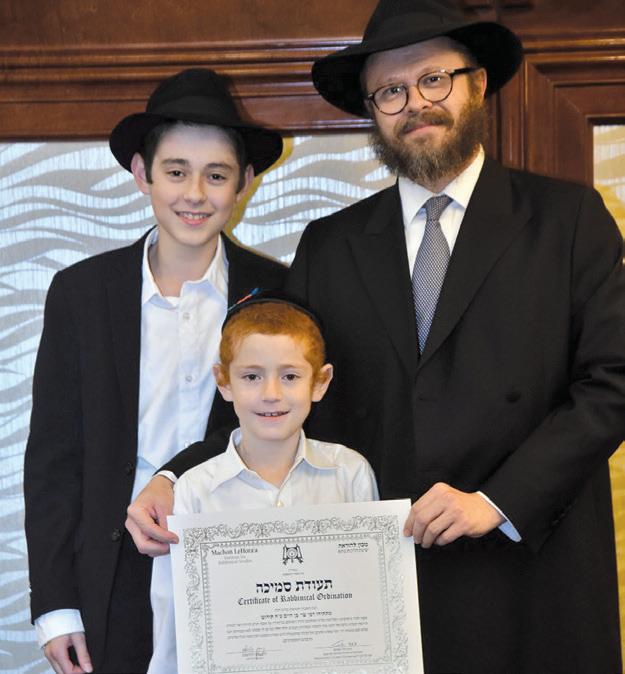
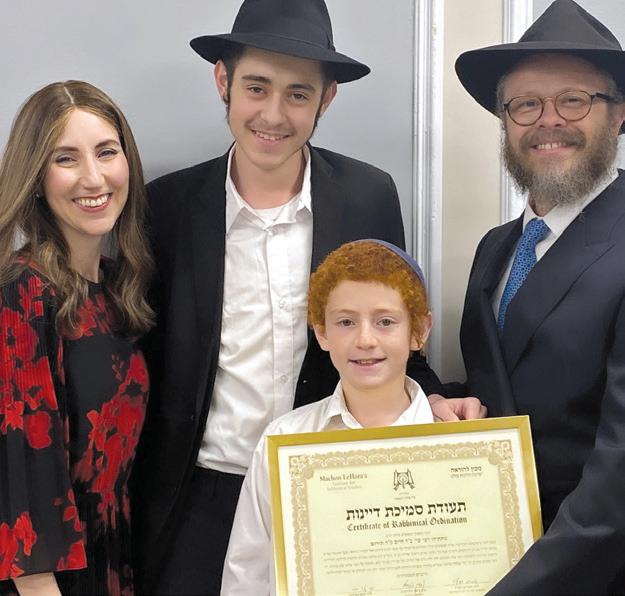
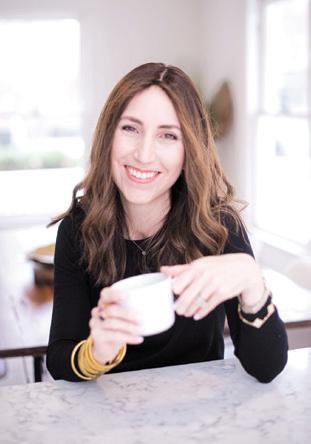
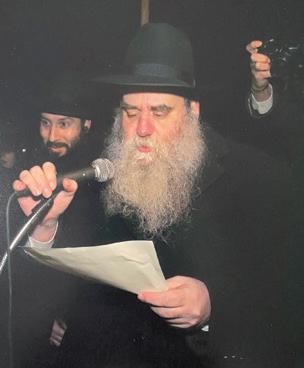

let me know when you’re ready; the offer is still open.”
Yael wasn’t going to let him get off that easily. “You have to ask me again.”
“Are you kidding?”
But he did, right there. And the answer this time was a resounding, “Yes!”
From this, Matt notes, he learned his first lesson in marriage: Never discuss anything of importance when your wife is hungry!
“A few months later, we were married on the steps of 770,” recounts Matt. “Rabbi Kotlarsky was our mesader kiddushin. George Rohr and all the rabbis who had led us along the way received brachos under the chuppah. Our rabbis called us the quintessential Chabad match.”
Two weeks later, Matt and Yael started off their marriage in Israel. Matt learned in Mayanot and Yael in a program called Malchus. Twelve months later, their first son Moshe David was born. At that point, Matt felt it was time for him to get back into the workforce. Soon after, with almost uncanny timing, Rabbi Gestetner called Matt regarding a business opportunity in Shanghai. Even though, Yael wasn’t thrilled about relocating to China, coming from their shadchan, they took it as a divine call from Above. They also felt they’d be able to help the shluchim build the community there, so they accepted.
“I went back to being the rabbi’s sidekick, but this time as the gabbai. We started a beginners’ minyan, and Yael helped with the Hebrew School and ladies’ programs.”
Although they were helping the shluchim out, the Trusches feel that they were really the ones benefiting more.
“The close proximity to the Greenbergs shaped the way we would parent our children,” Yael reflects.
Their next child, a daughter, was born in China.
Matt jokes, “We always tell her that she was ‘Made in China.’”
When expecting their third, they moved to Houston, Texas, for better educational opportunities. When Moshe David turned twelve, Matt asked him, “What do you want to learn for your bar mitzvah?” His son surprised him and asked him back, “What are you going to learn for my bar mitzvah, Tatty?” Matt was confused. His son continued, “Why don’t you go for semicha? I’ll become a bar mitzvah, and you’ll become a rabbi.”
Matt found an online semicha course with Rabbi Nachman Wilhelm. For nearly three years, on top of his busy work and travel schedule, Matt studied and got his semicha. That’s when his son confessed that his mother had put him up to it. Matt could hardly believe it. “Are you joking?” He had no idea it was Yael’s idea.
“Thank you, to my beautiful wife,” he said later. “You made me a husband, a father, and now a rabbi.” A few years later, Matt became a Dayan, as well.
Nevertheless, despite these accomplishments, Matt still felt haunted by the memory of Rabbi Kotlarsky asking him, “When are you going to do something with your life?” That’s when, by hashgacha pratis, a Chabad rabbi in London reached out.
“Can you help translate the Tanya into Chinese?”
Matt was all in. He formed a team that included Chinese convert and Chabad rebbetzin Elisheva Martinetti (see TJH April 9, 2025 issue for an article on Elisheva).
While working on the project, Matt rediscovered an amazing Rebbe story that had almost been forgotten.
In the 1980s, the Rebbe had asked for two books to be translated into Chinese. One was The Divine Commandments. The other was My Prayer. The first had been translated. The second had never been finished.
Matt asked himself, “How is it possible that forty years later this book still isn’t completed?”
He knew it had to be done, so he did it. The book is now published, beautifully designed, and available for free online through Chabad.org for any Chinese speaker. The Tanya is almost ready and coming soon.
“I’m so excited,” Matt shares. “I finally feel like I’m doing something with my life. I’m using my unique skills in Chinese. I used to ask myself why I spent so many years studying Chinese if I was only going to end up learning Torah. But now I understand. Hashem had me learn Chinese so I could translate these seforim.”
Matt also started a Jewish wisdom TikTok channel in China, which, at one time, reached 200,000 followers.
“Historically, the Chinese people have been close to us,” he shares. “During World War II, twenty thousand Jews found refuge in Shanghai. The friendship was real.” Today, he sees younger generations being influenced by messages from outside forces.
“There are efforts trying to infiltrate young minds. It was never our reality. However, now, through media, we see it happening in America and beyond. We must bring light to the world.”
Matt still doesn’t know exactly why the Rebbe wanted books translated into Chinese.
“But a greater vision is unfolding. This project is uniting Chinese converts and Chinese speakers around the world. Some live in Israel, Australia, and the States. One Chinese friend, a Bnei Noach, asked me, ‘How did the Rebbe know that this book is exactly what our culture needs?’ The idea of prayer and connecting to something higher is deeply resonant.”
Yael, in the meantime, besides for raising a beautiful Jewish family of four, has leveraged her experience in finance and business through her award-winning podcast Jewish Money Matters and online courses, becoming a sought-after speaker on the intersection of Jewish wisdom and finance. She supports Jewish Latin American women in cities around the world, teaching both in English and Spanish. Through JLI, Momentum, and WITZU, she’s gathered thousands of women globally and has written for Aish, The Jewish Herald Voice and Chabad.org. Her first book is currently being published, a personal finance guide focused on the financial and spiritual power of tzedakah.
unsure. “They don’t know how they’ll get something done. It may seem too difficult. Nevertheless, trust in G-d, and He will show you the way.
“You don’t need to know how to get on a stage or write a book. Say yes, and He will guide you.”
Matt and Yael’s story contains a universal message.
“Every person has G-d given skills. Use them. We Jews have 613 commandments. Non-Jews have seven. Our mission is through keeping the commandments and learning. Their mission is also vital. Prayer and living a life of purpose apply to all people. The Rebbe cared for everyone. He was already thinking about people he had never met. We should, too.”
Matt adds, “Everyone has been handpicked for a role. There is meaning when you know your Creator. This truth applies to every human being. Every strength, every weakness, every setback can be used to make the world better.”
Matt ends with Rabbi Kotlarsky’s challenge that he carries with him to this day: “When are you going to do something with your life?”
He hopes others feel inspired to ask that same question of themselves.
“Wake up to your mission. Do something meaningful today.”
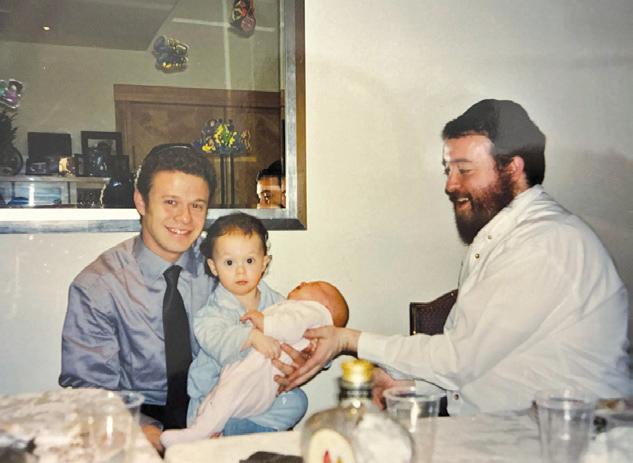
Matt and Yael believe that everyone who reflects on their life can recognize Divine Providence.
“We should all look inward and acknowledge, ‘G-d has given me something unique to contribute to His world.’ Nothing is random. Life unfolds by divine design. Every experience, every step, has cosmic significance. Everyone has the ability to use their life to bring goodness into the world.”
This mindset, Matt says, was the hallmark of the Rebbe. Always looking for your mission. Never being finished. Never settling. The Rebbe always wanted more. Retirement wasn’t an option. But, sometimes, people feel
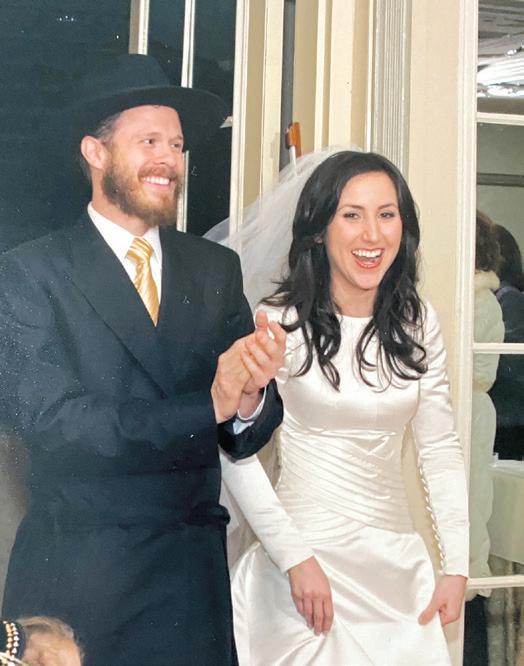
As I don’t think that we go to shul just to daven. On every trip.
It’s just a theory. I’m not a rabbi, so take everything I say with a grain of salt, unless you’re reading this during the Yomim Nora’im, when you can take it with a grain of honey.
Look at the typical morning. You come into shul, and after fighting past the guy who’s using the bookshelf as a shtender, you turn around and realize that someone’s in your makom kavua. So you sit somewhere else. No big deal. I don’t personally believe that my improvement in kavana in a makom kavua is better than the guy who actually came on time to shul. Yes, there is a concept of makom kavua, which we learn from Avraham Avinu, but Avraham Avinu was the only Jew at the time, so he never had to kick anyone out of his seat.
But then, after a while, someone else shows up and finds you in his seat. So he decides to handle it using the internationally-recognized method of putting his stuff down in front of you and coughing a lot.
What are you supposed to say to him? I guess you can wordlessly hold your ground and specifically not get the message no matter how many things the guy piles in your place. But not if the guy has a tabletop shtender. How come he gets to save a seat no matter what time he comes just because he stores a shtender on the table?
Somebody did that to me last week. So what was I supposed to do? Hand him the shtender? Let him walk around the crowded shul with a 25-lb. shtender trying to find a place to sit between the two guys shukkeling sideways and slamming shoulders? So I moved. But the only place to sit at that point – because he couldn’t drag himself out of bed to kick me out earlier – was a chair that was parked in front of the bookcase. So I came full circle.
Not that there are that many great seats. You can sit next to the guy who davens too
loudly. And it’s not the whole davening – he just yells out random parts. And not always in line with what everyone else is saying.
And these are guys who always refuse to daven for the amud. Yet they have to keep announcing what they’re up to. Or that they remembered Yaaleh V’yavo.
And speaking of noise, don’t forget about the kids. They won’t let you.
Now don’t get me wrong. Bringing kids to shul is great chinuch and also adorable if they know how to be quiet and shukkel in front of a page of alef beis. But some kids just walk into shul and cry.
Do you mind? I’m trying to cry to Hashem. How difficult is your life right now, rolling into shul two hours late with your homemade pekeleh and your picture books?
“I got the wrong color lolly.”
It’s Yom Kippur. Be happy you got any lolly. I’m sitting here with besamim. And it’s not even the kind I like.
Not that we prefer the kids who show up, get candy, and leave. The candy is so you can sit quietly in shul. Not so you can traipse in with each of your friends.
“I have a little sister at home. Can she have one?”
“No. Tell your mommy to buy lollies for her. They’re not that expensive.”
And then there are the temperature-control fights between the people who want the window open for air and the people who want it closed because they’re cold.
“Then why do you sit near the window?”
“So I can close it.”
“Well, put on a tallis!”
And I’m sure there are annoyances in the ezras nashim too. I don’t really know them. I know it starts with having to kick the men out when you first get there.
By Mordechai Schmutter
I’ve heard women complain about this. But this is not really different from kicking someone out of your makom kavua. And the men will get out. They won’t challenge it. But I guess it’s still annoying to have to do that. The men never have to do it when they first come to shul.
“Hey, why is the men’s section full of women?”
“What? It’s roomier!”
Of course, the noises are annoying for women too, especially when they can’t hear the chazzan. And that guy yelling out random parts of davening? They have no idea he’s not the chazzan.
And don’t forget the men who shmooze in the back of the shul – or at least they think it’s the back of the shul. It’s right in front of the women. Though my advice for that one is that the women should just keep pekelach on hand from previous simchas that they can throw at the men. Unless you think that’s rewarding them for their behavior. But candy does keep most kids quiet.
So women have reasons to be annoyed too, but they typically go once a week. Men go 14-21 times a week. But in case women are jealous that we get to go off to shul and have you fight with the kids in the morning -just so you know, we’re fighting too. All we want to do is daven, but all these annoying people are in the way.
On the other hand, that seems to be the whole point. The point of going to shul is to daven with at least 9 other people and their various annoying personality traits. You have siddurim at home. Maybe the point of davening together is an achdus thing – learning to get along in service of the greater good. Because you know where people don’t kick you out of your makom kavua? At home.
Unless you daven at the same time as your wife. Mordechai Schmutter is a freelance writer and a humor columnist for Hamodia and other magazines. He has also published eight books and does stand-up comedy. You can contact him at MSchmutter@gmail.com.


People feel the need to share every bit of inspiration and every story they receive with all their contacts, family, and friends. The amount of “MUST READ” material sent to my inbox is out of control. I used to take it all as a command and studiously
read every forwarded piece of advice or inspiration I got, then carefully forward them further to my people. Lately, I’ve been feeling that enough is enough. Just because my neighbor says I must read something, or my mechutan insists his story is a “stop everything and be

inspired” kind of story—no thanks. I decide for myself what I want to read and what information I find vital to my life.
When you download an app for your child—or even for yourself—it’s easy to assume it does only what it advertises. A game is just a game. A music app is just for music. But more and more, that isn’t the case.
Apps that once seemed harmless can quickly add features that change everything. WhatsApp started as simple texting, but is now a full social platform with groups and forums. Cricut, known for design, now includes sharing and interaction. Spotify, already risky for its explicit content, recently added user-touser messaging. TikTok, long concerning for its addictive and inappropriate material, continues to expand its private communication tools. Even Duolingo, a language-learning app, allows users

to comment on your updates, creating opportunities for unwanted interaction.
These shifts aren’t just cosmetic. Social features mean strangers can reach your children, conversations can wander into unsafe territory, and the apps themselves become harder to put down.
That’s why vigilance is key. Don’t assume an app is safe just because of its original purpose. Re-check apps regularly, especially after updates. An app doesn’t need to look like social media to act like social media—and staying alert is the best way to keep it from compromising your family’s safety.















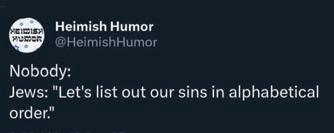



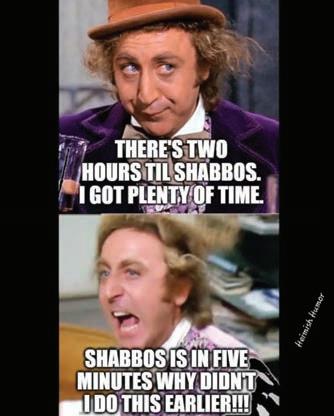

By Aron Schoenfeld

When I enlisted in the IDF, I never imagined I’d experience some of the most meaningful Shabbatot of my life on an army base in the middle of the desert. But serving in a unit that’s 100% Orthodox (with half being Chabad) while other teams around us are mixed religious and secular has given me a perspective I never expected to have, especially during wartime. The experience has challenged everything I thought I knew about maintaining religious observance in challenging circumstances and shown me how sacred time can be created anywhere, even in the most unlikely environments.
Our unit operates differently than most others in the IDF. While many bases have a mix of religious and secular soldiers creating complex dynamics around observance, we have the unusual situation of complete religious uniformity. This creates an atmosphere where Shab -
bos isn’t something that needs to be navigated around or accommodated for just some soldiers; it’s the natural rhythm that governs our entire unit’s weekly cycle.
The Chabad influence in our group adds another layer of warmth and accessibility. Their approach to Jewish practice, emphasizing joy and inclusion, permeates our Shabbos celebrations. Even soldiers from different Orthodox backgrounds find themselves drawn into the infectious enthusiasm that characterizes Chabad’s approach to Jewish life. It creates an environment where religious observance feels celebratory rather than compulsory, even under the constraints of military life.
Our Shabbos preparations began with something you won’t find in any civilian community: a halachic briefing. Our commander, himself a learned man, would gather us together to walk us through what we could and couldn’t do during the upcoming Shabbos, including com-
plex questions about carrying phones for security purposes during wartime, handling weapons when necessary, and maintaining our military responsibilities while observing Shabbos laws.
These briefings represented a fascinating intersection of ancient Jewish law and modern military necessity. Questions that rabbis centuries ago never had to contemplate became practical realities for us: Can a soldier answer his radio on Shabbos if it involves pikuach nefesh (saving life)? How do we handle guard duty rotations while maintaining the spirit of Shabbos rest? Our commander’s deep knowledge of both halacha and military protocol allowed him to navigate these complexities with wisdom and sensitivity.
The logistical preparation was equally remarkable. It was surreal yet beautiful: military protocol meeting ancient Jewish law, with our leadership thoughtfully arranging duty assignments so everyone could participate in communal davening and meals together. The army’s accommodation of our religious needs went far be-
yond what I had expected, showing a genuine commitment to enabling meaningful observance even in wartime conditions.
The preparation itself was nothing short of incredible. Picture this: grilled vegetables for salatim arranged on military issued tables that had been covered with white sheets to create a more festive atmosphere, warming trays filled with home delivered fish dishes that had traveled from communities across the country, chicken that somehow tasted like home despite being prepared in field conditions, cholent simmering for Shabbos lunch in industrial sized pots, an array of kugels representing different family traditions, homemade challah and sourdough that put my local bakery to shame, plus cakes from multiple communities who had “adopted” our unit.
The generosity of civilian communities was overwhelming. Families we had never met sent elaborate meals, often accompanied by notes of encouragement
and blessing. Entire synagogue communities coordinated to ensure we had everything needed for a proper Shabbos. The logistics of getting all this food to our remote base location while keeping everything fresh and kosher was a minor miracle in itself. Honestly, I don’t have this much food variety in my own house on a regular Shabbos!
The transformation of our utilitarian mess hall into a place suitable for Shabbos meals required creativity and teamwork. Soldiers worked together to arrange tables, set up warming stations, and create an atmosphere that felt as far removed from army life as possible. The familiar green of our uniforms seemed incongruous against the white tablecloths and flickering candles, yet somehow it all came together in a way that felt both authentic and deeply moving.
Friday night davening was something else entirely. Picture a mix of Ashkenaz and Sephardi melodies floating through the desert air, creating a sound that felt like the best yeshiva moments I could remember. All the men davening together, voices joining in ancient songs, spontaneous dancing breaking out: it was electric. The energy was infectious, transforming tired soldiers into spirited celebrants of Shabbos.
The whole base ate by units, with our base cook skillfully supplementing the treasure trove of home-brought food. Our military chef, initially overwhelmed by the complexity of keeping everything warm and properly served, quickly adapted to become part of our Shabbos team. His pride in presenting the meals properly and his genuine interest in understanding our traditions added another layer of beauty to the experience.
Our zemirot echoed across the compound with such joy and volume that I heard them clearly from the guard tower half a kilometer away during my watch. There’s something powerful about Jewish song carrying across a military base under the desert stars, creating a bubble of holiness in an environment dedicated to the harsh realities of defense and war. The contrast was stark yet somehow harmonious, as if the ancient melodies were blessing our modern mission of protecting our people.
Shabbos morning brought communal kiddush at our makeshift shul: herring, kugel, cholent, and singing that stretched until either jobs called or afternoon naps

beckoned. The morning prayers took on special meaning in our temporary sanctuary, a converted storage tent that had been transformed with borrowed Torah scrolls and improvised furnishings. Every element that makes a space holy seemed to materialize through the collective effort and intention of our community.
But the real magic happened in our Zula (unit tent), which had become the natural gathering spot as the only completely Shabbos appropriate space on base. No phones buzzing, no TV chatter,
ness was always jarring, yet somehow the spiritual strength gained during those 25 hours seemed to carry us through the challenges that followed.
It’s honestly a strange balance: observing Shabbos during wartime while wearing army fatigues. The juxtaposition of preparing for military operations while lighting candles, of carrying weapons alongside prayer books, of maintaining
There’s something powerful about Jewish song carrying across a military base under the desert stars, creating a bubble of holiness in an environment dedicated to the harsh realities of defense and war.
no background music: just pure Shabbos atmosphere. Here, conversations flowed from Torah discussions to sharing stories from home, from army experiences to dreams for the future. The tent became a sanctuary within a sanctuary, a place where the outside world of military concerns could be temporarily set aside.
We shared seudah shlishit as the day wound down, that bittersweet third meal that always makes you want to hold onto Shabbos just a little longer, before getting briefed for Saturday night operations and Sunday’s schedule. The transition from Shabbos peace back to military readi -
commitment, sacred time can be created anywhere.
The IDF has made remarkable strides in recent years to make Shabbos feel like Shabbos for religious soldiers, and the ripple effects enhance the weekend experience for secular soldiers, too. When half the base is singing zemirot, everyone feels the specialness of the day, regardless of their personal observance level. This evolution reflects a broader understanding within Israeli society about the importance of accommodating religious diversity while maintaining military effectiveness.
The changes go beyond mere tolerance to genuine facilitation. From kosher food arrangements to duty scheduling that respects religious obligations, the military has developed sophisticated systems to support religious soldiers without compromising operational readiness. This represents a significant shift from earlier decades when religious soldiers often faced difficult choices between their faith commitments and military service.
There’s still room for improvement in how the military accommodates religious observance, but I find myself already looking forward to our next base Shabbos. There’s something uniquely powerful about creating this island of holiness in the middle of military service, about proving that sacred time doesn’t require perfect circumstances; sometimes, it requires the opposite.
security protocols while creating sacred space, creates a cognitive dissonance that forces you to think deeply about what really matters. Yet somehow, without any compromise to our observance, we kept Shabbos completely while maintaining the full joy and spirit of oneg Shabbos.
This experience has taught me that holiness isn’t dependent on perfect circumstances or ideal environments. Sometimes, the most meaningful religious experiences come precisely when external conditions seem least conducive to spirituality. The army base Shabbos proved that with intention, community, and
Who knew that some of my most memorable Shabbatot would happen not in the comfort of my family’s dining room, but in a tent in the desert, surrounded by brothers in arms who’ve become family in the truest sense? This experience has redefined my understanding of what makes Shabbos special and shown me that community, intention, and commitment matter more than external circumstances.
May we merit to celebrate future Shabbatot in peace, but until then, we’ll keep making sacred time wherever we find ourselves.
Aron Schoenfeld, who grew up in Woodmere, is the founder of Smiles for the Kids and was recently drafted to the IDF at age 44. He is currently serving in milluim. To learn more about his journey, please visit www.smilesforchayalim.com
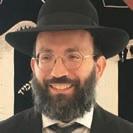
RBy Rabbi Shraga Freedman
abbi Sruli Bornstein, who gives a very popular Daf Yomi shiur in Lakewood, shared the following story:
acting with the best of intentions, pay it forward. Treat him the way I treated you.”
The postscript is remarkable. A year or two later, this same worker met my friend and told him:
“I want you to know how deeply I was moved by your reaction. That cigarette I smoked on Shabbos—right before the wine incident—was the last cigarette I ever lit on Shabbos. I have not been mechalel Shabbos since then. The impression your calmness and dignity made on me changed my life.”
When we are able to rise above our instincts and respond with true dignity, it reflects G-dliness itself. That inner strength becomes the most powerful and attractive influence in the world.
view our fellow Jews and whether we see them as people with potential to reconnect.
At the heart of the debate is a practical question: who is considered likely—or unlikely—to return to Yiddishkeit when given the right exposure? Who might pull others down and negatively influence them, and who, instead, is capable of being inspired and uplifted?
This story shows how quickly even a small glimpse and exposure of pnimiyus and authentic midos tovos can change a person’s trajectory.
I was once a guest at a Shabbos sheva brachos. The baal simcha had brought giach ruled that the wine was no longer permissible. Without asking questions, he immediately took the bottle and poured its entire contents down the drain.
Afterward, he approached the baal simcha and explained what had happened.


What is most fascinating about this story to me is the halachic backdrop. The status of someone considered an apikorus is far from simple. For example, a tinok shenishba—someone not raised among Jews and never exposed to Yiddishkeit—
Don’t miss the incredible stories on the Worldwide Kiddush Hashem Film, available for free at LivingKiddushHashem.org or on TorahAnytime.
Rabbi Shraga Freedman is the author of Sefer Mekadshei Shemecha, Living Kiddush Hashem, and A Life Worth Living.



by Rabbi Yechiel Spero
Yosef HaTzaddik, the beloved son of Yaakov Avinu and Rachel Imeinu, lived a life full of challenge. He had dreams, big dreams, and he was proud of them. But his brothers didn’t see things the same way. They were jealous of him. They couldn’t stand how their father Yaakov gave Yosef extra attention, how he treated him like he was special. Eventually, their jealousy turned into something far worse. They sold their own brother as a slave, sending him down to Egypt with a group of merchants. Yosef did not give up. He worked hard. He earned respect. Soon, he was put in charge of the house of Potiphar, a high-ranking officer of Pharaoh.
Then came the next nisayon, the next test. Potiphar’s wife began watching him. She tried, persistently, to get him to do something that would betray the trust of Potiphar, and more importantly, betray the trust of Hashem.
Yosef refused. Again and again, he held strong.
But one day, when no one else was home, she cornered him. She grabbed him by his garment, his “beged,” and tried to get him to do an aveirah with her. Yosef didn’t wait around. He tore himself away and ran. His coat stayed behind in her hand. Later, that same garment would be used against him. She made up a lie, and Yosef ended up in prison for twelve years.
Let’s stop here for a moment. The Slonimer Rebbe points out something fascinating: The word beged, garment, comes from the same root as bagadnu, we betrayed. Clothing can cover up the truth. And betrayal is also covering up the truth, pretending to be one thing while doing something else. The moment that Potiphar’s wife grabbed Yosef’s beged, he was being tested.
A voice in Yosef’s head could have said: “You’ve already fallen. You’re a slave. Your brothers gave up on you. Maybe Hashem did, too. What does it matter anymore?” That’s the voice of despair, of hopelessness, of betrayal.
But Yosef answered with something far stronger. “How could I do such a thing and sin against Hashem?” He said to himself, “I still matter. I still belong to Hashem. No matter where I am, I’m still a child of
the Ribbono shel Olam. This aveirah is beneath me.” Yosef didn’t fall for the lie. He didn’t let the wife of Potiphar bring him down.
Despair is dangerous. It opens the door to every aveirah in the book. When a person thinks he’s too far gone, he loses the fight before it even begins.
But Yosef never gave up on himself, and Hashem never gave up on him either. That’s how he stayed Yosef HaTzaddik.
And that’s how we fight through our own Potiphar’s wife, the voice that tells us we’re finished.
We’re never finished. Hashem still believes in us.
Let’s not betray ourselves. Let’s hold on and not let go.
A Story: Uri Ilan didn’t come from the world of yeshivos. His mother chose a different path, and he was raised in a home without Torah at the center.
But he still possessed a strong spark in his soul. Uri was a great-grandson of R’ Shimon Shkop, one of the greatest Torah minds of his generation, and his mother had grown up in R’ Shimon’s home.
When he joined the Israeli Army, Uri wasn’t looking for honor. He wanted to help protect his people. Uri was part of one of the most secret, most dangerous units, the kind that slips behind enemy lines with barely a trace.
One winter night, Uri and a few others crossed into enemy territory.
Something went wrong. Horribly wrong. They were spotted, captured, hauled away to a prison far from home, far from hope.
It was cold there. The surroundings, stone walls, were lifeless. The light barely existed. When the guards wanted information, they didn’t ask nicely. They used any means necessary to get the information they wanted.
And when they saw that Uri wouldn’t give in, they began making up lies. They told him the worst thing a soldier could hear: “Your friends gave you up. Your family and your country hate you. You are the only fool who stayed loyal. The others betrayed you.” Then they tried to push him
to do the same.
He was alone, isolated, scared stiff. He didn’t know if he would ever leave that prison, if he would ever see daylight again.
Through it all, there was something he held onto. It was a constant reminder to himself: “I know who I am. I am a proud Jew. I will not betray. Not my friends. Not my people. Not myself.”
After many months, Uri Ilan breathed his last breath. When his body was returned to Eretz Yisrael, his true strength was revealed. At the time of the taharah — the preparation of a Jewish body for burial — they discovered it.
A tiny scrap of paper, hidden beneath his fingernail. Carefully folded. Written in small, determined letters. It was his final message. “Lo bagad’ti— I didn’t betray.”
What a message it was!
At the moment his body was being purified, these final words were uncovered, words that defined him. This is what makes a person tahor, pure.
To go through pain, fear, darkness. And still hold on to the truth.
Lo bagad’ti.
Etched into the stone over Uri Ilan’s grave are the words: “He fell while fulfilling his mission.”
On Yom Kippur, we pound our hearts and cry out, bagadnu . We betrayed. We’ve betrayed the people who believed in us, the values we were raised with. But most of all, we’ve betrayed Hashem.
And still, we say bagadnu , because we want to fix it. We want to come back. We want to show that we still belong to Him.

As we say viduy, we will try to do better and be better and to keep in mind that this is what we all strive for: To fulfill our mission. To live our lives with purpose. To live a life of lo bagad’ti.
Reprinted from A Most Meaningful Viduy by Rabbi Yechiel Spero, with permission from the copyright holder, ArtScroll Mesorah Publications.
By Avi Heiligman
Jewish soldiers, sailors, marines and airmen were present and fighting from the time the Japanese attacked Pearl Harbor on December 7, 1945, until the Japanese surrender in August 1945. They served for patriotic and personal reasons. It was a deeply personal mission for many Jewish servicemen to fight against the Nazis who declared war on the United States four days after Pearl Harbor. Whether they were fighting against the Germans or the Japanese, Jewish servicemen fought with bravery and courageousness.
The Jewish War Veterans of the USA has been active since 1896 when it was formed by Civil War veterans. In addition to their ongoing support of the members and other causes, they have been collecting stories of Jewish veterans. Many of these stories have been published in books, and their service records are filled with incredible stories that is history to be remembered.
Marvin H. Jacobs’ story is more about survival against all odds than fighting the enemy. The Pennsylvania native joined the Air Corps in 1943 and trained as a radio operator and gunner on B-25 medium bombers. He was assigned to the 22nd Bomb Squadron, 341st Bomb Group and was involved in 44 combat missions while being stationed in China.
On February 4, 1945, while on the way home from China, Jacobs was on a C-46 transport that developed mechanical problems and caught fire. Thirty four out of the 35 passengers and crew were killed in the crash that occurred in the mountains in Tibet. Despite the odds, Jacobs survived but suffered cracked ribs and a broken ankle. Local Tibetans found him and sheltered him for fourteen days. They didn’t speak English and had never seen a white man before. After two weeks, three Americans part of a rescue crew found Jacobs. The natives helped to build a runway so that a plane could be brought in to land.
Jacobs was flown to a hospital where he made a recovery.
Before joining the army, Alexander J. Balter had been a furniture salesman from Pittsburgh. Balter was a 37-year-old native of Elizabeth, NJ, born to a Jewish family. His father died when he was young, and Balter went to live with his grandparents who taught him to speak Russian. His knowledge of German made him an ideal choice as an interpreter in addition to his duties as a communications sergeant with the 6th Armored Division.
In August 1944, the 6th Armored was pushing into the Brittany Peninsula and reached the fortified port city of Brest in about ten days. There, they left a task force called Combat Command A to help contain and possibly facilitate the surrender of the 40,000 Germans in the city. Balter was called in by his commanding officer as they went up against a strongly defended enemy position. His commanding officer wanted to see if could convince the Germans to surrender, and Balter accepted the mission. Flying a small white flag on his jeep, he reached the German command post after dodging some bullets from enemy snipers. Balter read a letter from his commander offering terms of surrender. The German officer said no. Balter then told them that artillery would get involved and that the air force would unleash bombs against their positions. Each time he spoke with them, the Germans refused to surrender. Then Balter tried a sales tactic and said that they have ten minutes to make up their minds before he went back to the American lines. Before the ten minutes were up, 128 Germans decided to follow the Jewish sergeant and surrendered. Germans supplies including forty horses were also captured by Balter. In subsequent actions, Balter convinced hundreds more Germans to surrender and was awarded the Bronze Star for his actions.
In April 1945, Balter made history as the first American to make radio contact
with the advancing Russian army. The Americans were at Mittweida, Germany, and Balter had been trying to contact the Russians for two days without much success. Then, he heard over the radio, “Bravo Americanski!” He had several conversations with the Russians as the two armies were trying to link up. It took a few days for the Russians and the Americans to finally meet. Not long after, the Germans surrendered and the war in Europe ended.
Many European-born Jewish refugees served in the American military during the war. German-born Maier Rothschild – not to be confused with the renowned banker – moved to New York City to escape the rise of the Nazis. He joined the Marines and was attached to the 9th Defense Battalion as an anti-aircraft gunner. They played an important role in the Battle of Munda in the Central Solomon Islands during the New Georgia campaign in mid-1943.
On July 17, at Zanana, they crawled ashore to secure the beachhead but were facing heavy Japanese fire. Together with Private John Wantuck, Rothschild manned a .30 caliber machine gun during the night in which the Japanese 13th Infantry Regiment attacked in several waves.
The two marines remained in the forward position and faced the oncoming Japanese assaults while the rest of Americans retreated to their gun pits. Although outnumbered, Rothschild stayed in his position and allowed an enemy mortar crew to come close to his location before wiping them out.
After most of the Japanese had been killed, just one enemy officer remained and charged at his position. At this point, Wantuck had been killed, and Rothschild’s gun had jammed. Rothschild used his bayonet to stop the charging enemy officer and remained at his position until reinforcements arrived. For his actions, Rothschild received the Navy Cross. Wantuck was posthumously awarded the same medal.

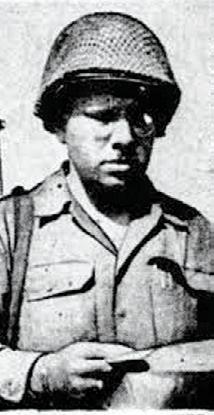
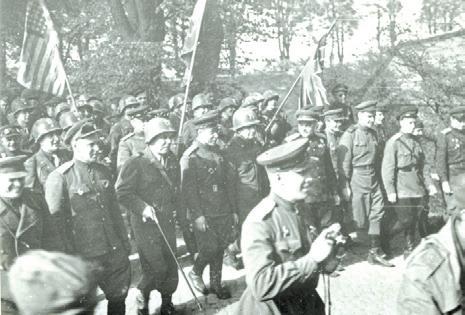
An American army officer who surveyed the scene said that the two marines saved the division’s rear and the beachhead from being overrun.
These stories of these Forgotten Heroes have been written down in annuls of the Jewish War Veterans. Many of these stories have been written about in books, and their service records are filled with incredible stories that is history to be remembered.
Avi Heiligman is a weekly contributor to The Jewish Home. He welcomes your comments and suggestions for future columns and can be reached at aviheiligman@gmail.com.
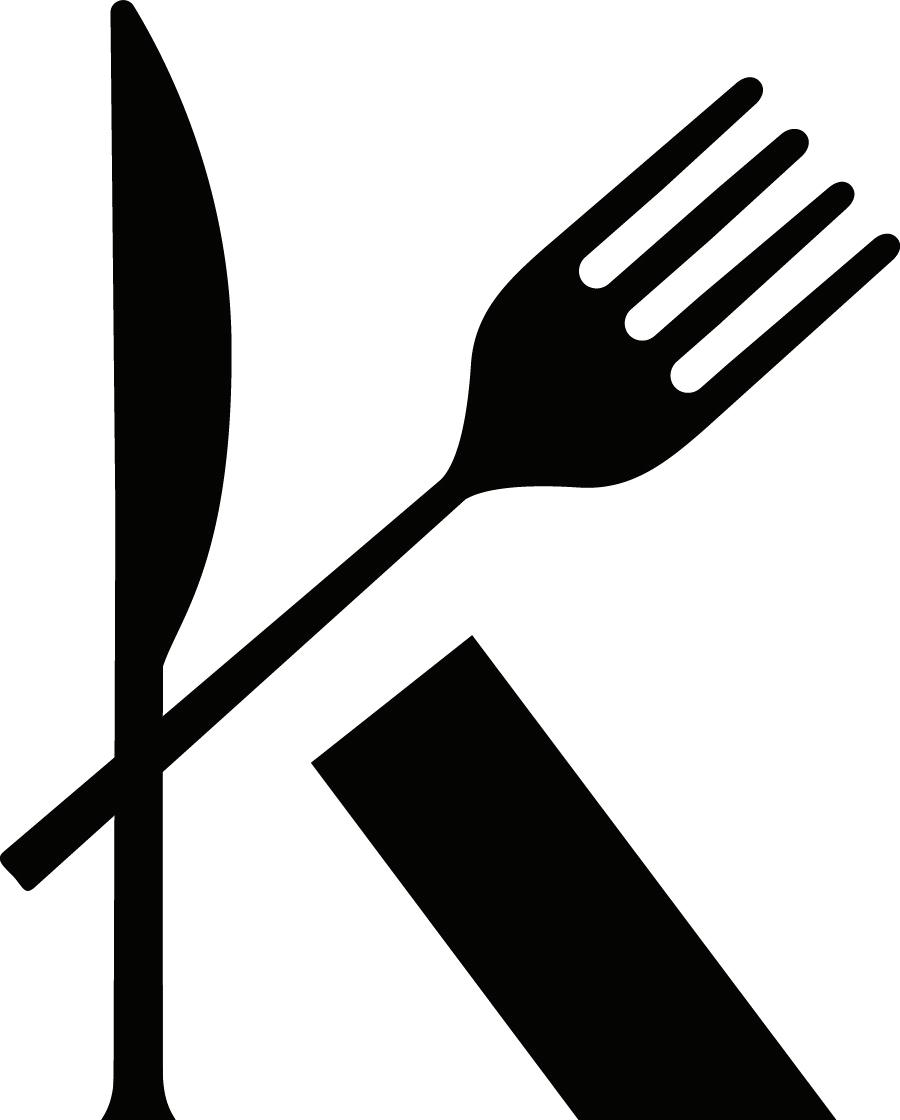

By Rabbi Azriel Hauptman
Our Sages teach us (Avos 1:2) that the world is supported by three pillars: Torah, serving Hashem, and acts of kindness. The Maharal explains that these three pillars correspond to the three areas that a person must perfect: his relationship with himself (Bein Adam Li’Atzmo-Torah), his relationship with Hashem (Bein Adam La’Makom-serving Hashem), and his relationship with other people (Bein Adam Li’Chaveiroacts of kindness). These three pillars are also reflected in the three ways that a per-


son’s personality is manifested: self-worth (Bein Adam Li’Atzmo), self-esteem (Bein Adam La’Makom), and self-confidence (Bein Adam Li’Chaveioro).
Let us begin with self-worth. This is the amount of worth and value you see in yourself from the mere fact that you are a human being. A healthy person who looks at another person will view that person as someone who deserves respect and dignity due to the mere fact that they exist. If you feel that way about yourself, you have a high level of self-worth. This is the attribute of Bein Adam Li’Atzmo, where the focus is on how you relate to yourself just for who you are.
Self-esteem focuses on how accurately you assess your abilities, talents, and skills. Let us imagine a person who is an accomplished writer who produces on a highly professional level. If he or she can not accurately assess their own abilities and are constantly imagining that they are much less skillful than they really are, that is considered low self-esteem. In essence, they are holding themselves in a lower esteem than is reflected by reality. This attribute corresponds to Bein Adam La’Makom. A person wants to live up to his divine calling and live his life properly. To the extent that he or she properly assesses their success in this area is based on their accuracy of their self-esteem.
Self-confidence is a person’s ability to interact with the world based on their abilities. Sometimes, a person has a realistic assessment of their own abilities, but when interacting with the world they are stricken with anxiety and lose their confidence in themselves to execute their potential. A person’s ability to engage with the world with confidence is the attribute of Bein Adam Li’Chaveiro

All of these three attributes need to be at healthy levels in order to properly function in this world and feel happy. For example, if someone has an unhealthy level of self-worth, they will feel like an empty shell. Feeling unworthy of being respected and loved leaves a person feeling pain in their heart that all of the accomplishments in the world will not be able to cure.
A healthy self-esteem is also critical for one’s life, since one cannot properly
assess their own abilities, skills, and talents unless they can look at themselves objectively, almost as if they were looking at a third person.
Where does humility fit into all of this? The truth is that one can have a high sense of self-worth, a healthy self-esteem, and excellent self-confidence, and still be a humble, respectful, and self-effacing person. We can even go one step further and say that one can only be truly humble unless one excels in these three areas. The reason is as follows.
When one feels unloved and unworthy, a person starts to feel a strong obsession to fill that hole. How exactly does one do that? Primarily through degrading others or developing artificial ways to feel superior or worthy. This essentially is narcissism. That frightening character trait that destroys relationships and tears apart the very fabric of society.
This is the reason that there are so many sources in the Torah and Chazal that expound upon the trait of Ga’avah. Ga’avah does not mean feeling unlovable or improperly assessing one’s abilities. In fact, as we mentioned, it is feeling unlovable and unworthy that is the greatest catalyst for Ga’avah. Rather, Ga’avah is the feeling that you are inherently better than the other person and that everyone needs to know that. This is diametrically opposed to the notion of self-worth that states that everyone is equally deserving of being valued and loved from the mere fact that they exist.
True humility actually requires a lot of courage. The knowledgeable person who still recognizes that there is so much to still learn, the accomplished person who does not feel more entitled, and the respected person who never forgets to greet people they pass on the street are all people who are both humble and strong. A healthy self is indeed one that is best protected against an onslaught of Ga’avah.
This is a service of Relief Resources. Relief is an organization that provides mental health referrals, education, and support to the frum community. Rabbi Yisrael Slansky is director of the Baltimore branch of Relief. He can be contacted at 410-448-8356 or at yslansky@reliefhelp.org

By Bassy Schwartz, LMFT
Elul carries a certain electricity. The air feels charged with urgency and possibility. We all know the messaging this time of year: it’s time to grow, to change, to take on big kabbalos, to prove ourselves worthy of another year.
There’s something inspiring in that call. Big resolutions make us feel strong and capable, like we are showing Hashem that we’re ready to be different. But there’s also a shadow side. Sometimes, those dramatic commitments don’t last. Sometimes, even when they do, they don’t address the root issue. And often, we’re left wondering: why do I keep circling back to the same patterns, the same struggles, year after year?
This year, I want to suggest a different way of thinking about teshuva; not as a radical leap, but as a slow chain reaction. Not as a single dramatic pivot, but as an assembly line. In this line, no piece activates until the previous piece has done its work. And the very first piece? It’s not about your behavior. It’s not even about your resolutions. It’s about your core wounds – the drivers beneath the surface that quietly, powerfully influence every choice you make.
The Rambam describes Teshuva Gemura as reaching a point where you are so internally transformed that when faced with the same test, you do not stumble again. On the outside, that looks like unshakable resolve. But from a psychological perspective, Teshuva Gemura is not simply willpower. It’s what happens when we loosen the grip of what pulls us away from our values in the first place.
Most of us experience teshuva in a more surface-level way. We feel regret: I messed up. We reflect, maybe do a cheshbon hanefesh. We commit: I won’t do this again. That’s sincere. That’s meaningful. What I’m about to say may surprise you, but hopefully it will also be your guiding light: that process, while good, is often not enough.
Not because you don’t care. Not because you’re not spiritual enough. But because
that process skips over the part of yourself that made that choice in the first place. You didn’t yell at your child, speak lashon hara, or avoid an important commitment because you’re “bad,” “broken,” or “unfixable.” You made that choice because, in that moment, your body, your mind, or your spirit believed it was the best way to get somewhere you desperately needed to go.
Let me give you an example. Imagine a woman who often finds herself snapping at her husband. Every Elul, she regrets it. She takes on a new kabbalah: I will bite my tongue. I will count to three. I will learn shmiras halashon daily. Noble efforts! But inevitably, the snapping comes back.
Because beneath that “bad behavior” lies a driver. Maybe her snapping is her nervous system’s attempt to protect her from feeling ignored. Maybe it’s the only way she has learned to get her husband’s attention. Maybe it’s an echo of her childhood, when raising her voice was the only way she felt seen.
Her behavior is destructive, yes. But it also makes sense. It’s not random, and it’s not proof that she is a failure. It’s an earnest attempt to meet a need.
When she can pause long enough to ask: What purpose is this serving? What need is my snapping trying to meet? that’s when the assembly line clicks into motion. Once she makes friends with the need (in this case: connection, validation, safety), she can start meeting it differently. Maybe by expressing vulnerability instead of anger. Maybe by scheduling intentional time to talk with her husband. Maybe by learning to self-soothe before reacting.
The “unwanted” behavior slowly fades, not because she willed it away, but because it’s no longer necessary. The driver has found a better path. This is why the only way to truly transform is to get to know those drivers. They hold the

key to your growth. They hold the key to your happiness.
We often think happiness means being free of discomfort. Unfortunately, there is no such thing as a life void of pain, loss and discomfort. Therefore, it must be that happiness is not about avoiding pain. Happiness is about alignment – living authentically, choosing with intention, and allowing even your low moments to have integrity.
When we partner with our drivers, when we hear their case and meet their need in constructive, secure ways, the dominos begin to fall. Goodbye unwanted behavior; hello desired behavior. No more needing to malfunction just to get a basic need met. That’s when Teshuva Gemura happens.
So this Elul, I want to invite you to resist the pressure for a radical overhaul. Don’t choose a kabbalah that makes your inner self feel blamed, shamed, or rejected. Don’t set yourself up for a cycle of unrealistic promises and inevitable disappointment.
Instead, pick something small. Find a single part of your life that feels off-kilter, misaligned, or damaging. Maybe it’s the way you assume things and speak about others. Maybe it’s the avoidance of a mitzvah that overwhelms you. Maybe it’s the endless scrolling that leaves you empty.
Sit with that part of yourself. Ask: Why might I function this way? What purpose does this serve? What need is it trying to meet – security, belonging, support, acceptance, control, comfort?
Then (here’s the turning point) make friends with the need. Validate it. Thank it for showing you what you’re longing for. And then, experiment with meeting
it differently. Meet it in a way that aligns with your values. Meet it in a way that supports the kind of life you want to live, the kind of Jew and human you want to be. That, my friends, is the assembly line. One shift at a time. One domino tipping into the next. Progress that is gentle, real, and sustainable.
This Elul, don’t pressure yourself into becoming someone unrecognizable overnight. Hashem doesn’t want a shiny, polished stranger standing before Him on Rosh Hashanah. He wants you. The real you. The aligned you. The you who is willing to understand yourself deeply enough to let go of what no longer serves and embrace what does.
May we all merit the courage to sit with our wounds, the clarity to hear our needs, and the strength to align our behaviors with our highest values. And may that authentic inner work bring us into the new year with a teshuva that is not only gemura but also gentle, grounded, and profoundly whole.
Bassy Schwartz, LMFT, a licensed Marriage and Family Therapist, trained in Emotionally Focused Therapy, brings a compassionate and unique approach to her practice – focusing on couples and individuals dealing with conflict and disconnection due to childhood emotional neglect and complex family dynamics. Bassy empowers clients to harness their inner strength and authentic selves to achieve meaningful relationships beyond what they could have ever imagined. Reach her directly at bassy@corerelationships. com or WhatsApp (347) 309-5362.

Fi yuo cna raed tihs, yuo hvae a stgrane mnid too. I cluodn’t blveiee taht I cluod aulaclty uesdnatnrd waht I was rdanieg. The phaonmneal pweor of the huamn mnid, aoccdrnig to rseaecrh at Cmabrigde Uinervtisy, sohws taht it deosn’t mttaer in waht oredr the ltteers in a wrod are, as lnog as the frist and lsat ltteer are in the rghit pclae. The rset can be a taotl mses and you can sitll raed it wthiout a porbelm, bceusae the huamn mnid deos not raed ervey lteter by istlef, but the wrod as a wohle. Tihs pheonmeon epxlains why we are so fsat at raednig, eevn wehn we mkae msitkaes, and why teher is so mcuh felxibiltiy in lnaguage. Smoteiems, the mesagse is claerer wtih srupirsnig ease, eevn wehn sneetcnes are lnog, cmopelx, and cnoatin mnay dfifeernt wrods. As lnog as the oevrall sturctru e mkaes snese, yuor bairn wlil fill in the gaps and croerct the erorrs wtihout yuor eevn konwing. Tihs is one of the raesnos we can raed qciukly, why typos in txets or e-mlias don’t awlyas dtrisact us, and why the huamn bairn is one of the msot pwoerufl ‘pattren mtahcres’ in the wlrod.


















Silent letters are just trolls hiding inside words.

The word “queue” is just the letter Q with four silent bodyguards.


“February” exists only to check if you’re paying attention.
Autocorrect doesn’t fix spelling — it invents new, wrong words faster.
“Colonel” sounds like popcorn but looks like a general.
“Receipt” keeps the P just to annoy you.
No one has ever spelled “rhythm” correctly on the first try.
Half of English spelling rules are just lies teachers tell kids.
When you finally learn to spell “miscellaneous,” you’ll never need it again.
“Psychology” is proof that P’s are sneaky.
Spell-check has saved more reputations than lawyers.
The more important the email, the higher the chance you’ll misspell “attached.”
The more you hesitate before writing a word, the more likely you are wrong.
Every spelling bee contestant secretly hates “onomatopoeia.”
“Bologna” looks like a city in Italy but tastes like lunch.
Nobody knows if it’s “canceled” or “cancelled,” so we all cancel plans instead.
“Ph” is just F in a fancy outfit.
If you spell “their/there/they’re” wrong, someone will correct you within 5 seconds
“Cough,” “rough,” “though,” and “through” prove English is chaos.
>> The European Commission has just announced an agreement whereby English will be the official language of the European Union rather than German, which was the other possibility.
>> As part of the negotiations, the British Government conceded that English spelling had some room for improvement and has accepted a 5-year phase-in plan that would become known as “Euro-English.”


>> In the first year, “s” will replace the soft “c”. Sertainly, this will make the sivil servants jump with joy. The hard “c” will be dropped in favor of “k”. This should klear up konfusion, and keyboards kan have one less letter.
>> There will be growing publik enthusiasm in the sekond year when the troublesome “ph” will be replaced with “f”. This will make words like fotograf 20% shorter.
>> In the 3rd year, publik akseptanse of the new spelling kan be expekted to reach the stage where more komplikated changes are possible.
Jimbo is in a spelling bee.
Judge: Spell “orange.”
Jimbo: The fruit or the color?
>> Governments will enkourage the removal of double letters which have always ben a deterent to akurate speling.
>> Also, al wil agre that the horibl mes of the silent “e” in the languag is disgrasful and it should go away.
>> By the 4th yer, peopl wil be reseptiv to steps such as replasing “th” with “z” and “w” with “v”.
>> During ze fifz yer, ze unesesary “o” kan be dropd from vords kontaining “ou” and after ziz fifz yer, ve vil hav a reil sensi bl riten styl.
>> Zer vil be no mor trubl or difikultis and evrivun vil find it ezi TU understand ech oza. Ze drem of a united urop vil finali kum tru.
>> Und efter ze fifz yer, ve vil al be speking German like zey vunted in ze forst plas.

They killed Charlie because he preached a message of patriotism, faith and of G-d’s love. They should all know this— if you thought my husband’s mission was powerful before, you have no idea. You have no idea what you have unleashed across this country and this world. You have no idea the fire that you have ignited within this wife.
- Erika Kirk in her first public statement after her husband’s political assassination, promising that the mission will go on
When things are moving very fast and people are losing their minds, it’s important to stay grounded. Turn off your phone…spend time with friends, and remember internet fury is not real life. It’s going to be OK.
- Utah Governor Spencer Cox (R) quoting Charlie Kirk at a press conference about his assassination
Social media is a cancer on our society right now. I would encourage people to log off, turn off, touch grass, hug a family member, go out and do good in your community.
- ibid.
In the United States of America, we have freedom of speech. I understand that in Somalia, where you come from and would do well to go back to, this isn’t a thing. In our county, having political disagreements with someone isn’t a reason to justify their execution.
- Rep. Lauren Boebert (R-CO) responding to Ilhan Omar laughing about Charlie Kirk being assassinated
Hannah Einbinder’s Emmy speech was a performance of ignorance, not courage. She said nothing about peace, nothing about ending the war, and nothing about the hostages still suffering in Gaza. To claim Jews can be separated from Israel is an insult to our history and faith, as more than seven million Jews live there and every Jew in the world faces Israel when we pray. Prayers and philosophies about the Land of Israel exist throughout every facet of Judaism. For thousands of years, we refer to our collective as “the nation of Israel.” If Hannah truly cares about justice, she should come to Israel, look Jews, Christians, and Muslims in the eye, and see how peace is achieved in front of her own eyes”
– Emmy-Award winning actor Yuval David responding to a Hollywood actress who addressed an awards show saying, “I feel like it is my obligation as a Jewish person to distinguish Jews from the State of Israel.”
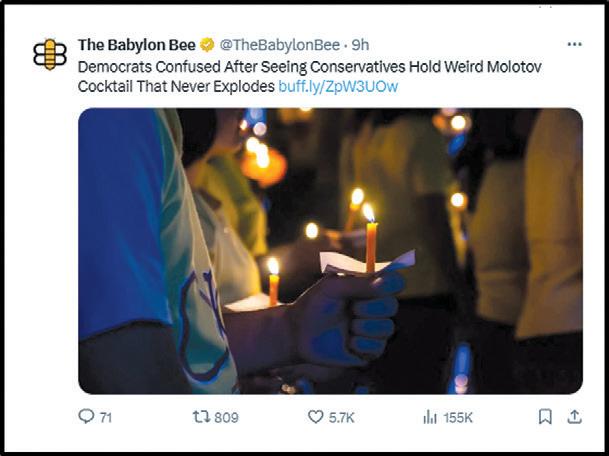

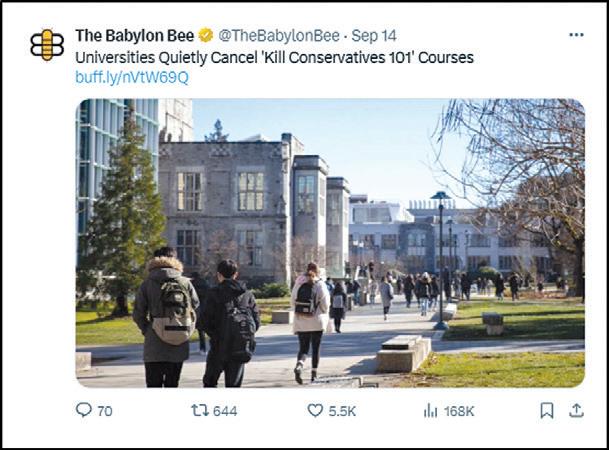
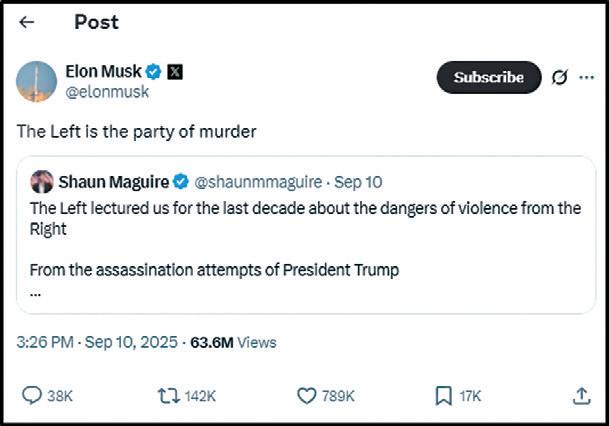
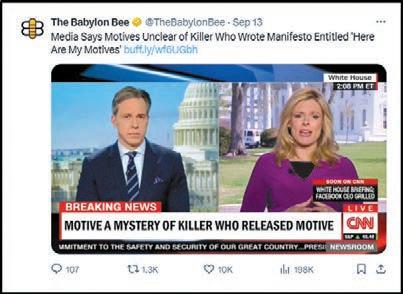
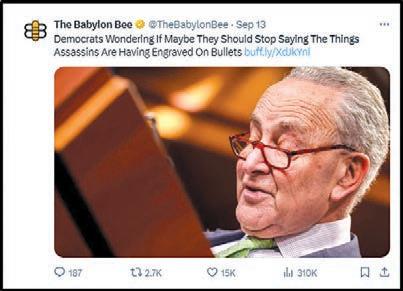

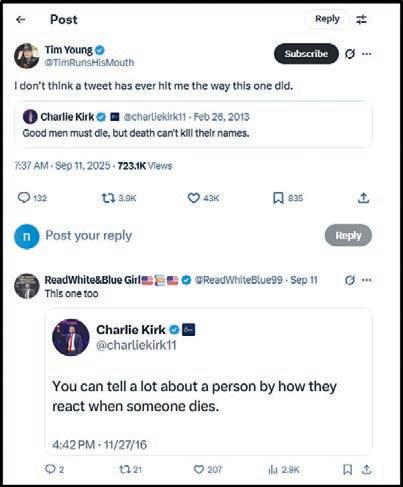
Congresswoman Occasion-Cortez is a creation of the media. She checks all the boxes – she’s young, she’s liberal…she’s ethnic. Her problem is that she is as shallow as a puddle.
-Sen. John Kennedy (R-LA)
To stand here today on the very road, where not 2,000 years ago, so many from everywhere ventured to fulfill that desire to be closer to the creator is a humbling and honoring experience. As you go through the layers of history, you realize that all the civilizations that conquered this city, all the ones who tore it down and built on top, are all gone. The Roman Empire is no more, nor any of the others that sought to conquer and rule this land. But one people remain. They have returned. For G-d’s promise is eternal, and it is perfect, and His word is always true. And I’m honored to be a part of its fulfillment here with you tonight.
- Secretary of State Marco Rubio at a ceremony celebrating the opening of a roadway which served as the main road to the Beis Hamikdash
If I forget you, O Yerushalayim, may my right hand forget its skill. The Jewish people never forgot that this was their land, their home, their undivided, indisputable indigenous capital from eternity. Tonight, the stones are crying out. The crowds may say it, but the stones absolutely and 100% validate that the Jewish people not only belong here now, but they have belonged here for 4,000 years since the time G-d said to Abraham, “This is yours.”
- U.S. Ambassador Mike Huckabee at the event
The assassination of Charlie Kirk is bringing out some of the best in humanity and it’s also exposing some of the worst. The unification, love, support, and outcry on his behalf throughout the world is heartwarming. The number of people supporting Tyler Robinson’s appalling behavior has opened my eyes to a side of extremism with a moral superiority complex that has also shaken my belief in people in general. I hope they are held accountable for their disgusting rhetoric.
- Professional golfer Phil Mickelon
It’s the death of free speech, to think that you are so illiterate and so stupid you can’t answer verbally, and you have to shoot somebody with a gun to win the argument.
- Former Tonight Show host Jay Leno in a radio interview shortly after Charlie Kirk was assassinated
This is a political assassination of a man who I didn’t necessarily agree with, but I certainly enjoyed listening to... I mean, we’re at a point in this country where, if you don’t agree with everybody on everything, you take out a gun and you shoot them?
- ibid.


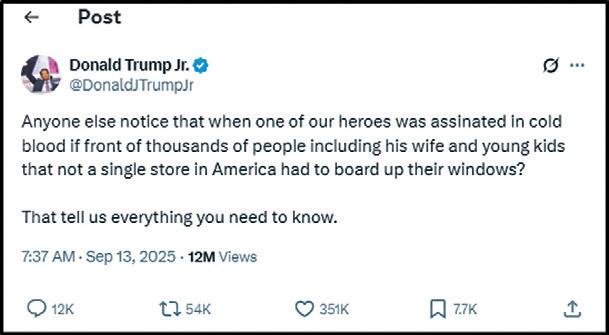
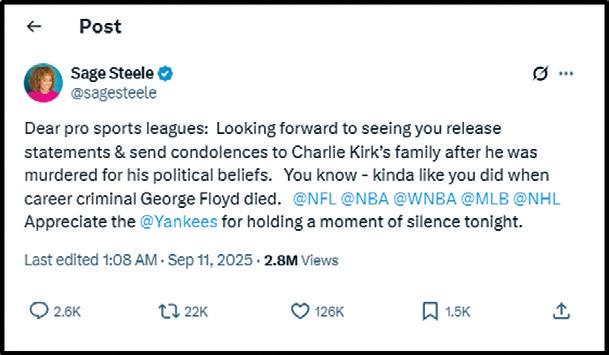
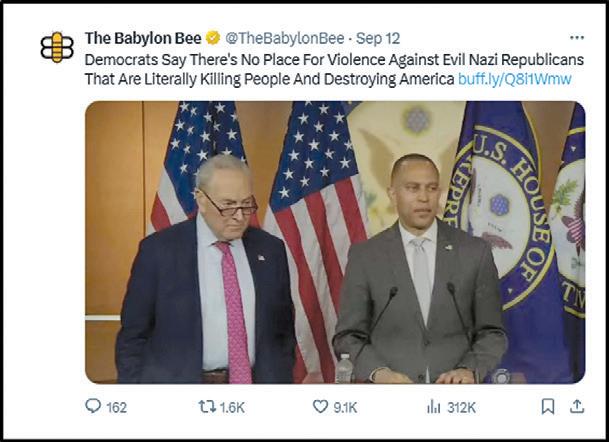
Sen. Tom Cotton manhandling an Al Jazeera reporter who approached him in the halls of Congress and challenged him on Israel:
REPORTER: Would you use Hamas to justify a famine?
SEN. TOM COTTON (R-AK): There is no famine in Gaza.
REPORTER: The world’s leading experts on famine…have declared it a famine. Are you saying that they are wrong?
SEN. COTTON: The world’s leading experts are clowns. They are antiSemites and anti-Zionist.
REPORTER: You are asking the world to not believe with their own eyes on video?
SEN. COTTON: What? They see a child that has a terrible affliction but is not malnourished while a bunch of fat terrorists sit right next to him off camera…
REPORTER: So what would you say to the people of Gaza that are trying to get food and are facing Israeli bullets to get there?
SEN. COTTON: I’d say, I’m sorry that Hamas continues to terrorize its own people. What do you say about working for a terror sympathizing network.
REPORTER: Do you justify genocide?
SEN. COTTON: You mean the October 7 attacks against Israel.
REPORTER: It’s been going on long before October 7.
SEN. COTTON: Yes, it’s been going on for decades.
REPORTER: Since 1947.
SEN. COTTON: Efforts to eliminate the Jewish state? Yes.
REPORTER: There wasn’t a Jewish state in 1947. There was Palestine.
SEN. COTTON: Palestine is a made up fiction.
So many things have been learned about [the shooter] so quickly. He’s become totally radicalized and crazy, and it must have been traumatic, because the parents are conservative people, supposed to be very nice people living in Utah. The father turns in the son. Boy, that’s a tough deal.
- Pres. Donald Trump talking about Charlie Kirk’s assassination
















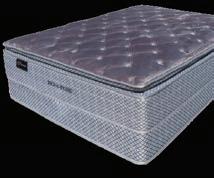
Moderated by Jennifer Mann, LCSW of The Navidaters

I love reading your column every week! I figured I would pose this question to you and see if you can give me some advice.
I’ve been dating for a few years, so I am very excited to be dating someone who I really like. We are getting along really well, and he’s a great guy.
Here’s my concern: I know that he is very different than his family. When I asked information about him before we dated, I heard that his family is very “out of the box.” When I asked more people, I heard that his parents very “weird,” perhaps on the spectrum.
That didn’t dissuade me from going out with him. I am experienced and mature enough to know that if a good guy comes along, I can’t be picky about his family.
That being said, now that we are dating, I am finding myself very uncomfortable with this scenario. I met the parents last week, and I can tell that they are not the norm. The mother talks very loudly and dresses interestingly and asked me questions that were a bit out of the ballpark.
My concern is that when someone gets married, you end up going to parents and in-laws for yom tov or Shabbosim and for gettogethers. I see that they will end up being part of my life, and I am not completely onboard with that.
Still, I really like this guy. He has amazing qualities, and we are really getting along wonderfully. I don’t want to lose him.
What advice can you give me to help me reconcile this situation in my mind?
Thanks,
Sarah*
Disclaimer: This column is not intended to diagnose or otherwise conclude resolutions to any questions. Our intention is not to offer any definitive conclusions to any particular question, rather offer areas of exploration for the author and reader. Due to the nature of the column receiving only a short snapshot of an issue, without the benefit of an actual discussion, the panel’s role is to offer a range of possibilities. We hope to open up meaningful dialogue and individual exploration.

Dear Readers,
We want to offer YOU an opportunity to be part of the discussion! Please email us at MichelleMondShadchan@gmail.com, subject line “reader’s response,” if you would like to participate in the new “A Reader’s Response” columnist spot. We will send you a question and publish your answer in an upcoming Navidaters edition.
If you have a question you would like the Navidaters to answer, please reach out to this email as well.
Looking forward!
Michelle, the “Shadchan”
Rebbetzin Faigie Horowitz, M.S.
Sarah, the identifiers you are using for the young man’s family are troubling to me. They are vague and sound like they come from a local yenta. They sound very judgmental. You have not identified them at all. This concerns me.
If you have difficulty dealing with the idea of potential family members who don’t fit into your boxes, will you have the maturity to deal with another person, good qualities as well as others? Will you be able to handle things that life inevitably brings your way? Do you have the maturity to deal with less-than-ideal people, situations, and styles? Obviously, if you like the young man, you understand that you are getting a package along with his personal

strengths and positive attributes. Can you find some positive attributes in his family? Are you able to invest some time to get to know them and see some positive qualities? Are you able to give up some of your comfort level short term (and long term) for the sake of the young man? Do you think he will need to adjust to your family and will be completely comfortable with them? Have you discussed family differences with the young man? Have you worked out other differences?
Michelle Mond
Congrats on meeting a guy you really like! As you know and have experienced, this is no small feat.
Part of life is learning to navigate different types of people. These people won’t always be similar to you, but they will be important figures in your life. You must



The more you focus on your husband and on your shared values, the less power his parents’ quirks will have over your happiness.
learn to be accepting of others even when they come across as “weird.” You can navigate your relationship with them by being cordial and friendly yet also making boundaries.
Focus on your relationship with the guy you are dating. Make sure he is the right fit

for you. Talk with each other about each of your families and how you would navigate things similar or differently than your upbringings. Make sure to spend some time with his family such as Shabbos meals, in order to make sure they are genuinely nice people. It could be that they are a bit “off” and strange but still nice people. It’s not worth throwing out a good relationship because of this.
Make sure to take your time and get to know them well before making any drastic decisions.
Dr. Jeffrey Galler
It’s very exciting to finally find an incredible guy who might be “the one.” Your boyfriend sounds amazing, especially considering that he grew up in a household with parents who are as you’ve described. You come across as an intelligent, amazing young lady who has decided, very maturely, to focus on the young man and not on his parents. Your thinking is absolutely correct, because you will be spending the majority of the rest of your life with your husband, and not with his parents.
That being said, however, his weird parents will be a part of your life, whether you like it or not.
The questions then are: first, how much of a problem will that be for you, and second, what can you do to lessen the impact of these in-laws on your quality of life?t
First: How much of a problem can their behavior cause you? The simple-sounding answer is that it depends on how much you let it bother you. Some folks can be highly sensitive to “out-of-the-box” family behavior, while others can shrug and roll with it. You might feel embarrassment, surprise, or even frustration, especially in public or during family gatherings. That’s normal.
But remember, the more you focus on your husband and on your shared values, the less power his parents’ quirks will have over your happiness. Their behavior will only become a “problem” if you let it distract you from your relationship, or if you constantly let it make you feel uncomfortable.
Second: How to lessen their impact on your life? Here are some suggestions and strategies:
• Set boundaries. They will be part of your and your children’s lives, but you don’t have to live next door to them. You can arrange manageable visits, perhaps of shorter duration, on holidays and special occasions.
• Find the humor. Reframe their quirky behavior as endearing rather than
The Navidaters
Dating and Relationship Coaches and Therapists
Hi Sarah, I can hear how much you like this man and how excited you are about what you’re building together. That’s beautiful, and it makes sense that meeting his family stirred up a lot of thoughts.
Sometimes, we carry quiet expectations about what a partner’s family “should” be like. When reality looks different – loud-
er, quirkier, less familiar – it can feel unsettling. But dif- ferent isn’t automatically bad.
• A few things you might explore for yourself:
• When you imagine a future with him, what truly matters for your happiness?
stressful, because sometimes the very things that feel strange at first can become lovable traits over time. And if you can laugh at a strange comment or outfit, it diffuses tension and keeps the peace.
• Avoid making it a point of contention with your husband. Bizarre as his parents might be, they raised him, and he loves them. So, instead of criticizing or complaining about them, show him that you, too, love them, and go out of your way to keep shalom in the family.
• Fake it. When you’re with your in-laws, put on your happy face and keep smiling until your jaw muscles ache. Respond to inappropriate questions, behaviors, or comments with calm, warm, gentle, friendly responses.
Finally, having to navigate life with weird in-laws is not a deal-breaker. They may cause small moments of discomfort, but with boundaries, humor, love, and understanding, you can greatly reduce their impact on your life. Your marriage can withstand, and even flourish, despite marrying into a somewhat unconventional family!
Chava Cohen
You write that you are “experienced and mature enough to know that if a good guy comes along, I can’t be picky about his family.”
This really does say a lot about your
Families can be wonderfully imperfect.
self-awareness and insight! This is not to be taken for granted.
The reality is, when you are married to someone, their family is in your life to one degree or another. This depends on logistics such as where you live and distance to them, but also on the emotional connection and quality of the relationship. The degree to which couples and families are involved in each other’s lives can vary widely.
It is hard to go into a relationship with the knowledge that a relationship with his family may be a difficult one. That is not something that can go away. You can choose to focus on their positive qualities and build as much of a relationship with them as possible. It may mean mourning the loss of the picture you had of your “inlaws.” Rest assured that every relationship means adjusting the ideals and expectations to the very real people in the relationship. We don’t always know what other people struggle with. (Your friend may have had her heart set on marrying someone who is 6’3”/would live in Israel/have a professional background…and has to readjust her expectations similarly.) With that, you are in the same boat as everyone else, even those with “dream” in-law families.
• Which of your feelings come from real discomfort (like feeling unsafe or disrespected) and which might be more about outside ideas of “normal”?
• Could you and he create your own rhythm for holidays and visits that honors both your relationship and your comfort?
It may help to talk openly with him, without judgment, about how you felt after meeting his parents. You don’t have to decide anything now. Keep noticing how you feel when it’s just the two of you. If
that space still feels kind, safe, and full of possibility, that’s telling.
Families can be wonderfully imperfect. The question is whether you and your partner can face the quirks together and keep choosing each other. My hunch is your own clarity will come from watching how he shows up and how you feel in this relationship, more than from anything anyone may say.
With care, Jennifer
Jennifer Mann, LCSW is a licensed psychotherapist and certified trauma healing life coach, as well as a dating and relationship coach working with individuals, couples, and families in private practice at 123 Maple Avenue in Cedarhurst, NY. To set up a consultation or to ask questions, please call 718-908-0512. Visit www.thenavidaters.com for more information. If you would like to submit a dating or relationship question to the panel anonymously, please email JenniferMannLCSW@gmail.com. You can follow The Navidaters on FB and Instagram for dating and relationship advice.
By Miryam Werdyger and Sarah Ziet
This article is all about shining a spotlight on the experiences of singles 30+ in the frum world. It’s like a mixtape of insights and heart, and we’re doing this with compassion, not to judge, because who needs that?
The goal is to move beyond the surface and delve into the nuances, challenges, and quiet triumphs that define this life stage.
The Unique Challenges of Dating Over 30
Let’s be honest… In the frum community, where marriage and family are central pillars, being single as you get older can feel like trying to find wi-fi in the wilderness –it’s tough!
With all eyes on the “next step” – marriage – many single people might feel like they’re playing a game of hide and seek, but they’re not hiding. They’re awesome and just often overlooked.
The challenges they face are no joke.
“Once you hit 30, it can feel like you’re in a movie where everyone is getting married and you’re on the outside looking in, feeling like you’ve been tagged with the ‘nebach’ label.”
Let’s be honest – that hurts! This sense of being left behind is often compounded by a feeling of societal pressure.
Dovid, a single man in his mid-30s, feels like his life is on hold, while his peers are buying homes, raising children, and advancing in their careers.
Similarly, Shira, 32, a single woman, feels the sting of seeing her younger friends and cousins get married and start families, while she is still navigating the dating world. This isn’t just a personal feeling; it’s a social reality that can create a sense of isolation and otherness.
Beyond the Resume: The Search for Authentic Connection
Shidduchim is still the go-to method for finding a spouse, but many singles 30+ are craving something more authentic. They want connections that feel real, not like swiping right on a resume! The tra-

ditional system, while effective for many, can feel impersonal, and the focus on “stats” can be draining. Singles are often presented with a brief profile – a person’s age, hometown, education, profession, and religious observance – and expected to decide if they want to meet.
This process often overlooks the richness and depth of a person’s character,
call for a more personalized, human-centered approach.
For many, the current system can feel like a one-size-fits-all model in a world that is increasingly individualistic. Singles are often looking for shared values, intellectual compatibility, and a genuine emotional connection that can’t be captured in a picture and a few bullet points.
They are advocating for a shift in perspective, one that recognizes that singles are vibrant, valuable members of the community.
humor, and passions. It’s no wonder that many singles feel frustrated. They want to be seen as whole people, not just a list of attributes. And let’s not forget the well-meaning shadchanim who sometimes forget to have a conversation before they start handing out profiles. “Come on, folks! We’re people, not LinkedIn profiles!” This sentiment isn’t an attack on the shadchanim or the system itself but a
Despite the challenges, there are many singles pushing for understanding, respect, and inclusion. They’re all about sharing with the community about what it’s really like to be single. These singles are challenging the notion by some that single people are incomplete or are somehow “less than.” They are advocating for a shift in perspective, one that recognizes that singles are vibrant, valuable mem-
bers of the community.
Some are even on a mission to create chilled social settings where singles can mingle without feeling like they’re on a blind date with a PowerPoint presentation!
These initiatives range from community single-focused events to trips and retreats to workshops and more.
The idea is to create spaces where singles can meet organically and authentically rather than being limited to the structured and often high-pressure environment of formal dates.
Looking Ahead: Creating an Environment of Understanding
As we look ahead, it’s time to consider rethinking the dating game. Let’s transform our practices and make it easier for singles to find their life partner. It’s all about keeping the conversation ongoing and current and asking the question “are you listening?” to what singles are really saying.
By opening up these lines of communication, we can create an environment of understanding and empathy.
The good news? There’s a growing awareness that change is needed, and with awareness comes change!
It’s about shifting the communal focus from “are you married yet?” to “how can we do things differently?”
So, let’s keep the buzz around singlehood alive and thriving, confronting those negative perceptions while creating an environment of understanding.
What do you think is the biggest misconception about being a single person 30+ in the frum community?
We’d love hear from you!
Miryam Werdyger and Sarah Ziet are Certified Life Coaches and mentors specializing in effective communication skills for individuals, couples, groups and singles navigating the dating world. They can be reached at coachmiryam@icloud.com or via WhatsApp/text at 516-924-7695.
(NOT ANYMORE)

By Aliza Beer MS, RD, CDN
Rosh Hashana spans two full days, which means several large meals, often late at night and again during the day. With so much food and frequent eating, it is easy to overdo it. Taking a balanced approach to these meals helps prevent the discomfort that often follows heavy eating, while still allowing enjoyment.
An effective strategy to healthy eating is to pay attention to the timing of meals. Since the night meals are often later in the evening, lighter choices are best at night, with heavier dishes reserved for the daytime when digestion is more active.
At the day meals, larger portions of protein such as poultry, fish, or lean meat, along with hearty vegetable dishes, are appropriate. These foods provide the sustenance and energy needed during the longer, more active part of the day. The nighttime meals can emphasize smaller portions, lower fat/lean proteins, and vegetable-forward sides. For example, this can include baked salmon, a soup, or a green salad. Rather than serving heavy potato dishes or rice, the evening table can highlight colorful roasted vegetables, beets with citrus, or a chopped Israeli salad.
Because each meal begins with hamotzi, bread is always included, making carbohydrates a guaranteed part of every table. However, it is important to remember that not all breads are the same nutritionally. Options such as sourdough, whole wheat matzah, whole wheat pita, or whole-grain challah provide more fiber and nutrients, which promotes satiety and helps balance blood sugar. Sweet, round challah is customary for Rosh Hashana and therefore can be enjoyed in modera-

tion, but it is wise to keep portions small.
While there are many healthy options out there, it is important to consume them moderation and avoid overindulgence in this area. A great tip is to avoid or minimize dips, since they only lead to overconsumption of the bread!
Another area where meals can easily become excessive is with appetizers. Traditional starters such as meatballs or stuffed cabbage, while delicious, are often heavy and provide the same nutrients as the main course, leading to excess calories before the meal has even begun. Instead, consider serving a lighter starter such as a seasonal vegetable soup or a simple salad. The reality is that the body only needs a certain amount of energy at a time, and any calories eaten beyond that, whether from carbs, fats, or even protein, are stored as fat. Extra portions don’t “just disappear” because they
came from a good source; the body saves them. By skipping the heavy appetizer and choosing a lighter first course, you can enjoy the main meal without adding unnecessary calories.
Rosh Hashana meals often feature red meat dishes such as beef, lamb, or veal. However, red meat is higher in saturated fat, which contributes to increased risk of heart disease, inflammation, and weight gain, than poultry and fish. Limit your red meat consumption to no more than one meal a day over the chag.
Poultry options such as skinless chicken or turkey, or fish such as salmon, trout, or Bronzino, provide excellent sources of protein with far less saturated fat. Try to serve at least one of the four meals with just fish as the main source of protein, with some healthy light sides such as soups and salads. By shifting the focus away from red meat and toward leaner
proteins, the meal becomes healthier and easier to digest.
One of the simplest ways to make meals healthier and less caloric is to place the emphasis on vegetables. Bread already ensures the presence of carbohydrates, so additional sides should not be dominated by starches. Serving roasted seasonal vegetables, fresh salads with herbs and pomegranate seeds, or lighter kugels/quiches made from zucchini, carrots, or cauliflower provides variety, color, and flavor without excessive calories. Limiting starchy dishes to one small portion per meal allows the vegetables to be the main focus, which balances the meal without making it feel restrictive.
Dessert is often anticipated as the highlight of the meal, but it doesn’t have to be heavy to be fun and delicious. Fruit-based desserts such as baked apples, poached pears, or a fruit compote with cinnamon offer natural sweetness with fewer calories. Honey cake or honey cookies, a classic of Rosh Hashana, can be enjoyed in moderation, especially when made in healthier versions. Fresh fruit platters or a few squares of dark chocolate also provide an elegant finish.
Serving desserts in smaller portions allows everyone to enjoy themselves without leaving the table uncomfortably full.
Portion control is often easier said than done during the chagim, particularly when tables overflow with options. Still, a helpful guideline is to view the plate as divided into sections: half filled with vegetables, one quarter with lean protein, and one quarter with carbs. Since challah (bread) is present at every meal, the additional carbs, such as potatoes, rice, or ku-
gel, should be limited to small servings. Starting the meal with vegetables and salads encourages satiety and moderates how much is eaten later. Eating slowly, drinking water between bites, pausing between courses, and noticing the difference between genuine hunger and simple enjoyment of taste all contribute to eating with mindfulness rather than excess.
Rosh Hashana may include specific or unique foods according to your minhagim. Apples dipped in honey, pomegranates, and dates are all classic examples of foods you would find on the table. While these foods are healthy and natural, it is important to keep in mind that some can easily be high in natural sugars, making them caloric. For example, honey, although natural, is still a concentrated source of sugar and calories. It can be enjoyed in small amounts, but portion control is important. A teaspoon or two is sufficient to add flavor without significantly increasing calorie intake, and using more simply because it is “natural” is not advisable.
Dates are another example of natural foods that are high in sugar and calories. Therefore, it is best to limit them to one or
two pieces. A helpful tip to keep in mind during simanim is to come with the intention of tasting the food rather than turning it into another full course.
Incorporating light movement during Rosh Hashana can make a big difference in how you feel. A 10-20 minute walk in the afternoon or after a meal helps with digestion, restores energy, and provides a sense of balance after long periods of sitting (in shul) and eating. These walks don’t need to be strenuous; even a relaxed stroll with family or friends can be refreshing and enjoyable.
When the weather allows, making daily movement part of the routine is an easy way to support both comfort and overall well-being.
While portion control and meal composition are important, there are also broader challenges that make healthy eating more difficult. One challenge is the irregular schedule. Late-night meals, davening in shul, and altered sleeping patterns can disrupt hunger cues and lead to overeating when food is finally available. Preparing a light snack before

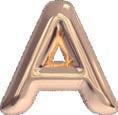


shul, such as a piece of fruit or a small yogurt, can prevent extreme hunger that later results in oversized portions.
Another challenge is social pressure and abundance. Large family gatherings often come with expectations to sample every dish or accept second servings as a sign of appreciation. Navigating this requires both tact and self-awareness. Politely accepting a small portion, or praising the food without consuming more than needed, helps balance respect for the host with personal health goals. Remembering that sampling a taste of each dish is sufficient can also ease the pressure to eat large portions of everything presented.
Finally, the issue of leftovers is common after two full days of cooking and entertaining. While it is practical to prepare generously, the abundance of food after yom tov can lead to several more days of overeating. A helpful approach is to divide leftovers into portions for freezing, or to repurpose them into lighter meals, such as turning brisket into a salad topping or using roasted vegetables for a soup. Sharing leftovers with family members or neighbors can also prevent overconsumption in the days that follow.



The meals are meant to be joyful and abundant, but abundance does not have to mean excess. By keeping nighttime meals lighter, emphasizing vegetables and lean proteins, limiting starches, choosing bread wisely, and being mindful with honey and desserts, Rosh Hashana can remain enjoyable without becoming overwhelming. Incorporating short daily walks, managing the challenges of irregular schedules and social expectations, and handling leftovers responsibly all contribute to a healthier and more balanced experience.
Approaching Rosh Hashana with intention allows one to focus on what the chag is truly about. When meals are balanced and thoughtful, they enhance rather than detract from the spiritual atmosphere.
Shana tova u’mesuka – wishing you a good, sweet, and healthy year ahead!
Aliza Beer is a registered dietitian with a master’s degree in nutrition. She has a private practice in Cedarhurst, NY. Patients’ success has been featured on the Dr. Oz show. Aliza can be reached at alizabeer@gmail. com, and you can follow her on Instagram at @alizabeer



Elazar Burr (Baltimore) & Esther Chaya Grosberg (Waterbury/Baltimore)
Yehoshua Hefter & Bracha Barber
Yisrael Meir Krug & Chaya Tova Kosoy
Yossi Green & Sivi Lazewnik
Yosef Braun (Baltimore) & Batsheva Schechter (Lakewood)
Want to see your simcha here? Email mazeltov@baltimorejewishhome.com or text 443-675-6507 to submit your simcha!
By Sara Rayvych, MSEd

The yomim noraim are a unique time. We are busy with physical preparations, such as food for meals and clothing for shul, yet it is a time for spiritual preparations and introspection. We are crowning the Ultimate King, standing for judgment while wiping dirty faces before they stain new white shirts.
Parents have the special avodah of raising the next generation of Klal Yisroel, yet our day is full of seemingly menial tasks. While most members of our nation will be in shul davening the unique tefillos of the day, others will be at home keeping toddlers from throwing things, giving babies naps and entertaining cranky preschoolers. It may not be popular to say, but it’s hard to feel spiritual when changing diapers. It’s easier to imbibe the atmosphere of the day when surrounded by the kehilla in shul than at home without a moment for even a quick Shemoneh Esrei.
It can be a struggle for parents to balance the kedusha of the day with the realities of parenting. Children’s needs don’t change for Rosh Hashana, and they don’t stop for Yom Kippur. It can also lead to feelings of frustration and guilt – frustration from our inability to experience the day with the proper frame of mind, and guilt from thinking we are not doing the correct thing.
Parenting, particularly with young
children, requires a mental shift. We need to move from the way we think it’s “supposed to be” to the way we can best serve Hashem now. Hopefully, we can use these precious years when our children are young to access a special area in our avodas Hashem.
We associate the yomim noraim with heartfelt tefillos, swaying in shul. We don’t imagine it sitting in a playground trying to keep our children from fighting over the swings. Yom Kippur is when we avoid food, not remind others to eat lunch before their nap.
Shofar blowing – meant to bring us to specific kavanos – becomes a chase to find a minyan and then davening that your child doesn’t scream during it. The kids’ needs don’t change, and we are running to stay on top of things. Often, yom tov may not feel much different from a regular Shabbos, only the seudos are later.
It’s the general challenge of parenting that we spend so much time on jobs that feel so menial. We change diapers, clean up spills – repeatedly – and try to get kids back into bed. None of these jobs sound glorious, nor spiritual.
A small change in perspective will not
solve all these challenges, but it will give us a better appreciation for our role. The next generation depends on us now, and we can’t abdicate our role for yom tov. The truth is that parenting is an ideal medium for spiritual growth. When properly appreciated, we can gain so much more out of the daily jobs we are already doing. We can transform a day of frustration into one of accomplishment.
A child’s view of the world, and ability to experience trust, love and security, come from the small acts we do each day. Each time we feed them, change them, listen to their troubles or tend to their continuous needs, we are slowly building their ability to feel safe in the world around them. We take this trust for granted, assuming it comes naturally, but it needs to be developed and nurtured. Children without this foundation will struggle, or be unable, to acquire it later in life.
These feelings of trust and security are crucial throughout our lifetime. They will affect every relationship and human interaction. For example, you can’t rely on a friend to help you if you can’t imagine that others care. Such a person will still be alone in a world of friends and family. These individuals will also find it challenging to connect to Hashem. Without a foundation of experiencing feelings of love and safety, a person can’t accept
that from their Creator.
Each task we do – big or small – is actively raising the next generation of humanity. We are building tomorrow with what we do today. Even the greatest of people started off as helpless babies. Our children, too, can accomplish greatness, but only if we raise them now. Klal Yisroel has, baruch Hashem, been passing on the mesorah for millennia. It’s our privilege to bring our heritage one generation further.
Each act we do, face we wipe, and child we soothe is building our own middos. We are becoming givers and greater individuals. We know how hard it is to improve even one middah – parenting is a treasure trove for personal character growth. We learn to control our frustrations, put the needs of others first and to speak gentler.
Parenting gives us a greater appreciation of Hashem’s love for us. As we gently and lovingly tend to each child’s needs, we can attain a greater understanding of how dependent we are on Hashem for everything and how much we are given. Obviously, we can never understand the divine, but we may get a better appreciation.
Hashem designed the world so that children need parents every day and that yomim noraim come each year. Clearly, the Divine Design included for parents
to be in this role for Rosh Hashana and Yom Kippur. These years are intended to be spent comforting little ones and nurturing their growth.
Shofar and Shul
Shofar is not only a unique mitzvah for the day, it also sets the tone. Even children too young to routinely attend shul will be brought to hear shofar. This provides the unique challenge of having to bring children to shul – and keep them quiet. This section is written predominantly with women in mind. While some of it may be helpful for the fathers, too, men have different halachic requirements. All halachic questions should be directed to the appropriate halachic authority.
Parents will benefit from having the schedule for more than one minyan so there is a backup. Many minyanim run late, and the listed shofar time is often not accurate. Some minyanim can start tekiyos more than an hour after the schedule lists. It’s inadvisable to keep a young child in shul that long, and we want to limit the amount of time we expect them to be quiet. Weather permitting, allow the kids to play outside or get their energy out in another healthy way, going inside just for
the actual tekiyos. It’s advisable to bring pacifiers, comforting blankets or anything that soothes that particular child. Children are calmer when close to their parents. Depending on their age, parents may want to wear an infant/toddler in a carrier or hold them in their arms. Slightly older children may want to be held next to the parent or kept very close by. Be mindful of your child’s nap and eating requirements. I highly advise parents to bring non-messy snacks
Many mothers will want to attend shul, and there are a few options. Neighbors may take turns watching each other’s children, permitting each of them time in shul. Some fathers are able to attend an earlier minyan, allowing their wife to go for part of the later minyan. Some families may want to arrange a babysitter. Please do not leave your child with anyone they do not know or feel comfortable with, especially when you will not be available by phone. Parents should be
We are building tomorrow with what we do today.
for the child to have during that time.
We have a neighbor who generously blew shofar for us when a child was sick or shul attendance was not possible. Many individuals can blow shofar privately, even if they wouldn’t normally do so for the kehilla. Parents may also benefit from second shofar blowings after the main minyan.
mindful of who they choose to watch their children. There have been far too many stories of children spending the holiest days of the year watching videos, coloring or doing other prohibited activities.
As in previous years, I look forward to the zechus of being home with a small,
cute child, going out just for shofar. For parents that have similar plans, it helps to have new books, toys and games for them to play with, especially for Yom Kippur. The new items do not need to be expensive; they just need to be entertaining. Try to avoid toys that are difficult to clean up. Have snacks and meals prepared in advance. While this is especially important for Yom Kippur, even on Rosh Hashana kids will need to have a mini meal as they wait for the late seudos.
There are many books that can help set the tone for the day. These can help stay-at-home parents feel the kedusha of the day. Ask a rav which tefillos to prioritize and have those bookmarked in your machzor. This makes it easier to “chap” some davening when you can.
I wish all of Klal Yisroel a year of bracha, simcha and nachas from their children. May we make these days meaningful for ourselves and our families.
Sara Rayvych, MSEd, has her master’s in general and special education. She has been homeschooling for over 10 years in Far Rockaway. She can be contacted at RayvychHomeschool@gmail.com.







































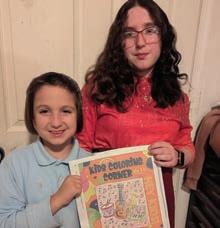

Note:




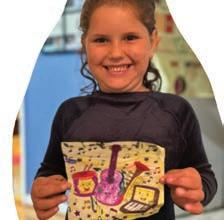




















Note: Not all submission have been published. Keep sending in your artwork for another chance to be featured!

Pareve I gluten-free option I freezes well I yield 8-10 servings
ingreDientS
>> 1 cup flour (or gluten-free flour)
>> 1 cup almond flour
>> ½ cup sugar
>> 1 tsp salt
>> 2/3 cup vegetable oil
>> 1 Tbsp water
Filling
>> 1 lb. strawberries, quartered (fresh or frozen)
>> 2 Tbsp sugar
>> 2 Tbsp flour
>> 1 tsp lemon juice
>> ¼ cup sliced almonds
>> Ground cinnamon, for sprinkling

PreParation
Preheat oven to 350°F. Line a 9- or 10-inch round or ceramic tart pan with parchment paper; coat the sides with nonstick cooking spray.
In a medium bowl, combine flour, almond flour, sugar, salt, oil, and water; mix well to form a dough. Reserve ½ cup for topping. Place remaining dough into prepared tart pan, pressing down and up the sides to form a crust.
To make the filling: In a second bowl, combine strawberries with sugar, flour, lemon juice, and almonds; mix well. Spoon into crust. Crumble reserved dough; sprinkle crumbs and cinnamon over filling.
Bake for 45-50 minutes, until golden.
Variation
PeaCh CriSPS
Prepare recipe as directed using 6 peaches, peeled and cut into chunks. You can use mini tart pans for a different presentation. Bake for 30-40 minutes. This recipe also works well in a rectangular tart pan.
These recipes have been excerpted from Variations. Simple and Delicious Dishes. Two Ways by Daniella Silver, published by Artscroll/Mesorah.




Stitches for a cut on the face (4 year old)
Annual well visit (12 year old)

Annual well visit with routine labs and ageappropriate screenings (mother)




Out-of-Pocket Costs: $350
Sick visit for pink eye + eye drops (12 year old)
Speech therapy evaluation (7 year old)
Out-of-Pocket Costs: $147


Allergist consultation (9 year old)
After hours strep test with Preferred Provider + antibiotics (7 year old)
Out-of-Pocket Costs: $296


visit with vaccines (4 year old)
Out-of-Pocket Costs: $0 AV
Out-of-Pocket Costs: $250
Speech therapy session (x2) (7 year old)
Orthopedist follow up appointment and cast removal (9 year old)
Out-of-Pocket Costs: $100


Speech therapy session (x2) (7 year old)
Annual well visit (7 year old)
Out-of-Pocket Costs: $50


Speech therapy session (x2) (7 year old)
After hours strep test with Preferred Provider (12 year old)
Out-of-Pocket Costs: $80





X-rays and cast for a broken arm (9 year old)
Speech therapy session (x2) (7 year old)
PreShare met, CoShare begins.
Out-of-Pocket Costs: $450

Annual women's health check up with ageappropriate screenings (mother)
Out-of-Pocket Costs: $0